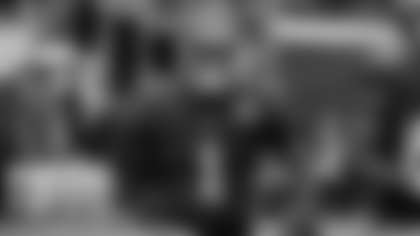1. Super Bowl XLII is the biggest upset in sports history.
John Schmeelk: Fiction -- Sorry, Giants fans. Super Bowl 42 might have been the greatest upset in NFL history, but nothing is going to top the Miracle on Ice at the 1980 Olympic Games in Lake Placid. The United States sent a bunch of inexperienced teenagers and college kids to play against the rugged and dominant Soviet national team that was considered the best in the world. Somehow, Team USA won in an upset. There is never going to be an upset in any professional sport that tops that.
I do think the Giants beating the undefeated Patriots was the greatest upset in NFL history, surpassing the Jets win over the Baltimore Colts in Super Bowl III. A bigger surprise than the Giants winning the game was that they held the Patriots, one of the best offenses in league history, to only 14 points. I don't blame Tom Brady for being incredulous when Plaxico Burress predicted the Patriots would score under 20 points. During the regular season, New England never scored fewer than 20 points and only scored fewer than 30 points four times. The Patriots put 38 points on the Giants defense just a month prior to close out the regular season. Even though Eli Manning won the MVP, it was the Giants defense than won Super Bowl 42.
Dan Salomone: Fact – I guess I'll be the homer here, which is ironic because I'm the only one of us not from New York or New Jersey. "Miracle on Ice" obviously had geopolitical implications and therefore meant more. But strictly talking sports, whistle to whistle, between the lines, sure, slaying the Patriots dynasty is the biggest upset in sports. The Giants were just the fourth team to start a season 0-2 and reach the Super Bowl. They were also the first team with a losing home record ever to make the Super Bowl and became the first NFC Wild Card team to win the Super Bowl. They were the third team to reach the Super Bowl by winning three road playoff games and set the NFL single-season record with 11 consecutive victories away from home.
Lance Medow: Fiction -- The Giants knocking off the Patriots and spoiling New England's perfect season was certainly an upset, but to say it's the biggest upset in sports history is hyperbole. While the Patriots were a dominant team throughout the regular season, they played several close games: four contests were decided by four points or less, including their Week 17 matchup with the Giants (38-35). That means a quarter of their season came down to the wire. On top of that, the NFL, unlike any other professional sports league, is defined by parity. In a one-game playoff structure, anything can happen because there's not a great disparity between most teams. When you consider the entire history of sports, Super Bowl XLII is in the conversation, but I'd put the 1980 "Miracle on Ice," N.C. State's win over Houston in the 1983 NCAA men's basketball national championship game, Buster Douglas knocking out Mike Tyson in 1990, and the eighth-seeded Denver Nuggets ousting the top seed Seattle Supersonics in the first round (five-game series) of the 1994 NBA playoffs are all ahead of the Giants' first of two victories over the Patriots in the span of five years on the NFL's biggest stage.
View iconic photos from the Giants' Super Bowl XLII victory over the undefeated Patriots.
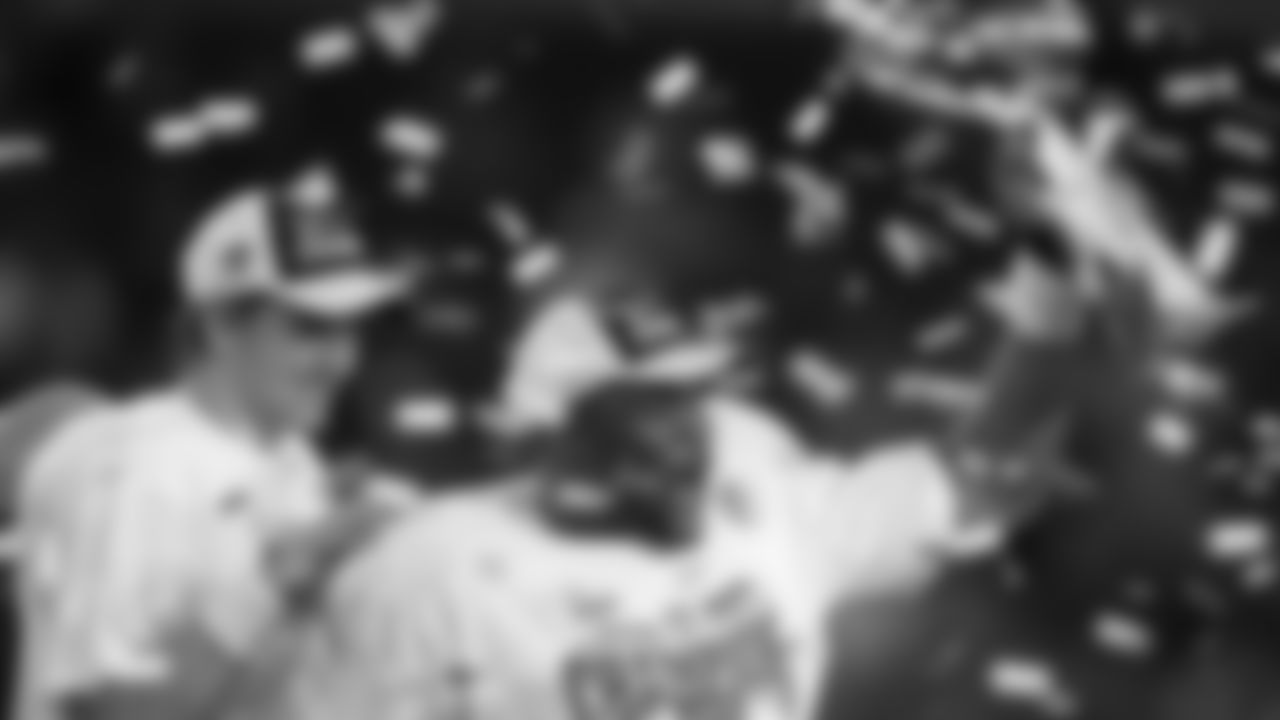
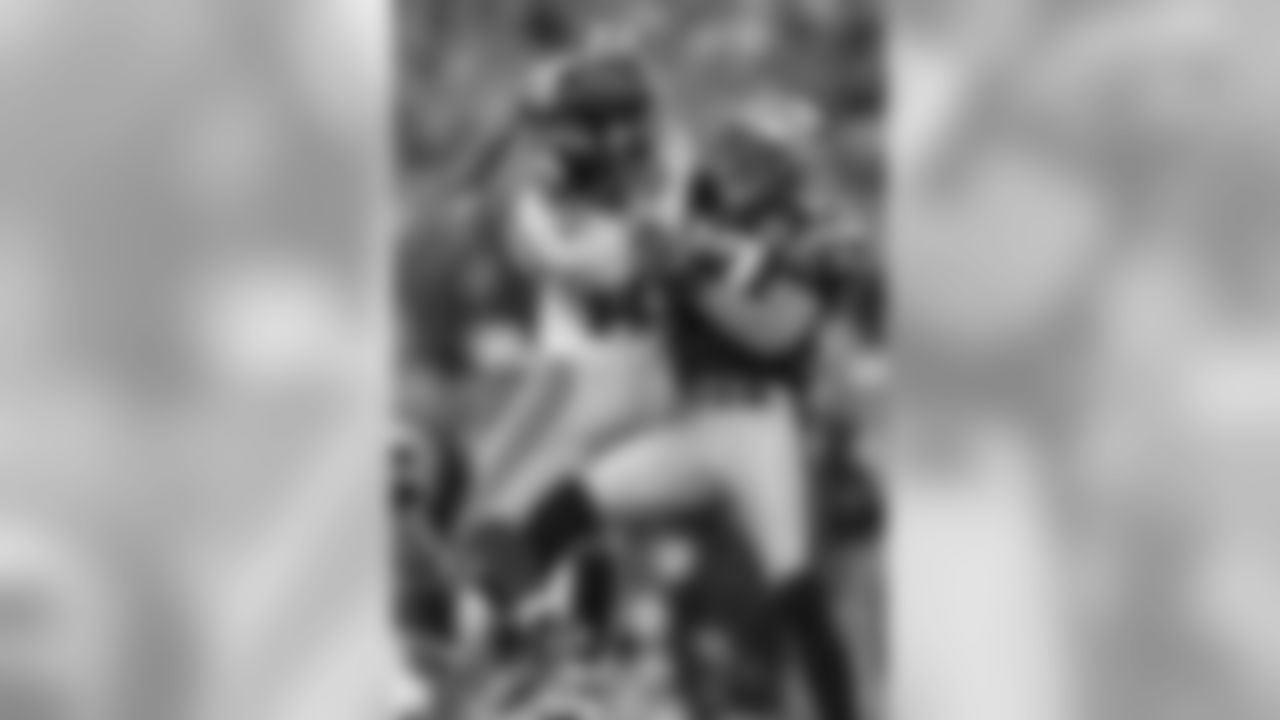
In this Feb. 3, 2008, file photo, the New York Giants receiver David Tyree (85) catches a 32-yard pass in the clutches of New England Patriots safety Rodney Harrison (37) during the fourth quarter of the Super Bowl XLII football game at the University of Phoenix Stadium on Sunday, Feb. 3, 2008 in Glendale, Ariz. The New England Patriots are back in the Super Bowl against the New York Giants, the team that ruined their perfect season in that game four years ago. They advanced with one of Tom Brady's worst games of the season and unheralded Sterling Moore's best. (AP Photo/Gene Puskar)
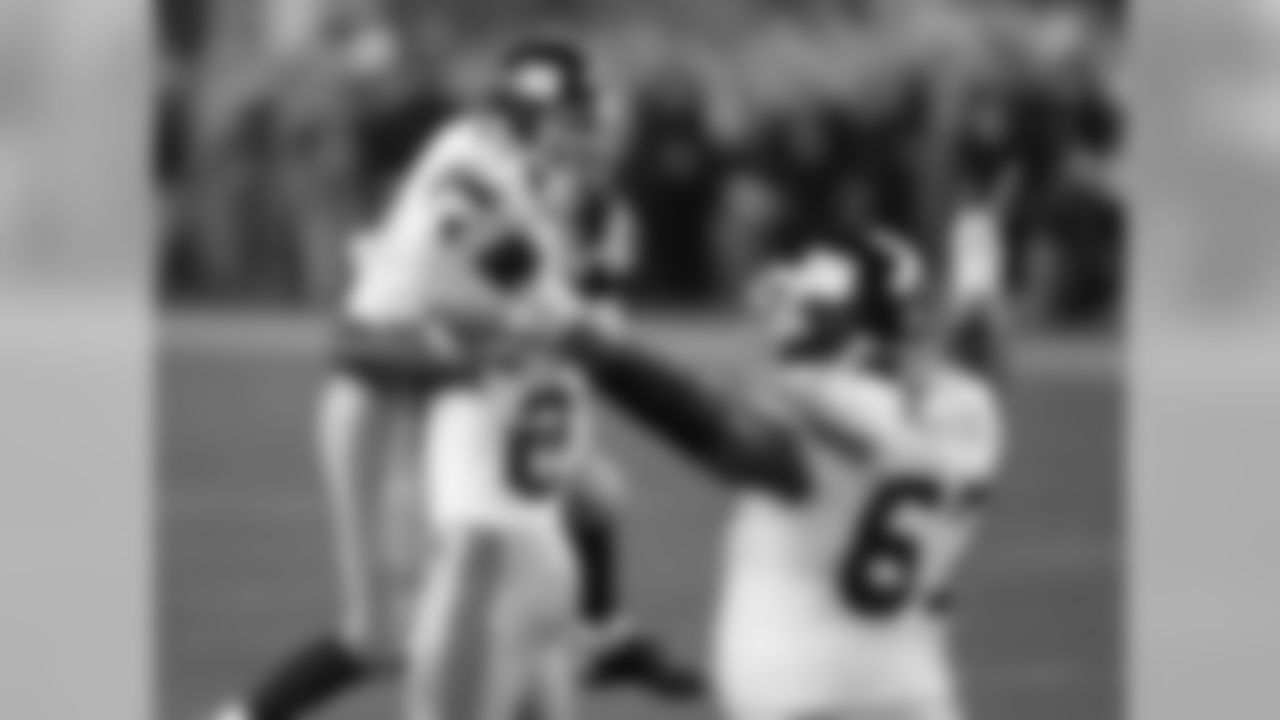
New York Giants' Eli Manning, left, leaps into the arms of Brandon Jacobs as Kareem McKenzie, right, raises his arms in celebration after the Giants scored against the New England Patriots in the final mometns of the Super Bowl XLII football game Sunday, Feb. 3, 2008 in Glendale, Ariz. The Giants won 17-14. (AP Photo/Elaine Thompson)
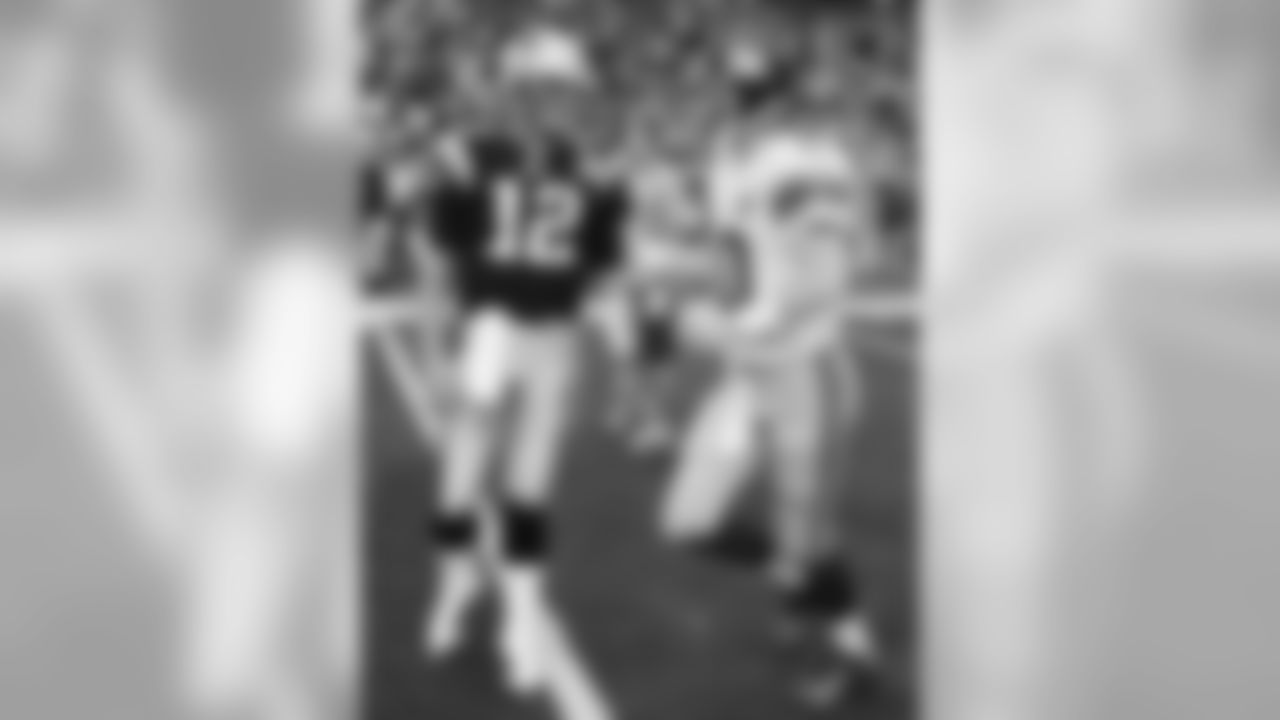
FILE - In this Feb. 3, 2008 file photo, New England Patriots quarterback Tom Brady (12) and New York Giants quarterback Eli Manning meet on he field before the Super Bowl XLII football game at University of Phoenix Stadium in Glendale, Ariz. Brady has three Super Bowl rings, with another taken away by Manning and the Giants in 2008. Both have their teams on course for a reprise of that memorable title game. (AP Photo/David J. Phillip, File)
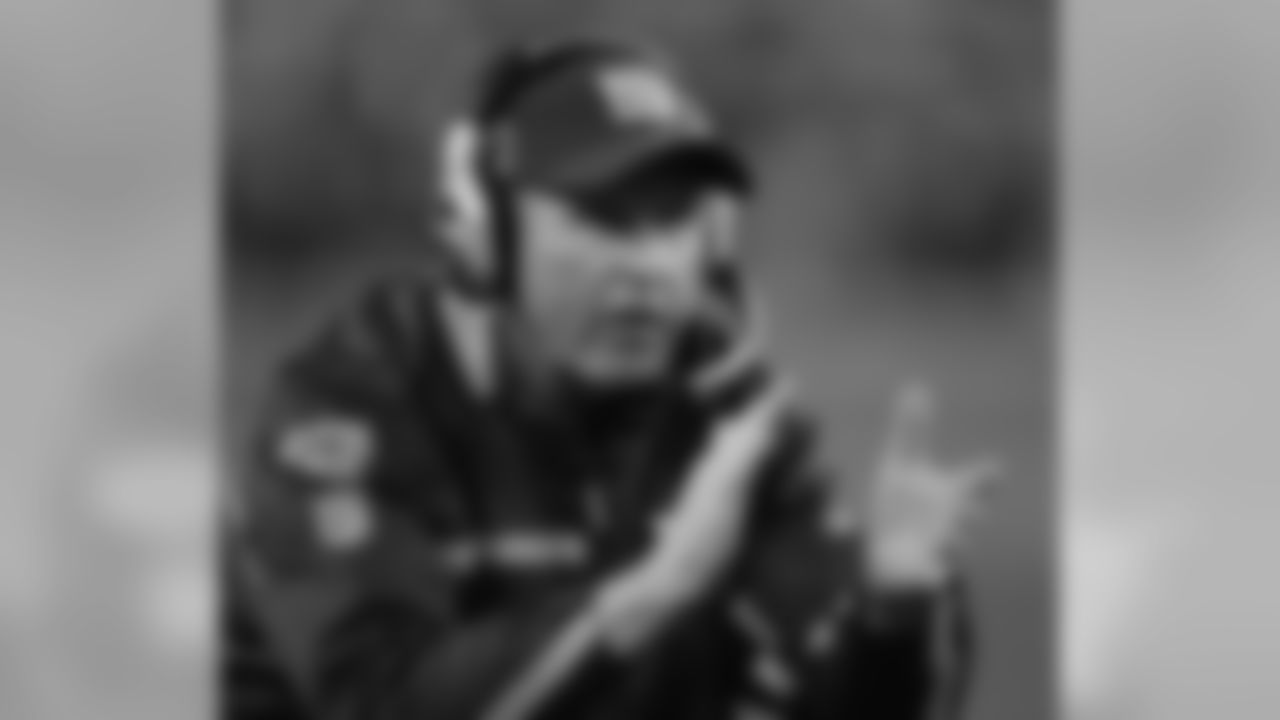
FILE New York Giants head coach Tom Coughlin encourages his team during the fourth quarter of the Super Bowl XLII football game against the New England Patriots at University of Phoenix Stadium in this Feb. 3, 2008 file photo in Glendale, Ariz. The Giants won 17-14. (AP Photo/Chris O'Meara, file)
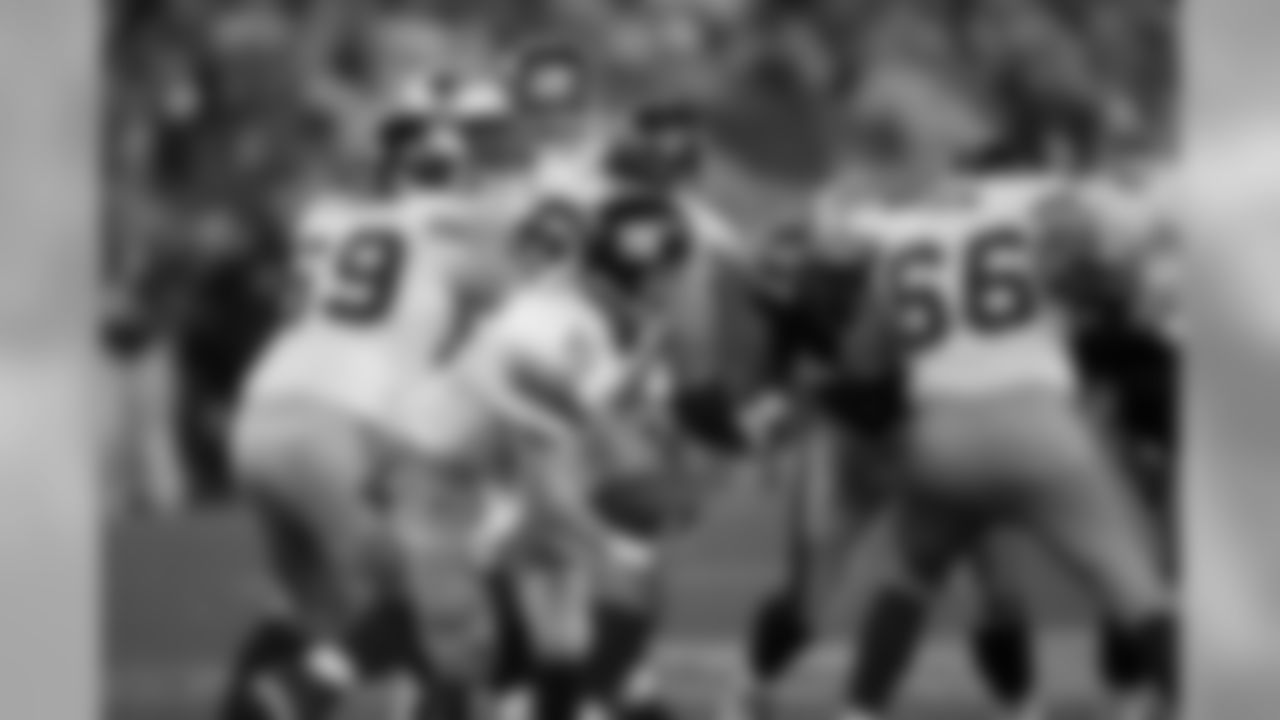
New York Giants QB Eli Manning #10 escapes pressure from the New England Patriots during the Super Bowl XLII football game at University of Phoenix Stadium on Sunday, Feb. 3, 2008 in Glendale, Ariz. Manning completed a miracle 32-yard pass to David Tyree on the play to set up their winning td. (AP Photo/Julie Jacobson)
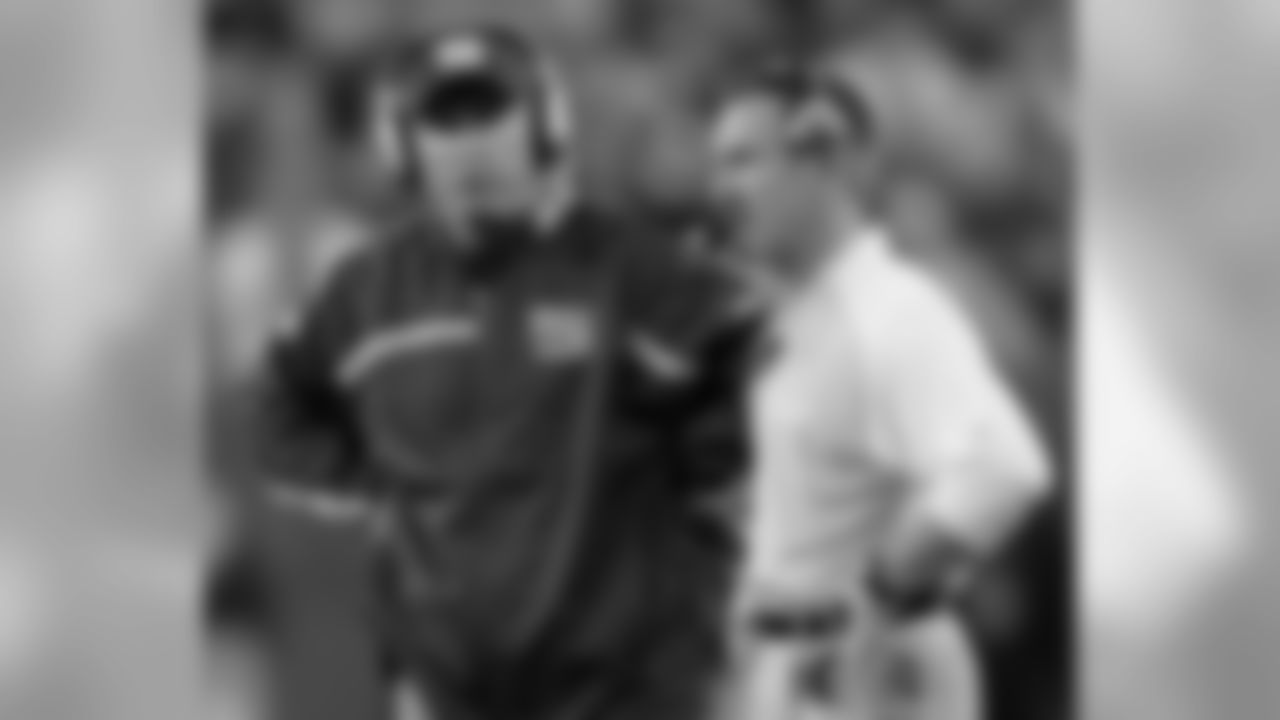
ADVANCE FOR SUNDAY, SEPT. 18 - FILE - In this Feb. 3, 2008, file photo, New York Giants head coach Tom Coughlin, left, and defensive coordinator Steve Spagnuolo talk on the sideline during the second quarter of the Super Bowl XLII football game against the New England Patriots in Glendale, Ariz. Since leaving the Giants two years ago to become the St. Louis Rams coach, Spagnuolo hasn't hesitated to seek advice from Coughlin. (AP Photo/Eric Gay, File)
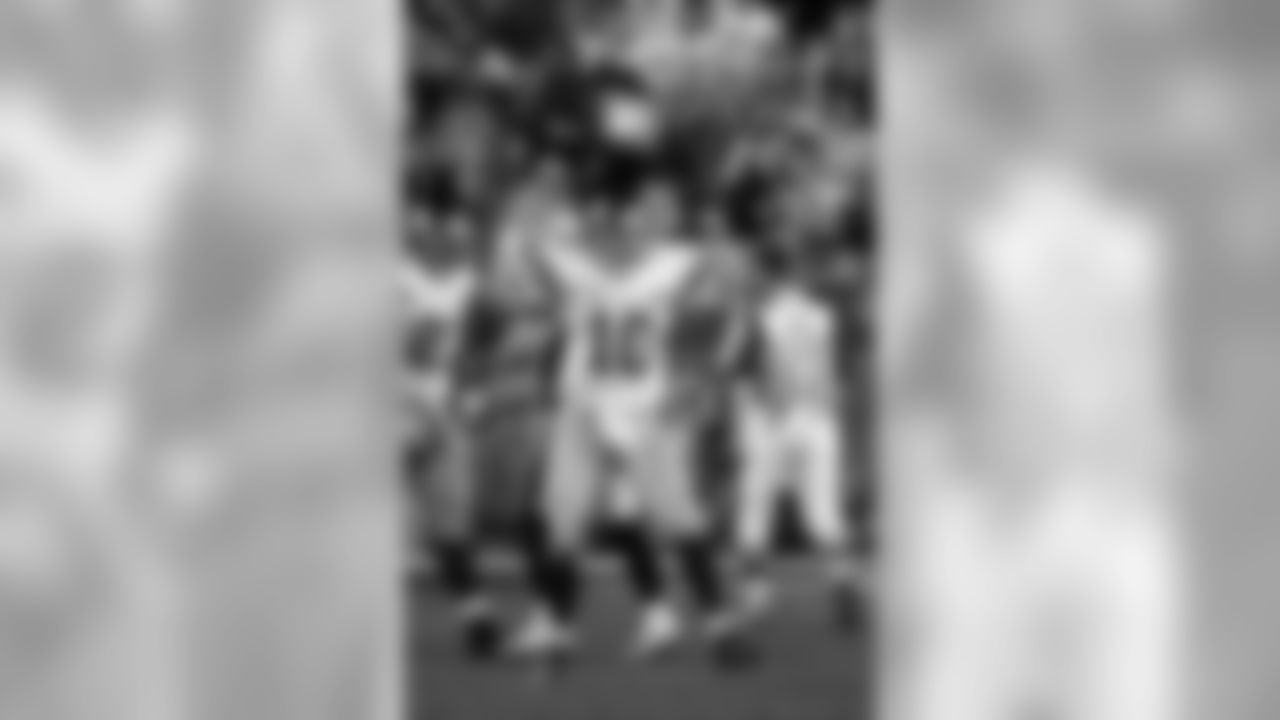
New York Giants QB Eli Manning #10 during the Super Bowl XLII football game against the New England Patriots at University of Phoenix Stadium on Sunday, Feb. 3, 2008 in Glendale, Ariz. (AP Photo/Julie Jacobson)
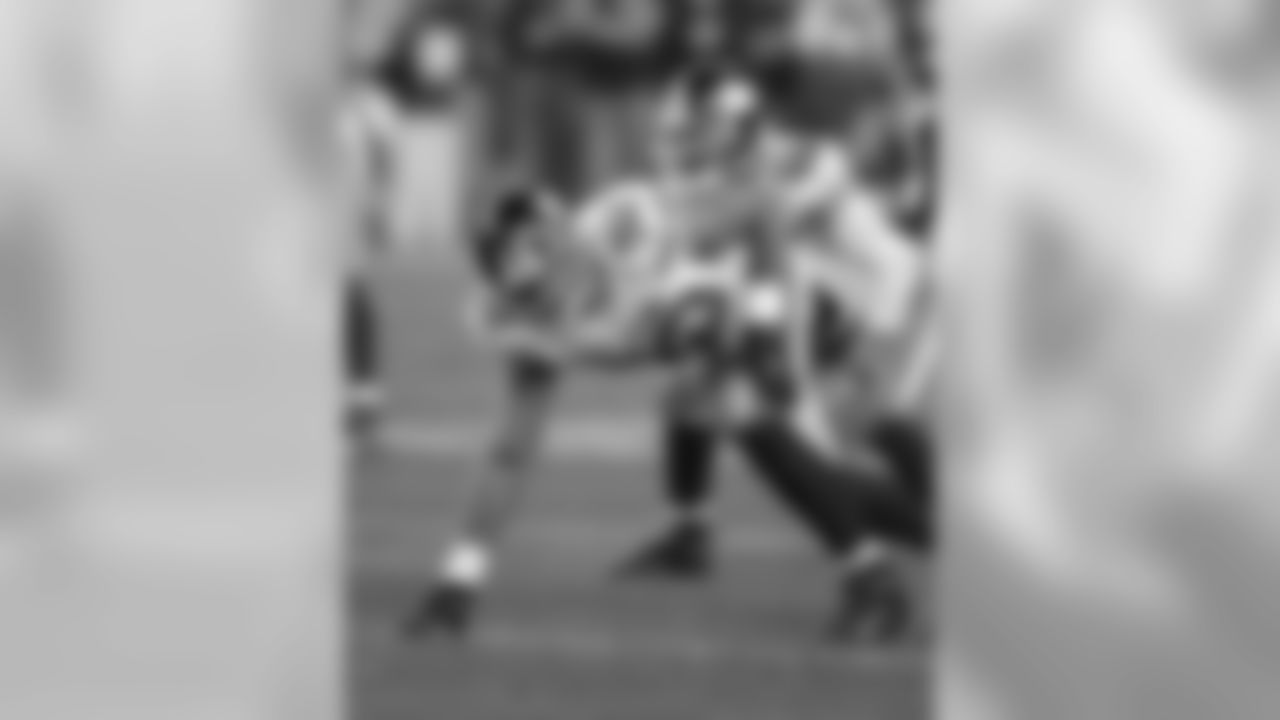
Defensive end Michael Strahan #92 of the New York Giants gets set for the snap of the ball by the New England Patriots during Super Bowl XLII at the University of Phoenix Stadium on February 3, 2008 in Glendale, Arizona. The Giants defeated the Patriots 17-14. (AP Photo/Paul Spinelli)
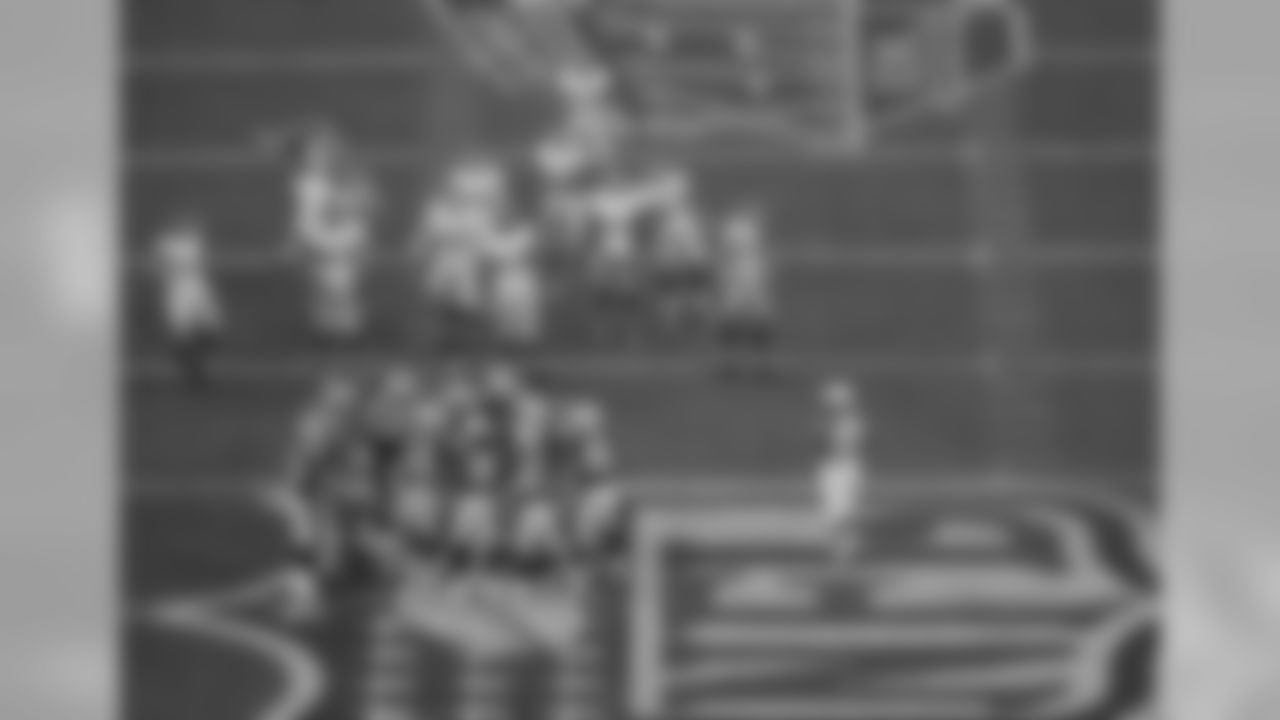
FILE - In this Feb. 3, 2008, file photo, New England Patriots players and the New York Giants players take the field during the second quarter of the Super Bowl XLII football game at University of Phoenix Stadium in Glendale, Ariz. University of Phoenix Stadium, home of the Arizona Cardinals, has the best grass field in the NFL, according to the latest survey by the players union. (AP Photo/Charlie Riedel, File)
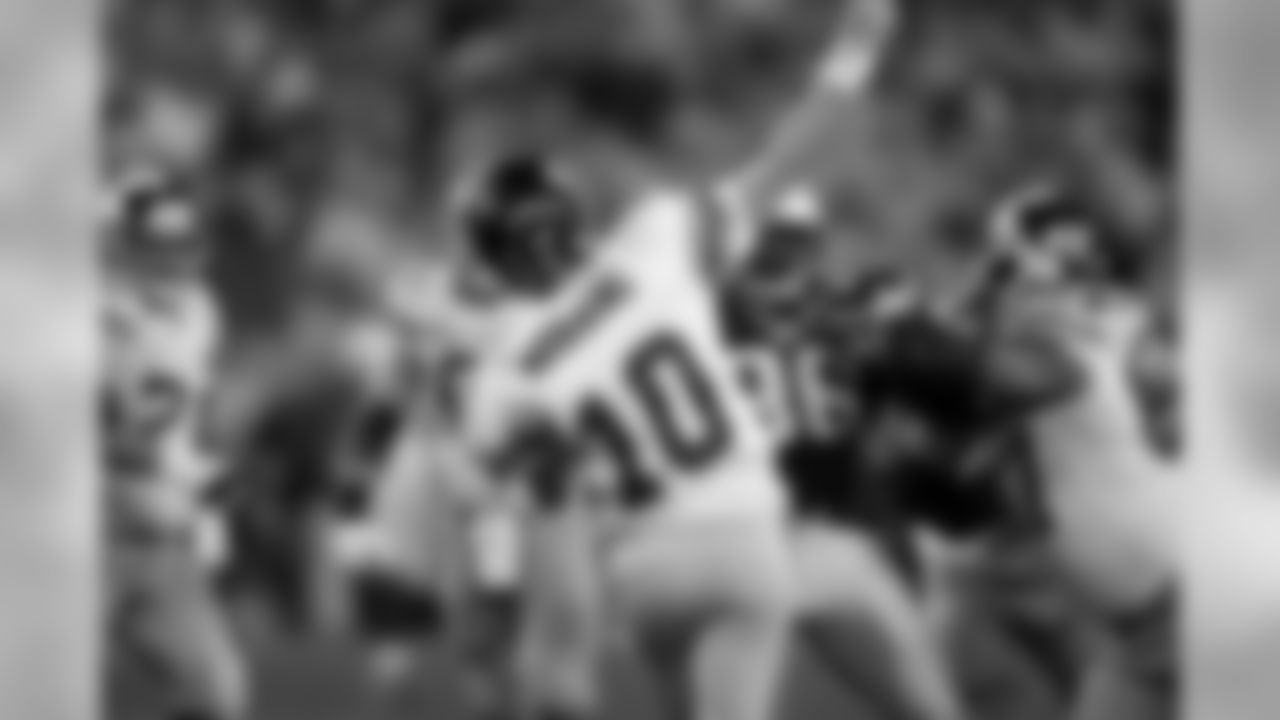
New York Giants QB Eli Manning #10 throws a pass downfield against the New England Patriots during the Super Bowl XLII football game at University of Phoenix Stadium on Sunday, Feb. 3, 2008 in Glendale, Ariz. Manning completed a miracle 32-yard pass to David Tyree on the play to set up their winning td. (AP Photo/Julie Jacobson)
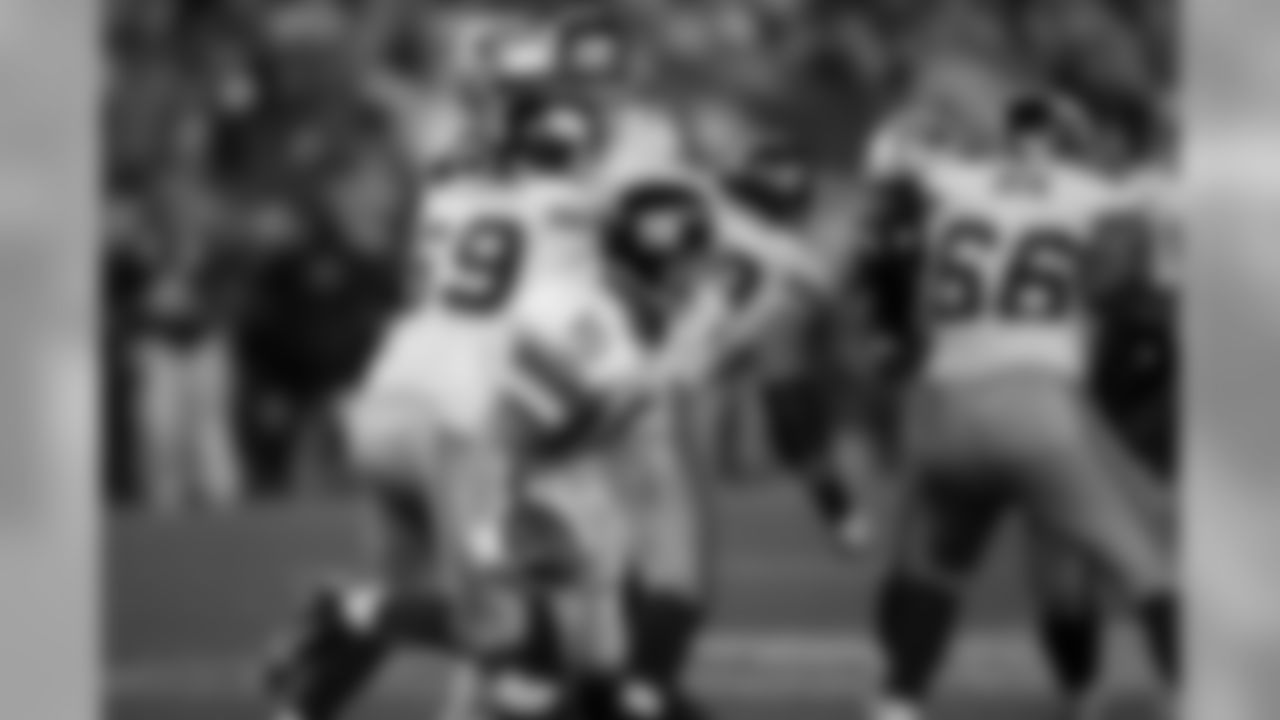
New York Giants QB Eli Manning #10 escapes pressure from the New England Patriots during the Super Bowl XLII football game at University of Phoenix Stadium on Sunday, Feb. 3, 2008 in Glendale, Ariz. Manning completed a miracle 32-yard pass to David Tyree on the play to set up their winning td. (AP Photo/Julie Jacobson)
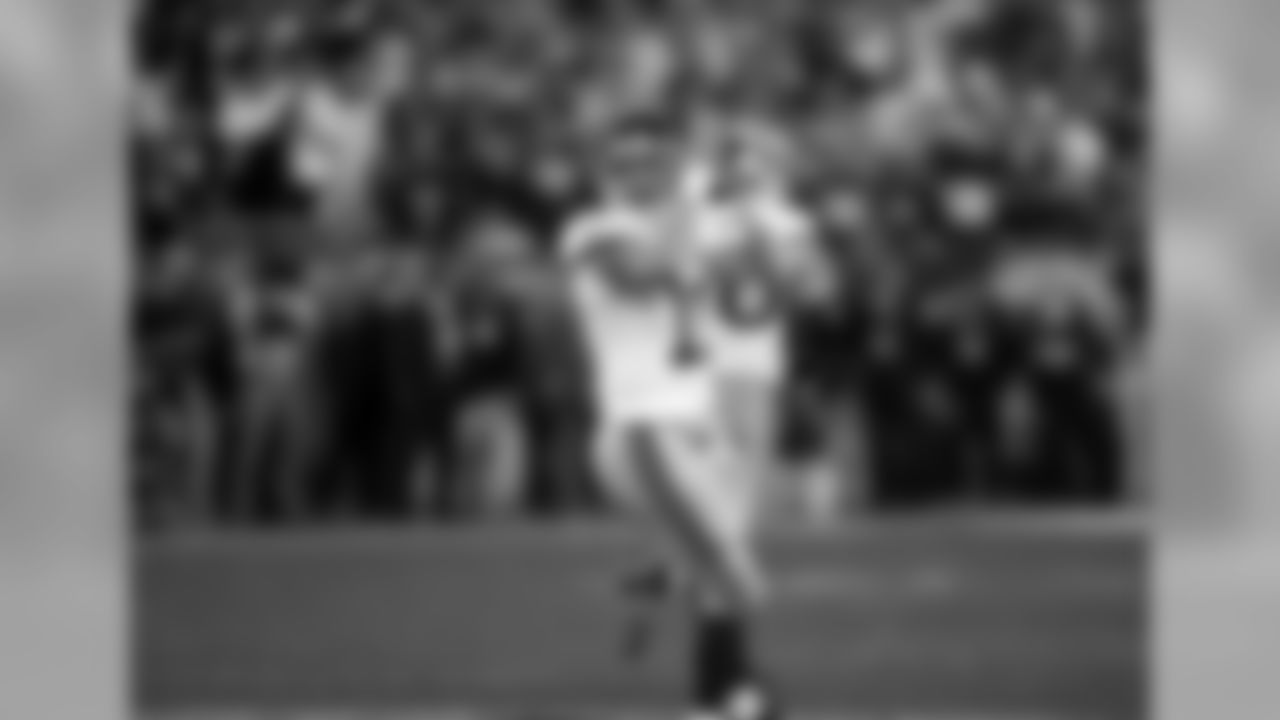
New York Giants QB Eli Manning #10 calls a timeout immediately after completing a pass downfield against the New England Patriots during the Super Bowl XLII football game at University of Phoenix Stadium on Sunday, Feb. 3, 2008 in Glendale, Ariz. Manning completed a miracle 32-yard pass to David Tyree on the play to set up their winning td. (AP Photo/Julie Jacobson)
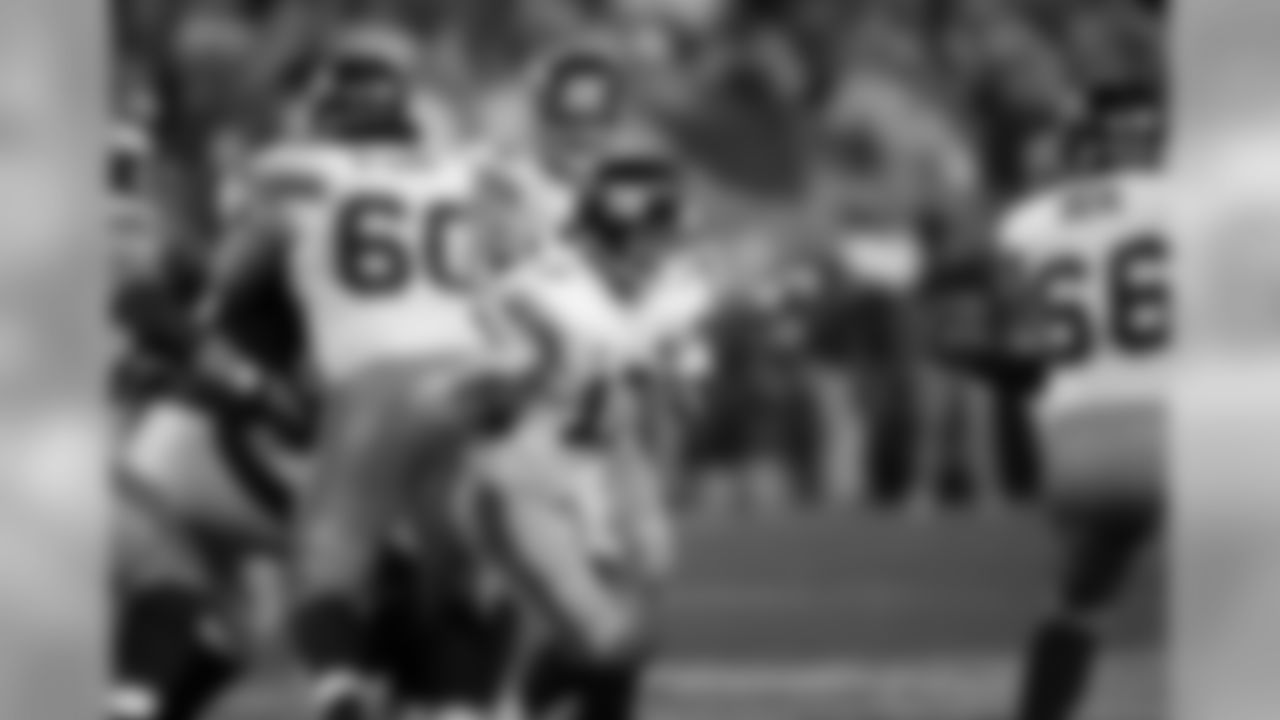
New York Giants QB Eli Manning #10 escapes pressure from the New England Patriots during the Super Bowl XLII football game at University of Phoenix Stadium on Sunday, Feb. 3, 2008 in Glendale, Ariz. Manning completed a miracle 32-yard pass to David Tyree on the play to set up their winning td. (AP Photo/Julie Jacobson)
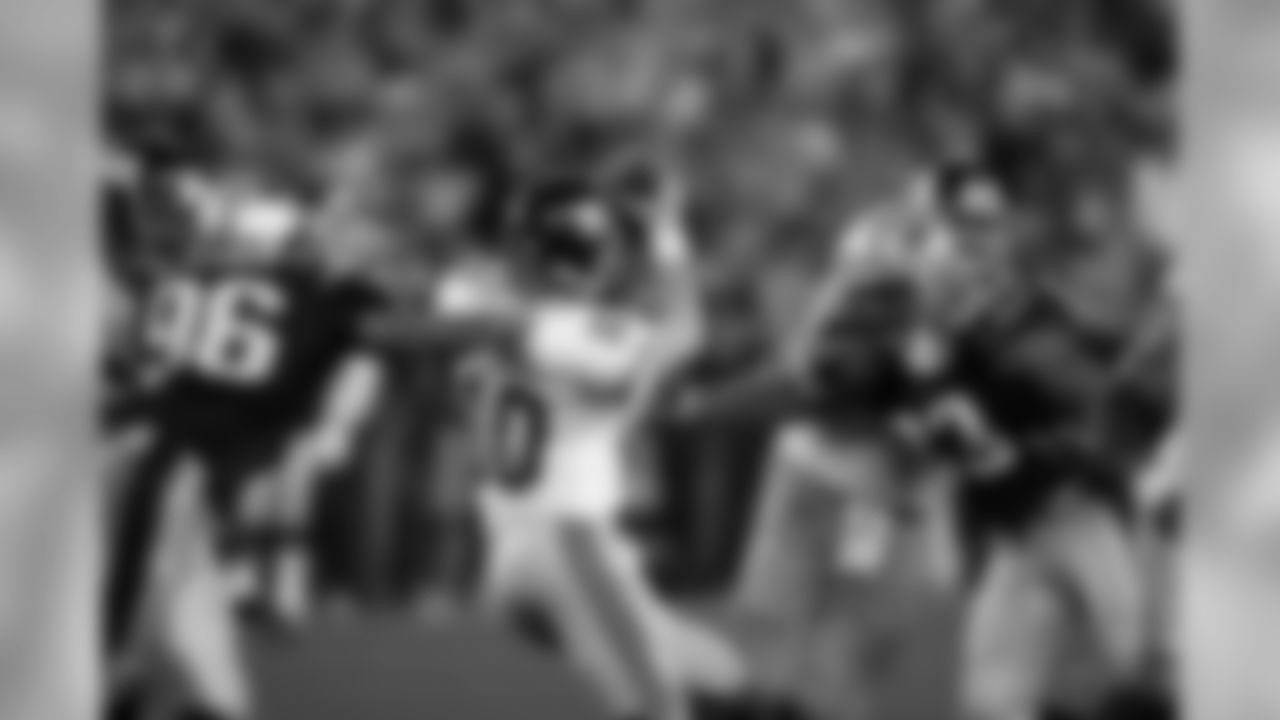
New York Giants QB Eli Manning #10 escapes pressure from the New England Patriots during the Super Bowl XLII football game at University of Phoenix Stadium on Sunday, Feb. 3, 2008 in Glendale, Ariz. Manning completed a miracle 32-yard pass to David Tyree on the play to set up their winning td. (AP Photo/Julie Jacobson)
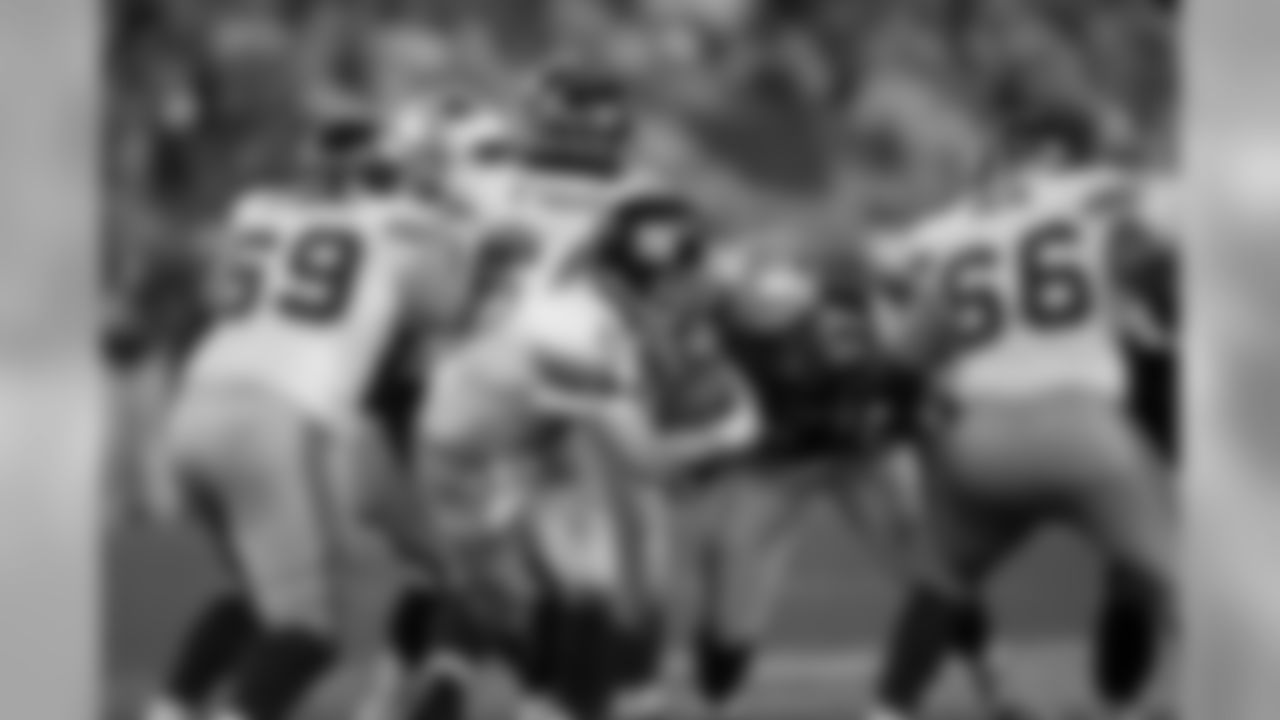
New York Giants QB Eli Manning #10 escapes pressure from the New England Patriots during the Super Bowl XLII football game at University of Phoenix Stadium on Sunday, Feb. 3, 2008 in Glendale, Ariz. Manning completed a miracle 32-yard pass to David Tyree on the play to set up their winning td. (AP Photo/Julie Jacobson)
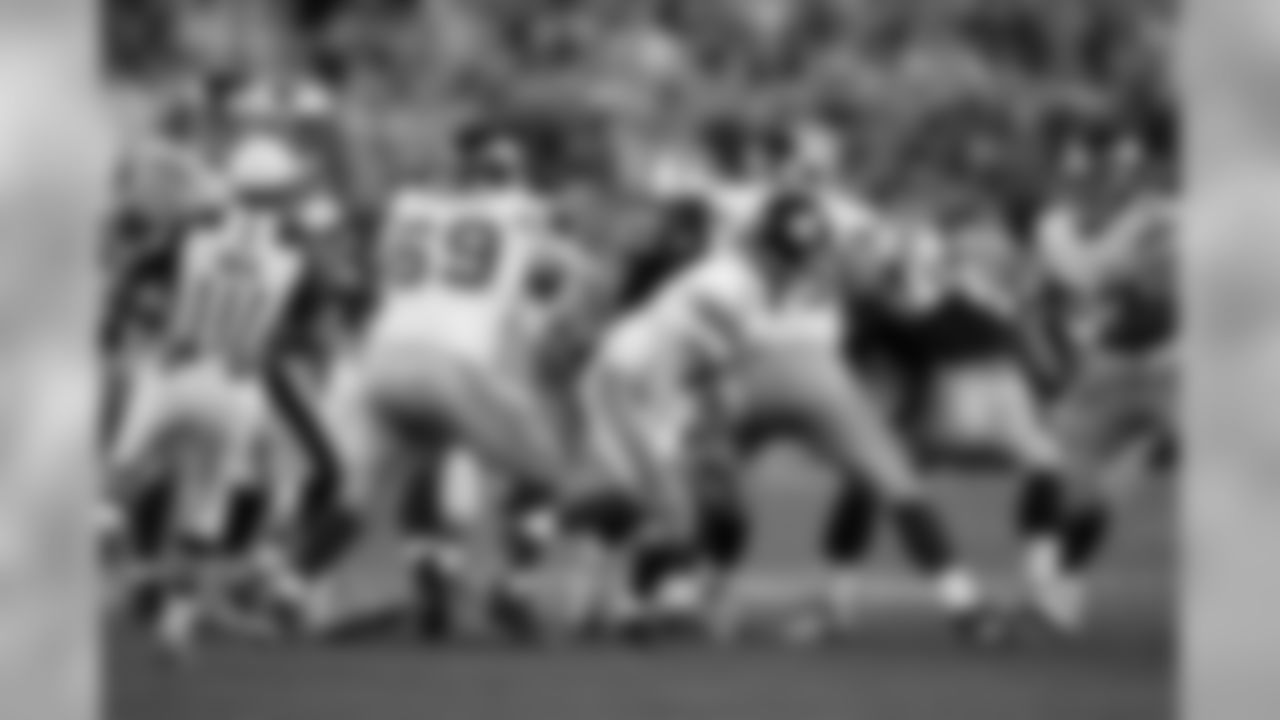
New York Giants QB Eli Manning #10 escapes pressure from the New England Patriots during the Super Bowl XLII football game at University of Phoenix Stadium on Sunday, Feb. 3, 2008 in Glendale, Ariz. Manning completed a miracle 32-yard pass to David Tyree on the play to set up their winning td. (AP Photo/Eric Gay)
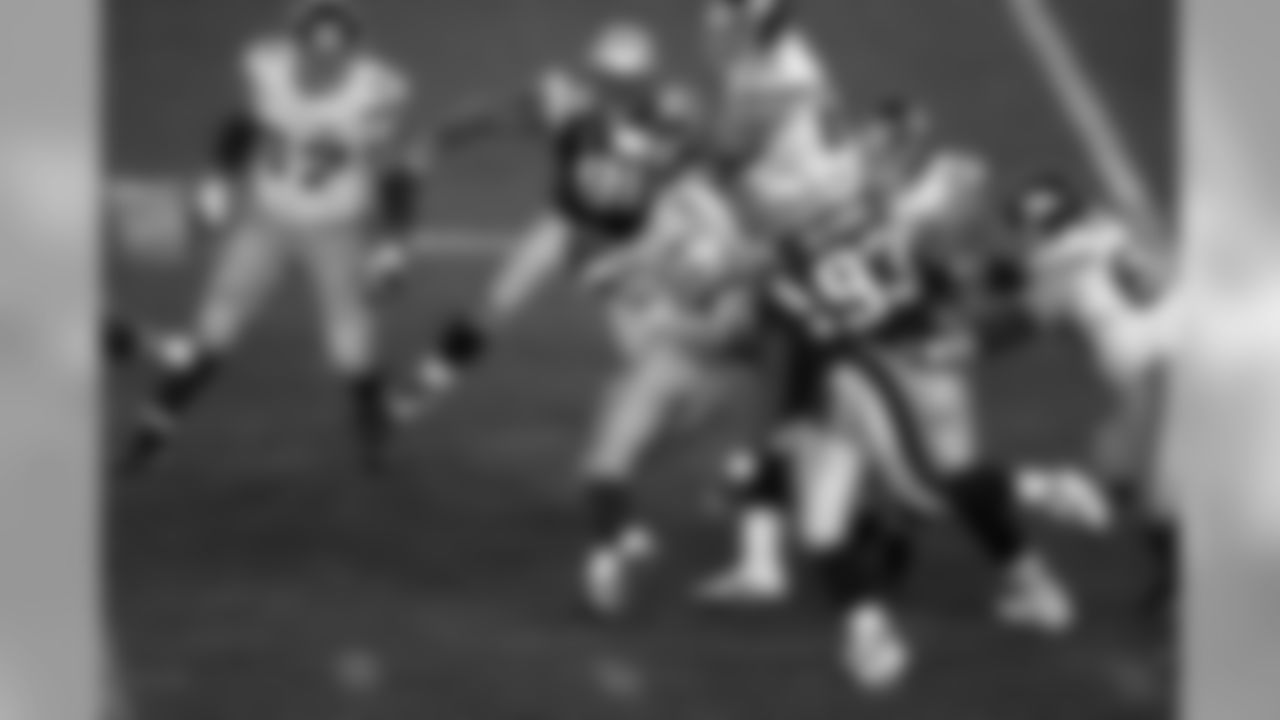
New York Giants QB Eli Manning #10 evades pressure against the New England Patriots during the Super Bowl XLII football game at University of Phoenix Stadium on Sunday, Feb. 3, 2008 in Glendale, Ariz. Manning escaped pressure and completed a 32-yard miracle pass to David Tyree on the play, setting up the Giants winning TD. (AP Photo/Charlie Riedel)

New York Giants defensive end Osi Umenyiora holds the Vince Lombardi trophy after the Giants beat the New England Patriots 17-14 to win the Super Bowl XLII football game in Glendale, Ariz, on Sunday, Feb. 3, 2008. (AP Photo/Charlie Riedel)

FILE In this Feb. 3, 2008 file photo, New York Giants quarterback Eli Manning, center, holds the Vince Lombardi Trophy as he celebrates with his coach Tom Coughlin, right, after the Giants beat the New England Patriots 17-14 in the Super Bowl XLII football game in Glendale, Ariz. David Archuleta and David Cook are no professional athletes, but one of them will be celebrating like one on the "American Idol" finale on Wednesday, May 21, 2008. The next "Idol" champ will shout "I'm going to Disney World!" during the celebration immediately following the announcement, the first time those famous promotional words were uttered anywhere but a court or playing field. For more than two decades, Super Bowl, World Series and NBA Finals champs have made the pronouncement as the crowd cheers and confetti flies. (AP Photo/David J. Phillip, file)
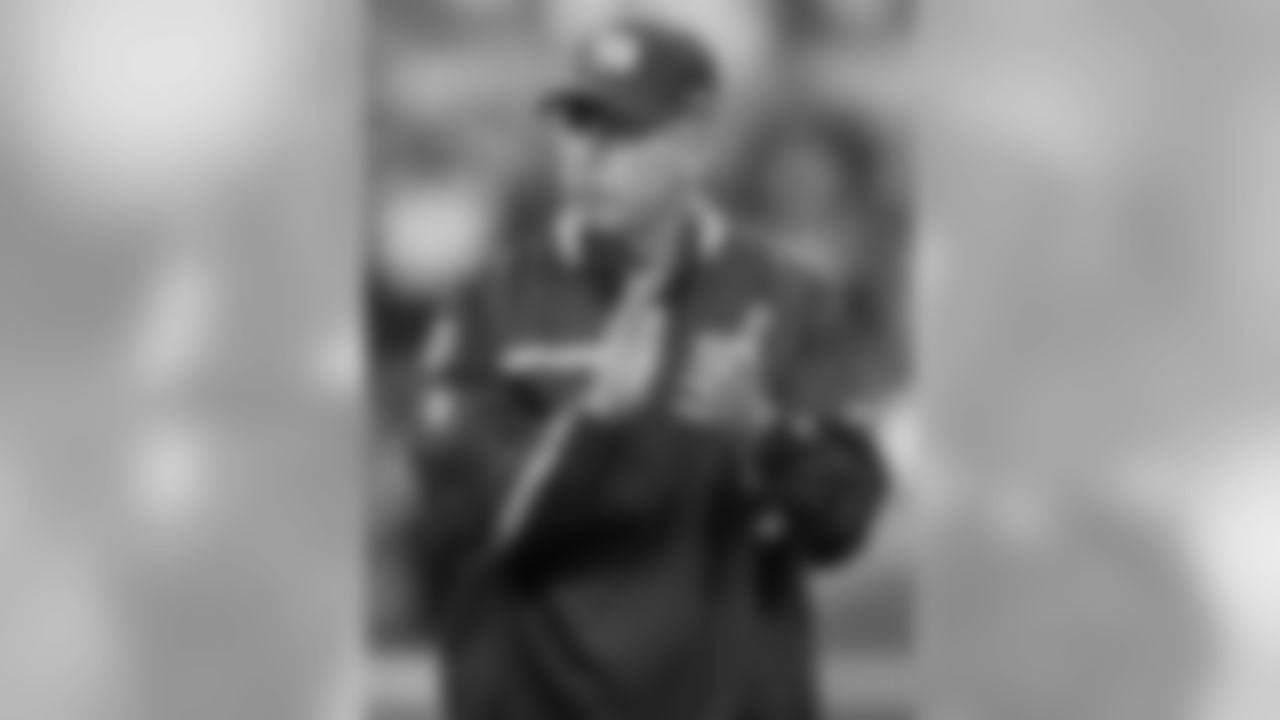
FILE New York Giants head coach Tom Coughlin cheers on his team during pre-game warm-ups before the Super Bowl XLII football game against the New England Patriots at University of Phoenix Stadium in this Feb. 3, 2008 file photo, in Glendale, Ariz. The Giants won 17-14. (AP Photo/David J. Phillip, file)
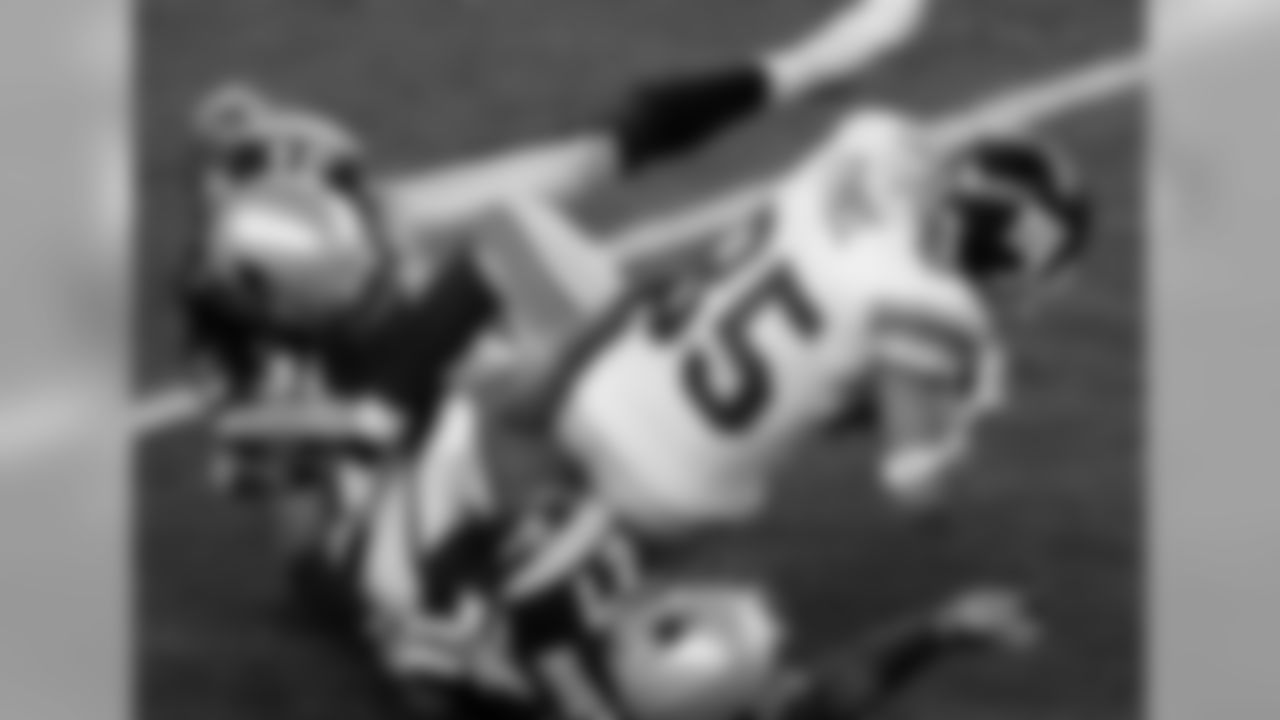
New York Giants wide receiver David Tyree (85) is pulled down by New England Patriots safety Brandon Meriweather (31) and cornerback Ellis Hobbs III (27) during the Super Bowl XLII football game against the New York Giants at University of Phoenix Stadium on Sunday, Feb. 3, 2008 in Glendale, Ariz. (AP Photo/Charlie Riedel)
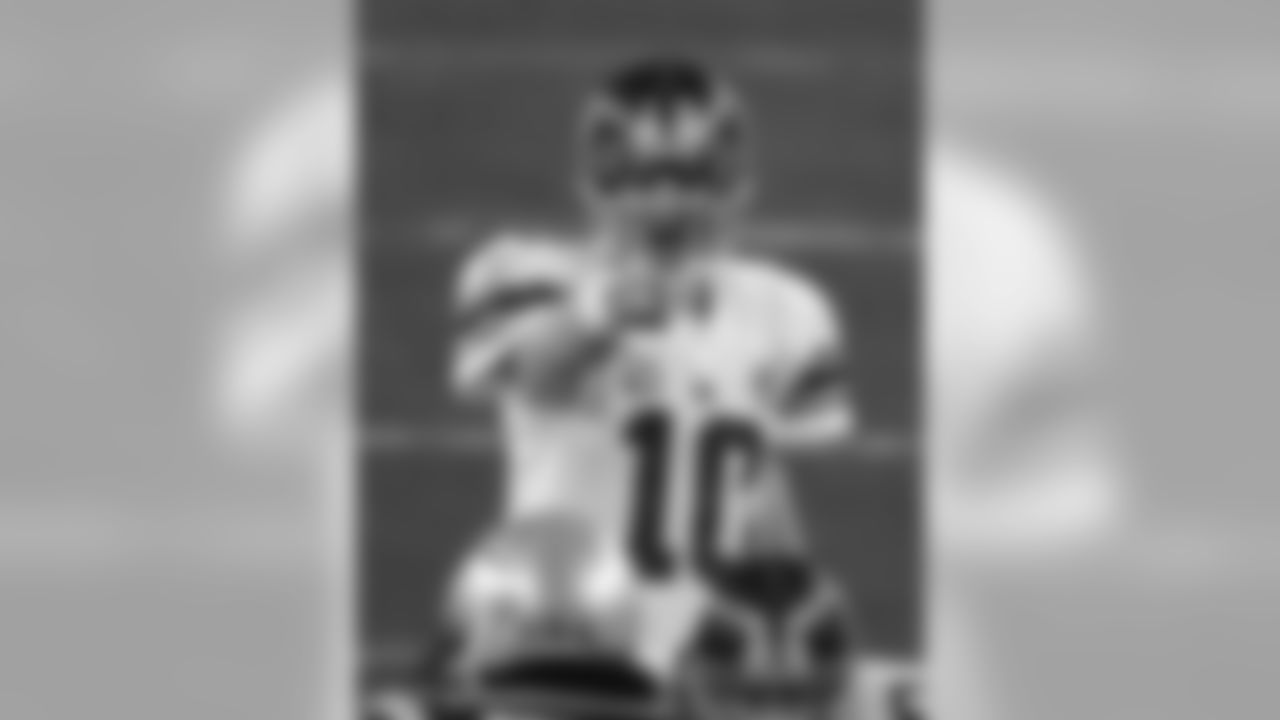
New York Giants quarterback Eli Manning points during the second quarter of the Giants' 17-14 win over the New England Patriots in the Super Bowl XLII football game at University of Phoenix Stadium on Sunday, Feb. 3, 2008, in Glendale, Ariz. (AP Photo/Ross D. Franklin)
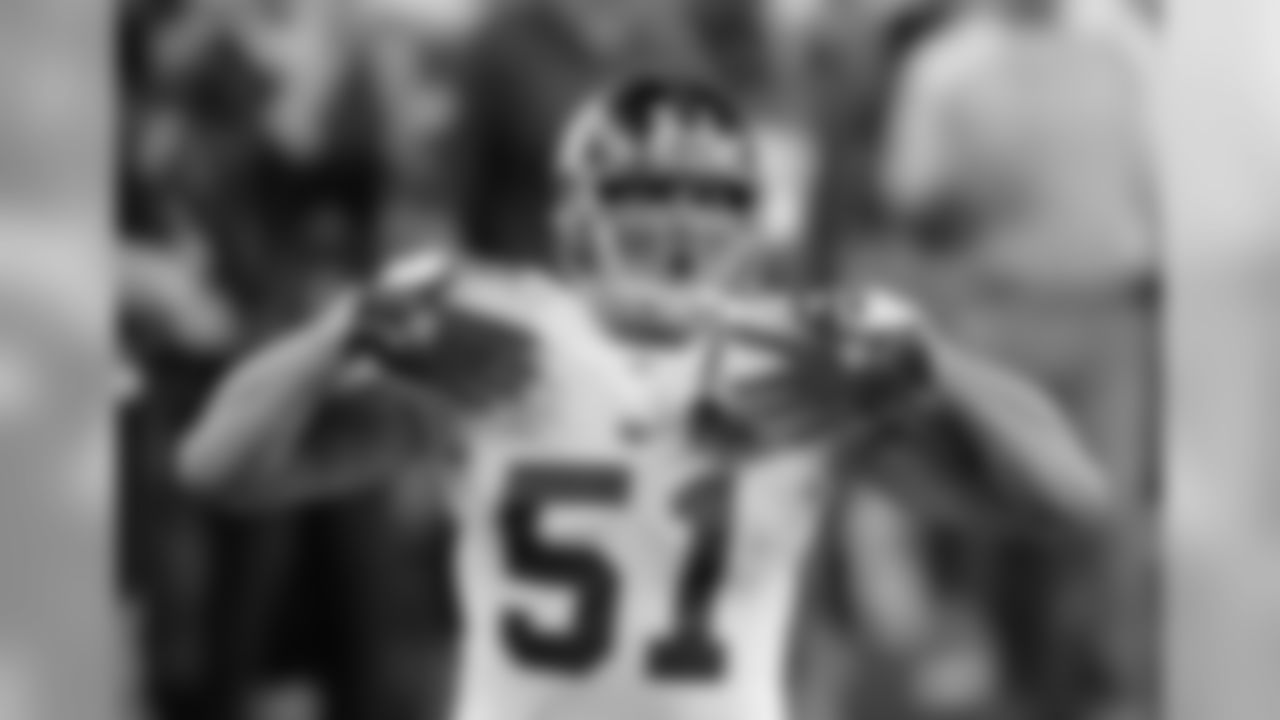
New York Giants Zak DeOssie reacts after a play against New England Patriots during the fourth quarter of the Super Bowl XLII football game Sunday, Feb. 3, 2008 in Glendale, Ariz. The Giants won 17-14. (AP Photo/Elaine Thompson)
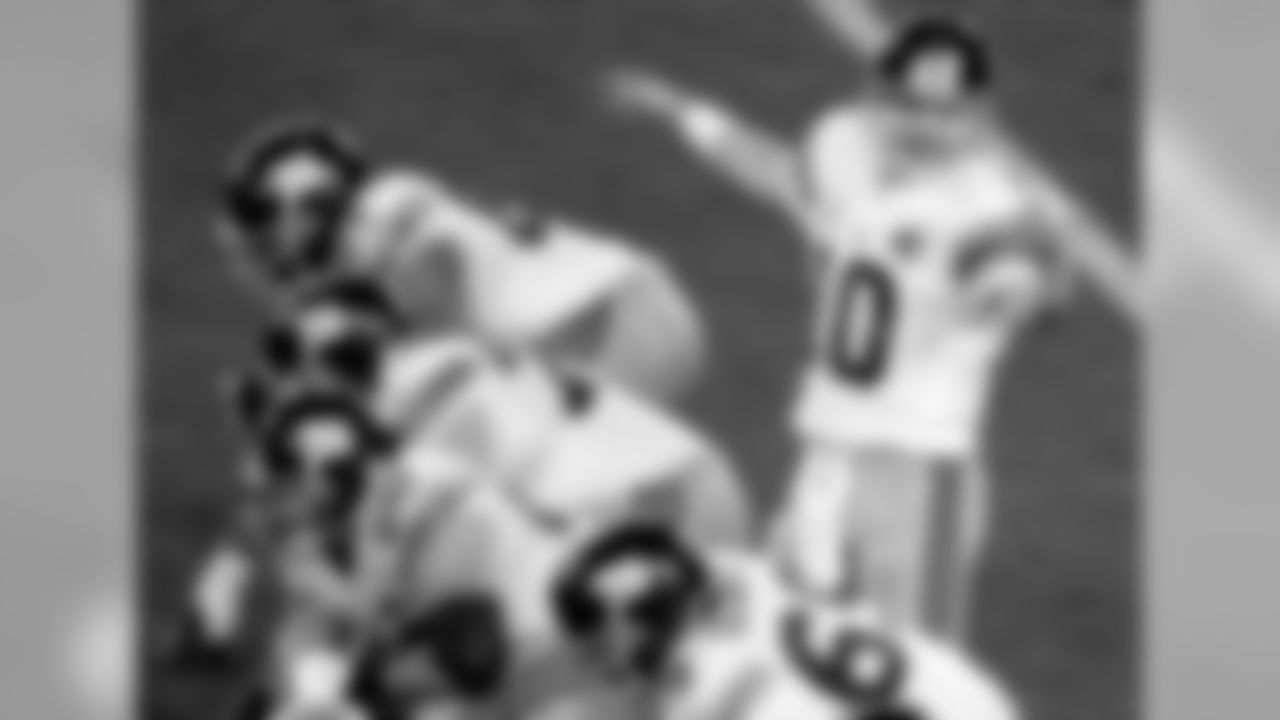
New York Giants quarterback Eli Manning calls a play during the Super Bowl XLII football game against the New England Patriots at University of Phoenix Stadium on Sunday, Feb. 3, 2008 in Glendale, Ariz. (AP Photo/Charlie Riedel)
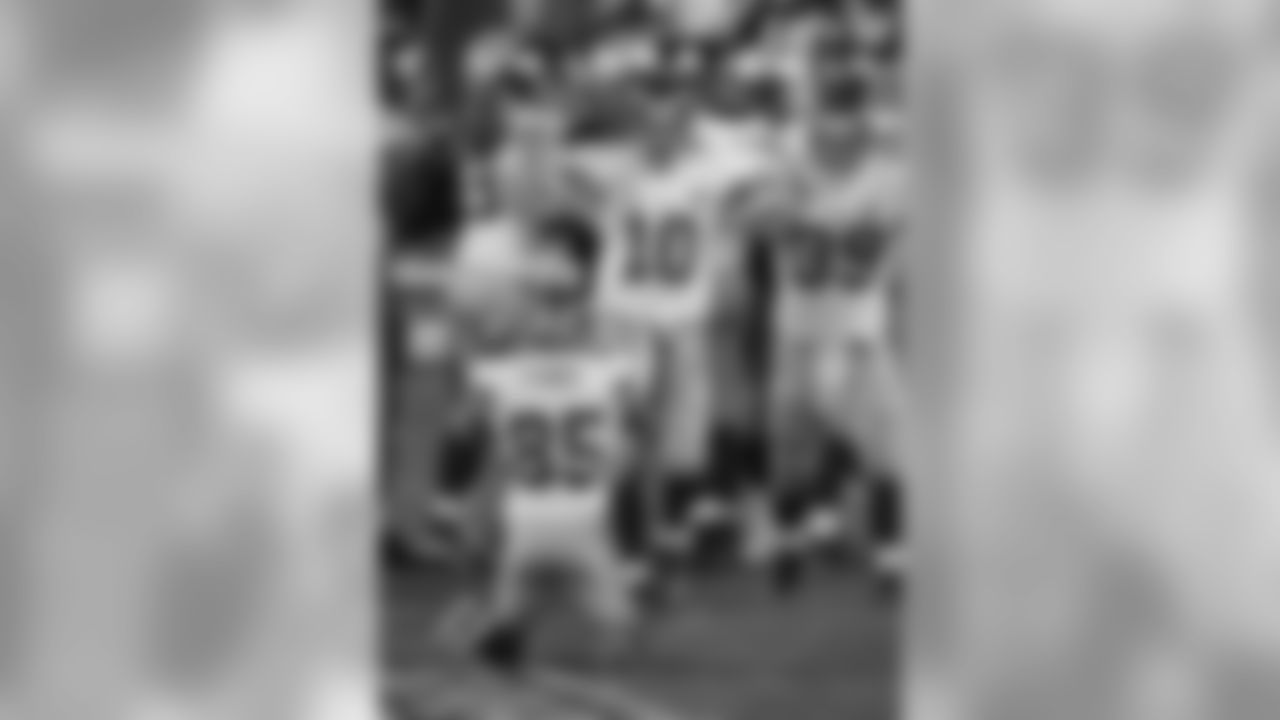
New York Giants quarterback Eli Manning (10) and receiver David Tyree (85) celebrate the Giants' 17-14 win over the New England Patriots in the Super Bowl XLII football game at University of Phoenix Stadium on Sunday, Feb. 3, 2008, in Glendale, Ariz. (AP Photo/Matt York)

The Vince Lombardi Super Bowl trophy is blurred by a slow camera shutter speed while on display at the Phoenix Convention Center Friday, Feb. 1, 2008, in Phoenix. The New England Patriots play the New York Giants in Super Bowl XLII on Sunday, Feb. 3. (AP Photo/Morry Gash)
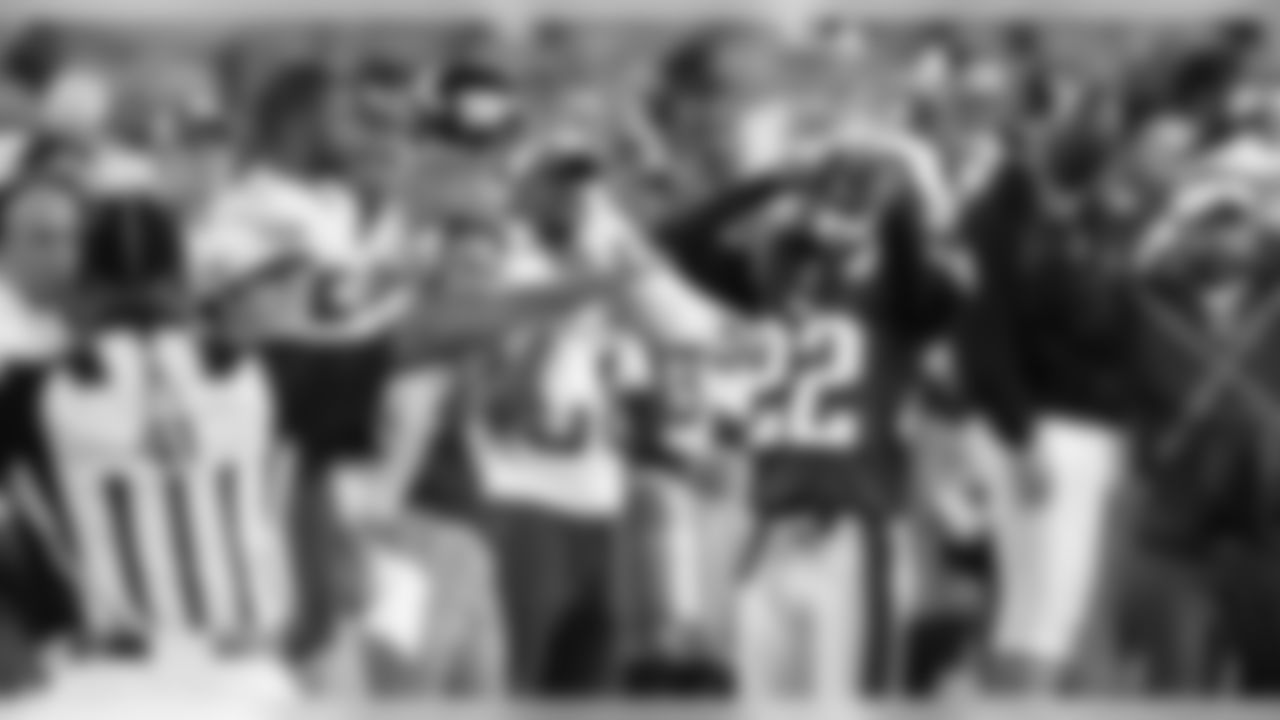
New England Patriots' Asante Samuel reacts to missing a fourth quarter interception against the New York Giants during the Super Bowl XLII football game Sunday, Feb. 3, 2008 in Glendale, Ariz. The Giants won 17-14. (AP Photo/Elaine Thompson)
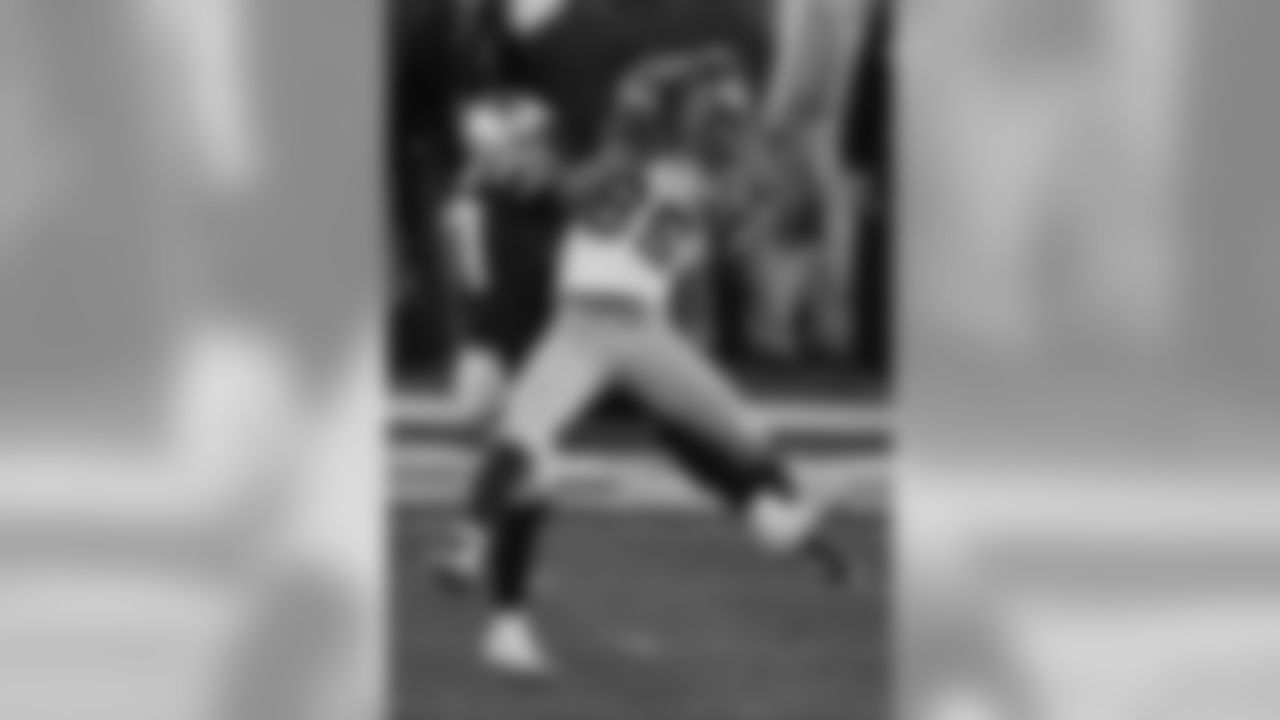
New York Giants receiver David Tyree (85) catches a complete pass as New England Patriots safety Rodney Harrison (37) tries to break up the play in the fourth quarter during the Super Bowl XLII football game at University of Phoenix Stadium on Sunday, Feb. 3, 2008 in Glendale, Ariz. (AP Photo/Ross D. Franklin)
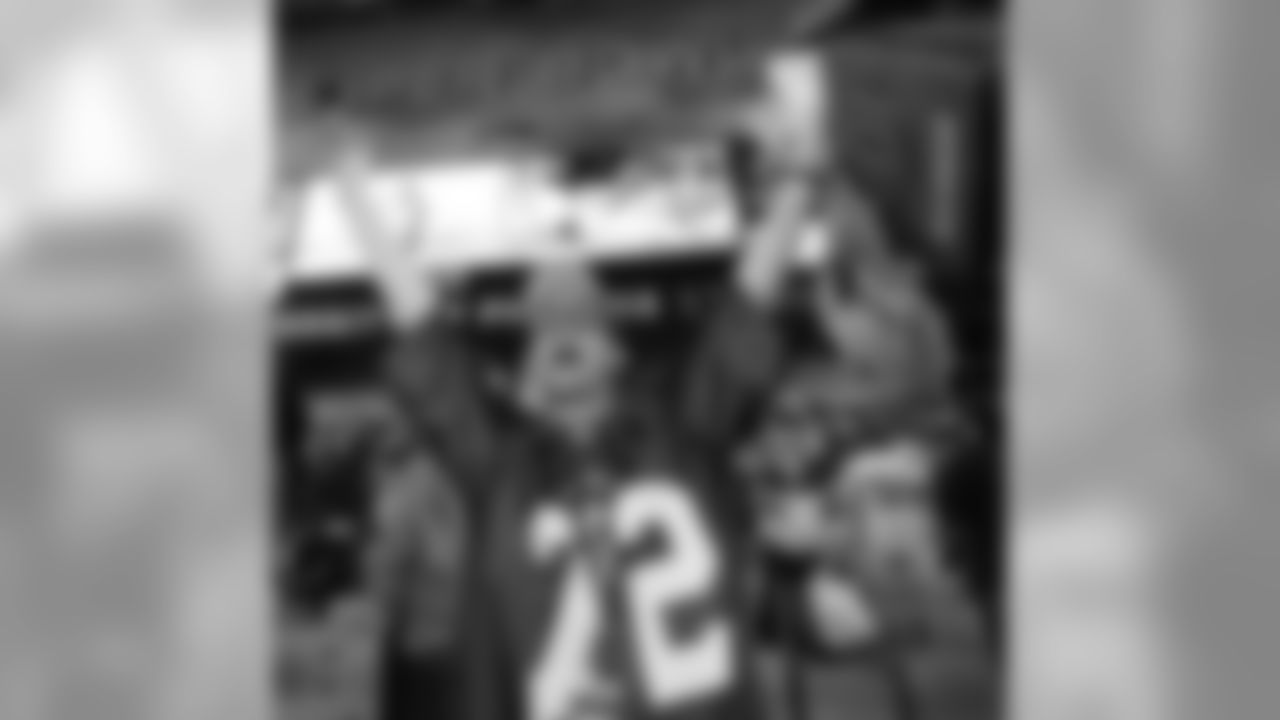
A New York Giants fan celebrates following the Giants win over the New England Patriots at the Super Bowl XLII football game at University of Phoenix Stadium on Sunday, Feb. 3, 2008 in Glendale, Ariz. (AP Photo/Ross D. Franklin)
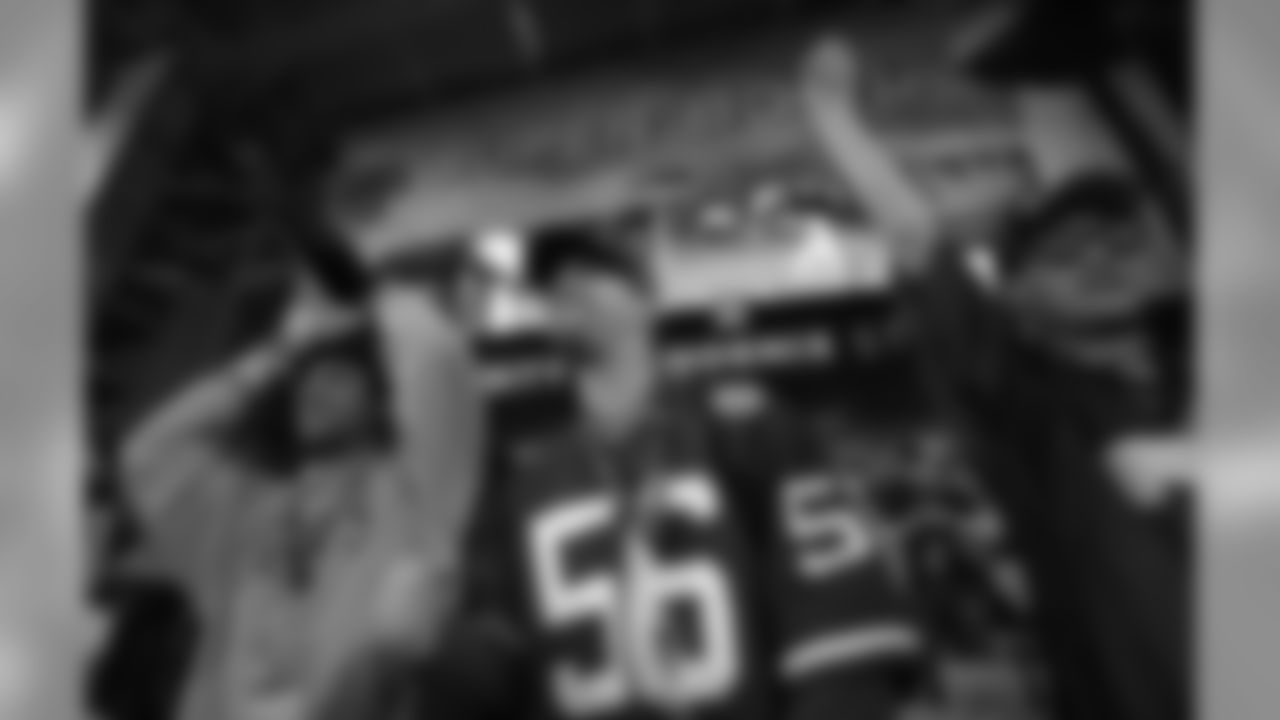
New York Giants fans celebrate during the Giants' 17-14 win over the New England Patriots in the Super Bowl XLII football game at University of Phoenix Stadium on Sunday, Feb. 3, 2008, in Glendale, Ariz. (AP Photo/Ross D. Franklin)
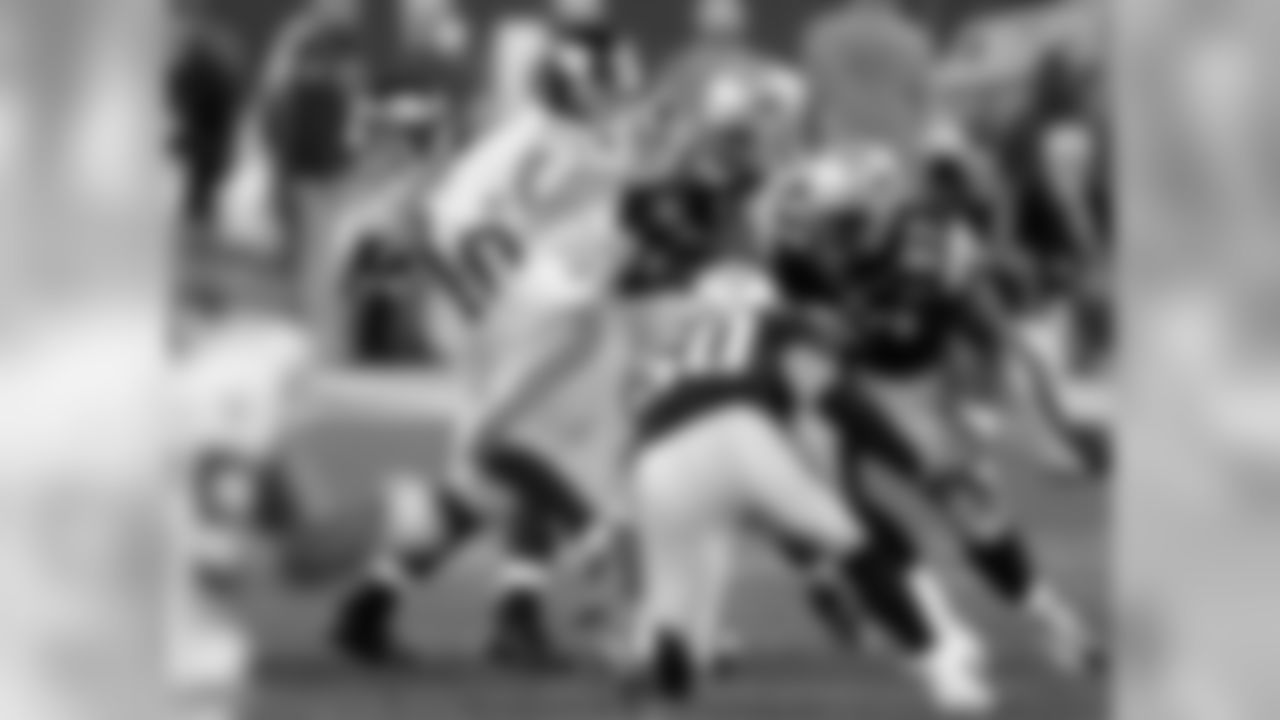
New York Giants quarterback Eli Manning, left, scrambles away from New England Patriots defenders on third-and-5 before launching a 32-yard pass to David Tyree with 1:15 left in the fourth quarter during the Super Bowl XLII football game Sunday, Feb. 3, 2008 in Glendale, Ariz. Tyree's reception set up the Giants final. The Giants won 17-14. (AP Photo/Elaine Thompson)
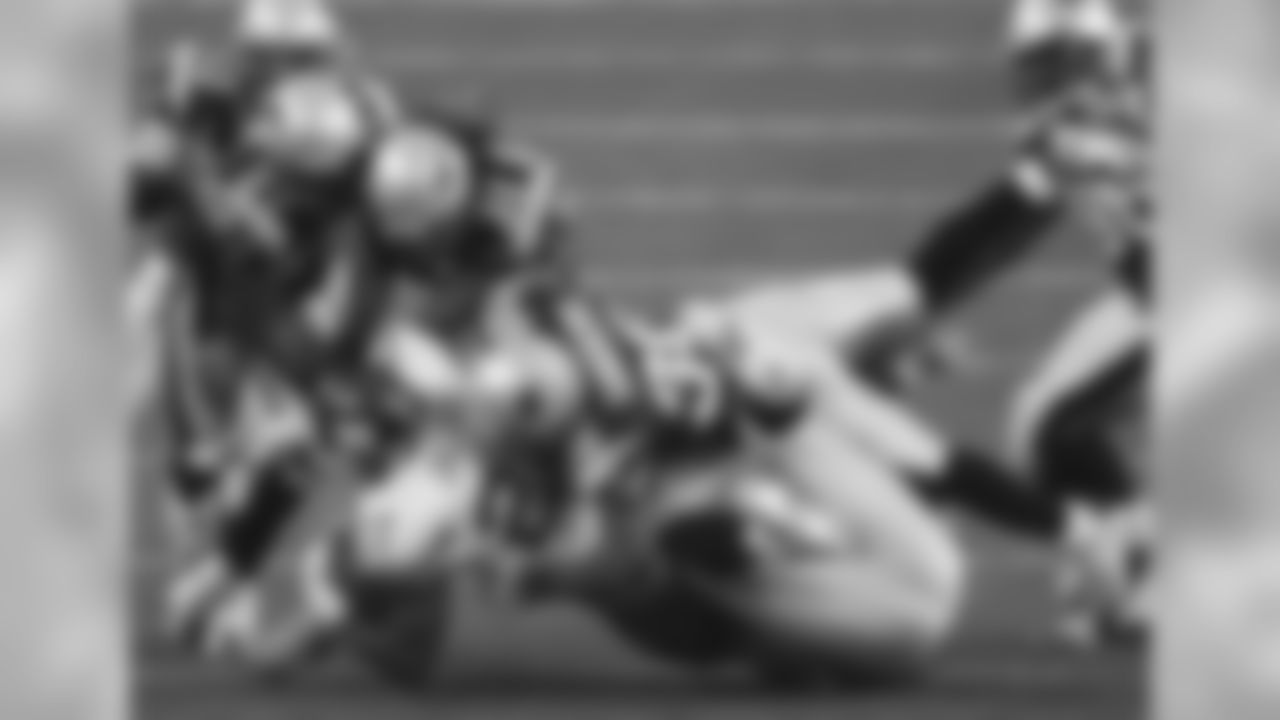
New York Giants running back Brandon Jacobs (27) gets tackled by New England Patriots safety James Sanders (36) and other defenders during the first quarter of the Super Bowl XLII football game at University of Phoenix Stadium on Sunday, Feb. 3, 2008, in Glendale, Ariz. At top left are cornerback Ellis Hobbs III (27) and defensive back Brandon Meriweather (31). (AP Photo/Ross D. Franklin)
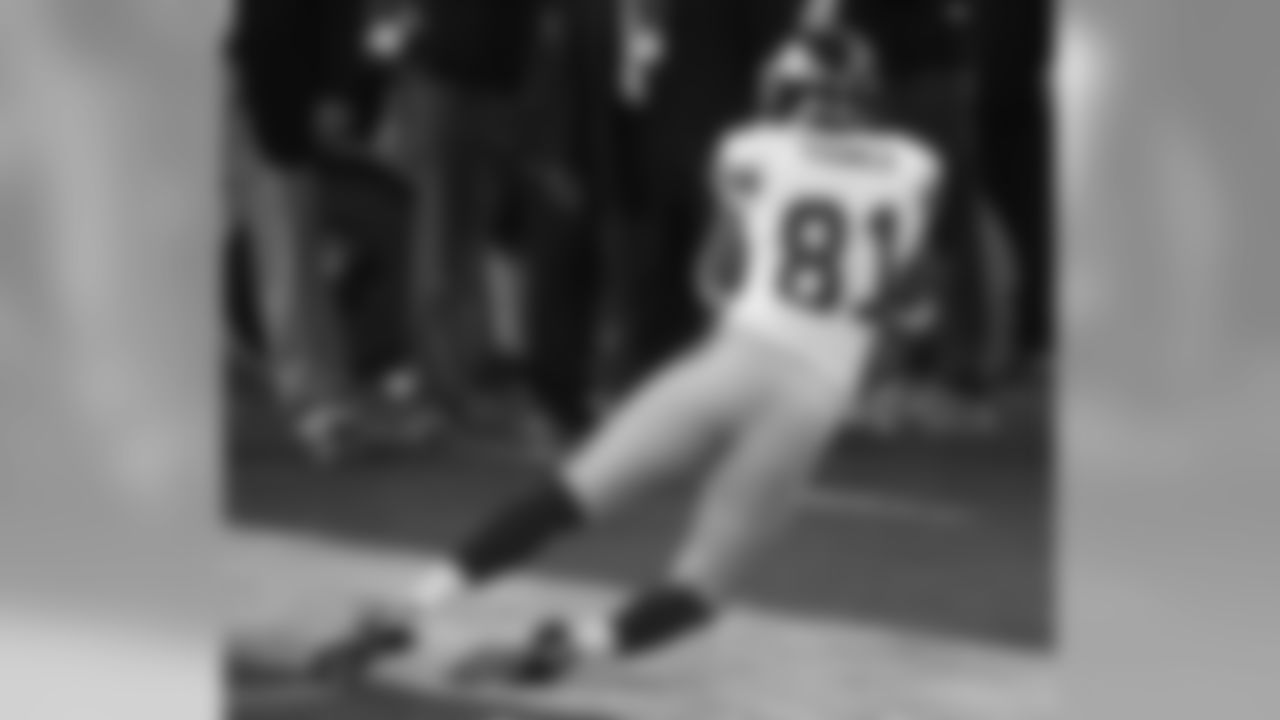
New York Giants receiver Amani Toomer (81) makes a catch during the second quarter of the Super Bowl XLII football game against the New York Giants at University of Phoenix Stadium on Sunday, Feb. 3, 2008, in Glendale, Ariz. (AP Photo/Ross D. Franklin)
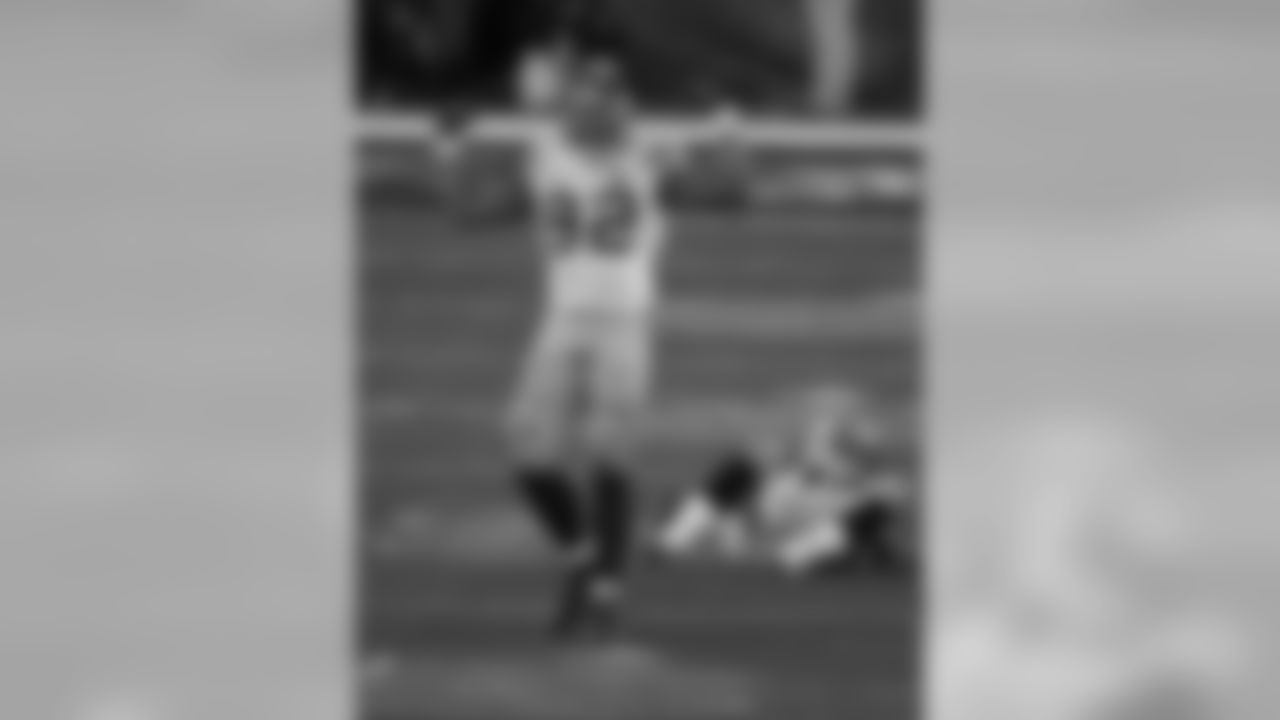
New York Giants defensive end Michael Strahan (92) reacts after a sack of New England Patriots quarterback Tom Brady (12), center, during the second half of the Super Bowl XLII football game at University of Phoenix Stadium on Sunday, Feb. 3, 2008 in Glendale, Ariz. (AP Photo/Ross D. Franklin)

New York Giants defensive end Michael Strahan (92) holds the Vince Lombardi trophy after the Giants beat the New England Patriots 17-14 to win the Super Bowl XLII football game in Glendale, Ariz, on Sunday, Feb. 3, 2008. (AP Photo/Eric Gay)

New York Giants quarterback Eli Manning, left, and Michael Strahan celebrate after the Giants beat the New England Patriots 17-14 in the Super Bowl XLII football game on Sunday, Feb. 3, 2008, in Glendale, Ariz. (AP Photo/Eric Gay)

New York Giants defensive end Justin Tuck (91) reacts to an injury during the fourth quarter at the Super Bowl XLII football game against the New England Patriots in University of Phoenix Stadium on Sunday, Feb. 3, 2008 in Glendale, Ariz. (AP Photo/Eric Gay)
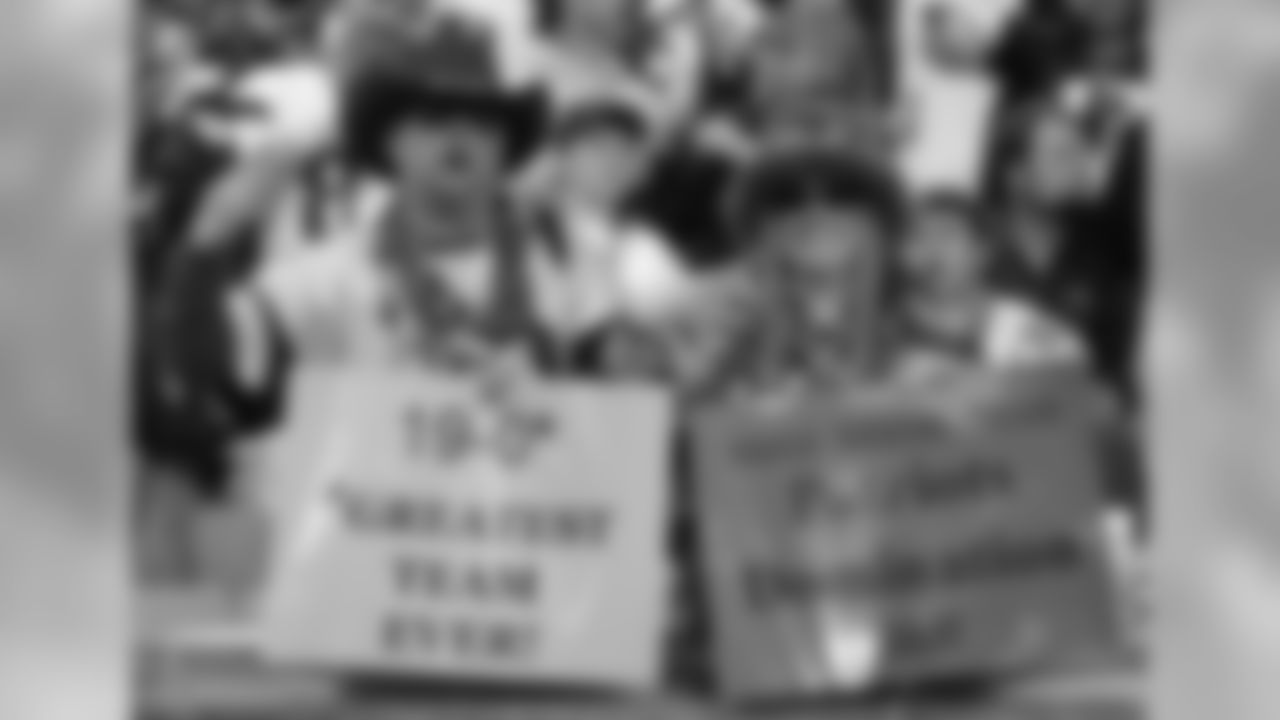
New England Patriots fans hold up signs and four fingers before the Super Bowl XLII football game between the Patriots and the New York Giants at University of Phoenix Stadium on Sunday, Feb. 3, 2008, in Glendale, Ariz. The Patriots were 18-0 for the season entering the game and were going for their fourth Super Bowl championship. (AP Photo/Paul Sancya)
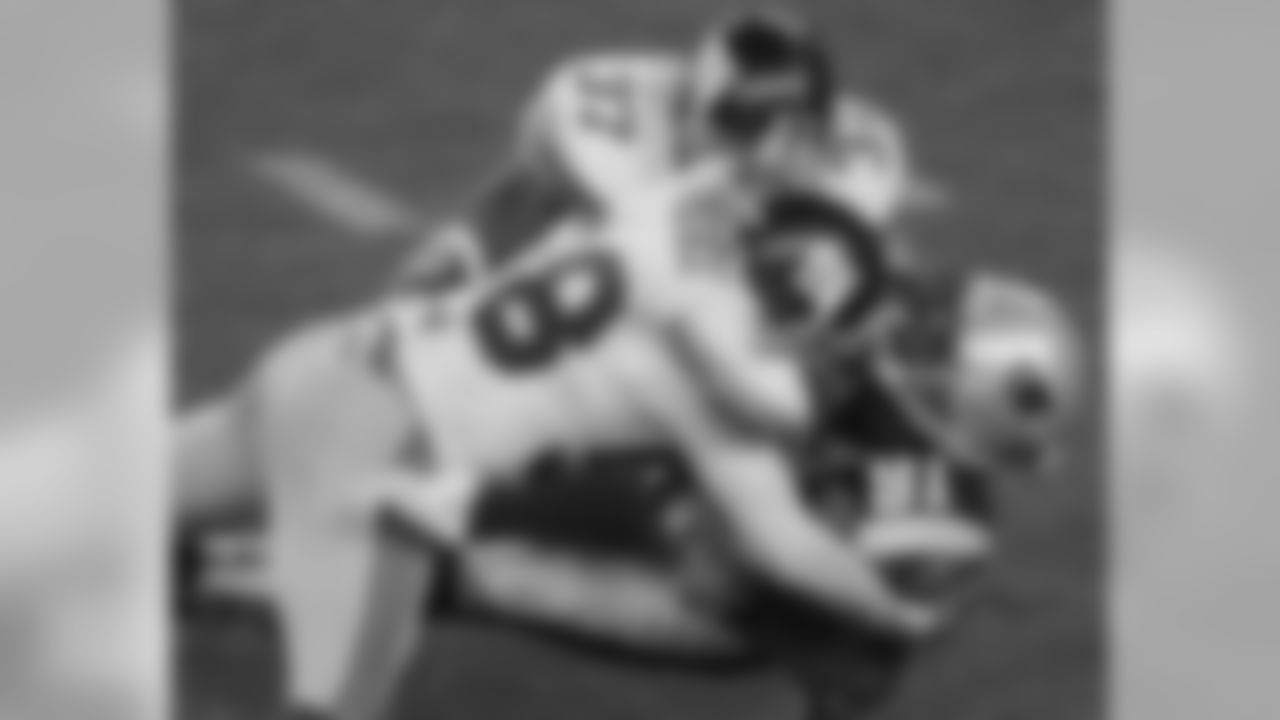
New England Patriots receiver Randy Moss (81) is hit by New York Giants linebacker Antonio Pierce (58) and his teammate James Butler after Moss made a catch during the fourth quarter of the Super Bowl XLII football game at University of Phoenix Stadium on Sunday, Feb. 3, 2008 in Glendale, Ariz. (AP Photo/Charlie Riedel)

New York Giants receiver Amani Toomer (81) celebrates with fans after the Giants beat the New England Patriots 17-14 in the Super Bowl XLII football game on Sunday, Feb. 3, 2008, in Glendale, Ariz. (AP Photo/Charlie Riedel)
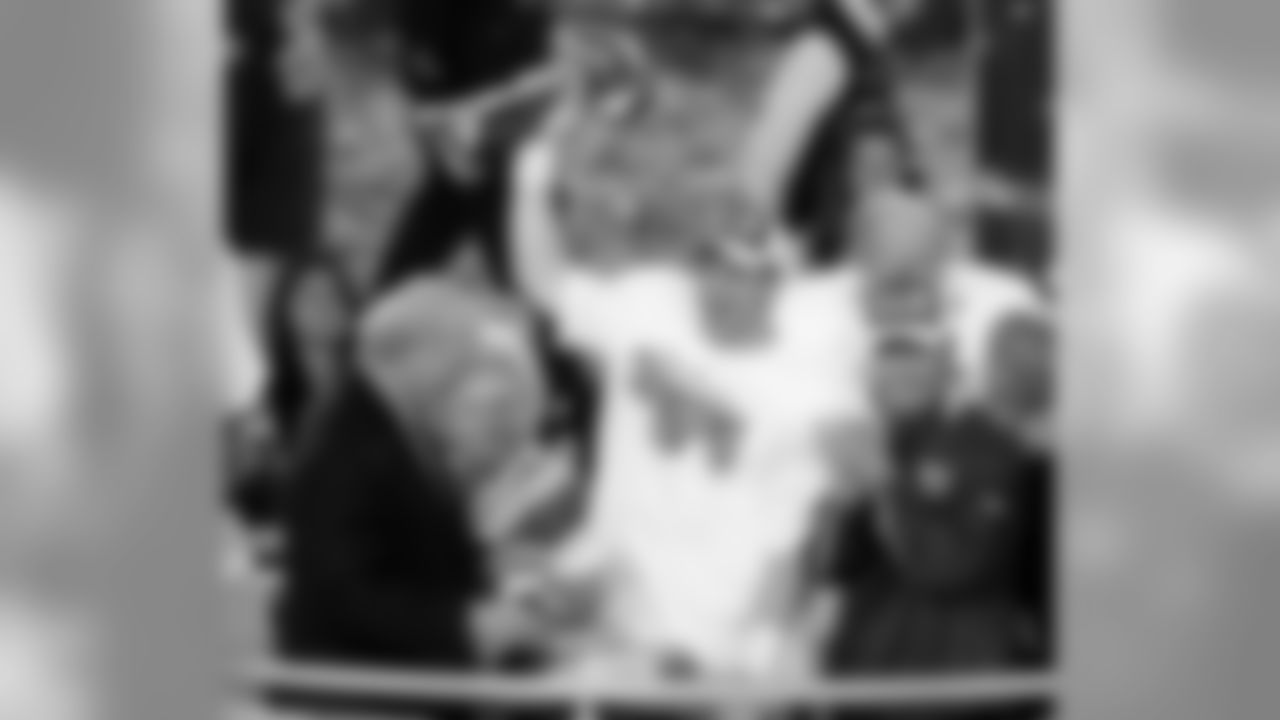
New York Giants quarterback Eli Manning, center, holds the Vince Lombardi Trophy as he celebrates with his coach Tom Coughlin, right, after the Giants beat the New England Patriots 17-14 in the Super Bowl XLII football game on Sunday, Feb. 3, 2008, in Glendale, Ariz.(AP Photo/Charlie Riedel)
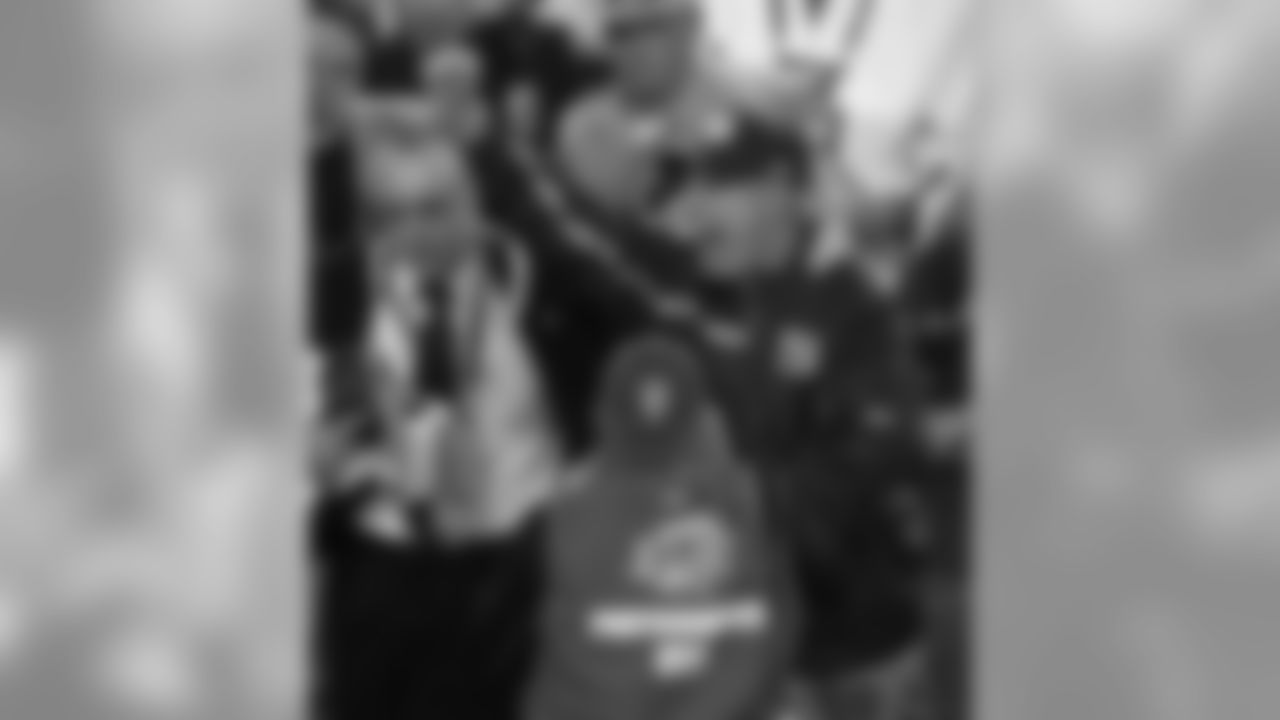
New York Giants head coach Tom Coughlin celebrates after the Giants beat the New England Patriots 17-14 in the Super Bowl XLII football game on Sunday, Feb. 3, 2008, in Glendale, Ariz. (AP Photo/Charlie Riedel)
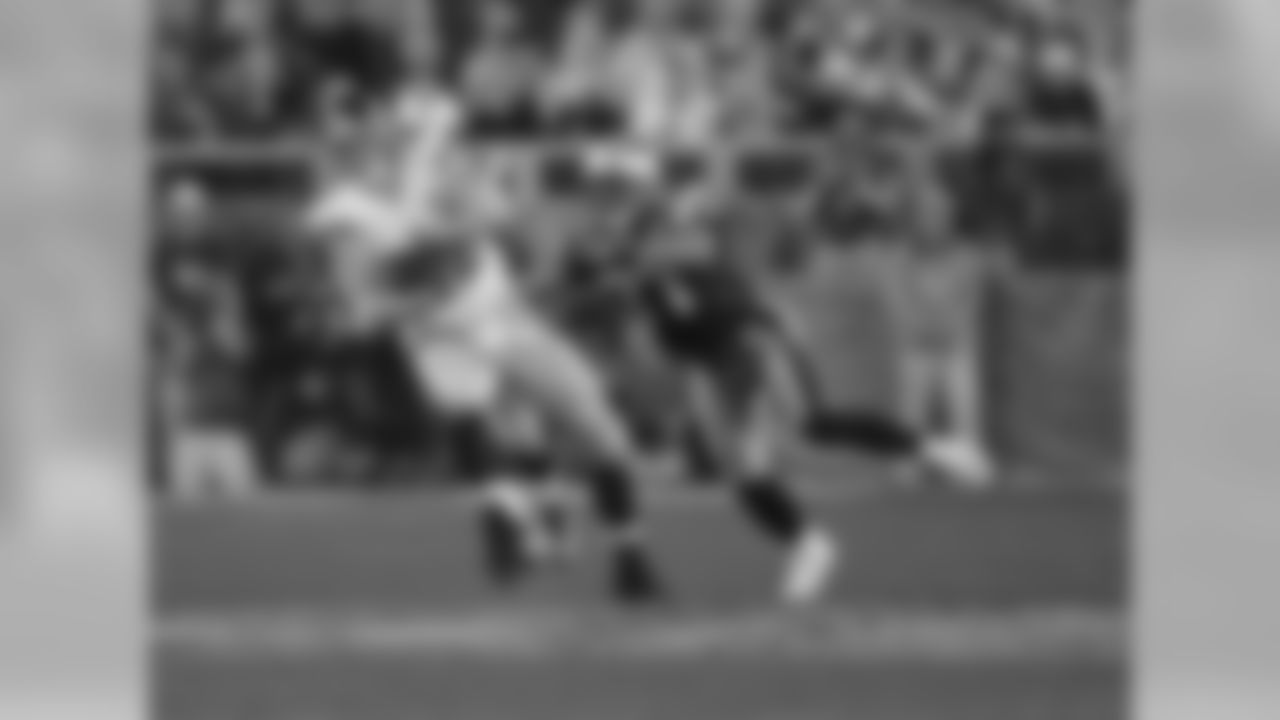
New York Giants tight end Kevin Boss (89) pulls in a pass as New England Patriots safety Rodney Harrison (37) closes in during the fourth quarter of the Super Bowl XLII football game at University of Phoenix Stadium on Sunday, Feb. 3, 2008, in Glendale, Ariz. The Giants won 17-14. (AP Photo/Paul Sancya)
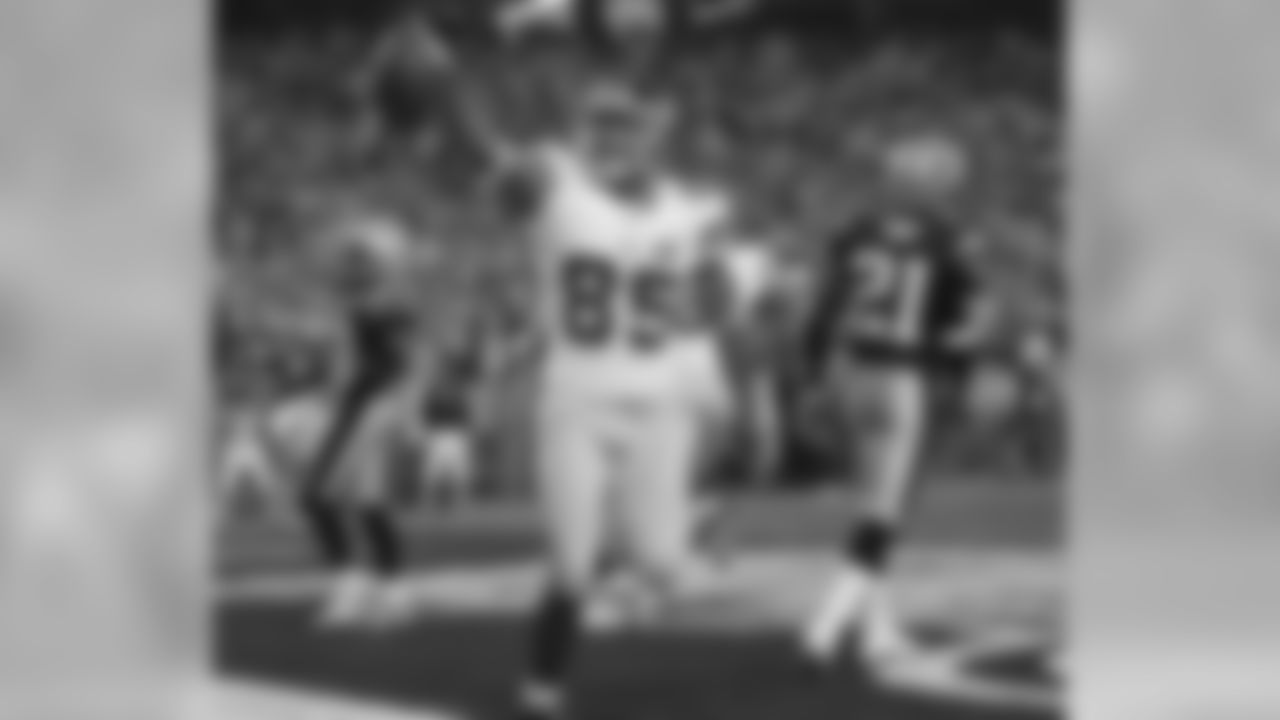
New York Giants receiver David Tyree (85) celebrates his 5-yard touchdown during the third quarter against the New England Patriots in the Super Bowl XLII football game at University of Phoenix Stadium on Sunday, Feb. 3, 2008, in Glendale, Ariz. At right is Patriots cornerback Randall Gay (21). (AP Photo/Paul Sancya)
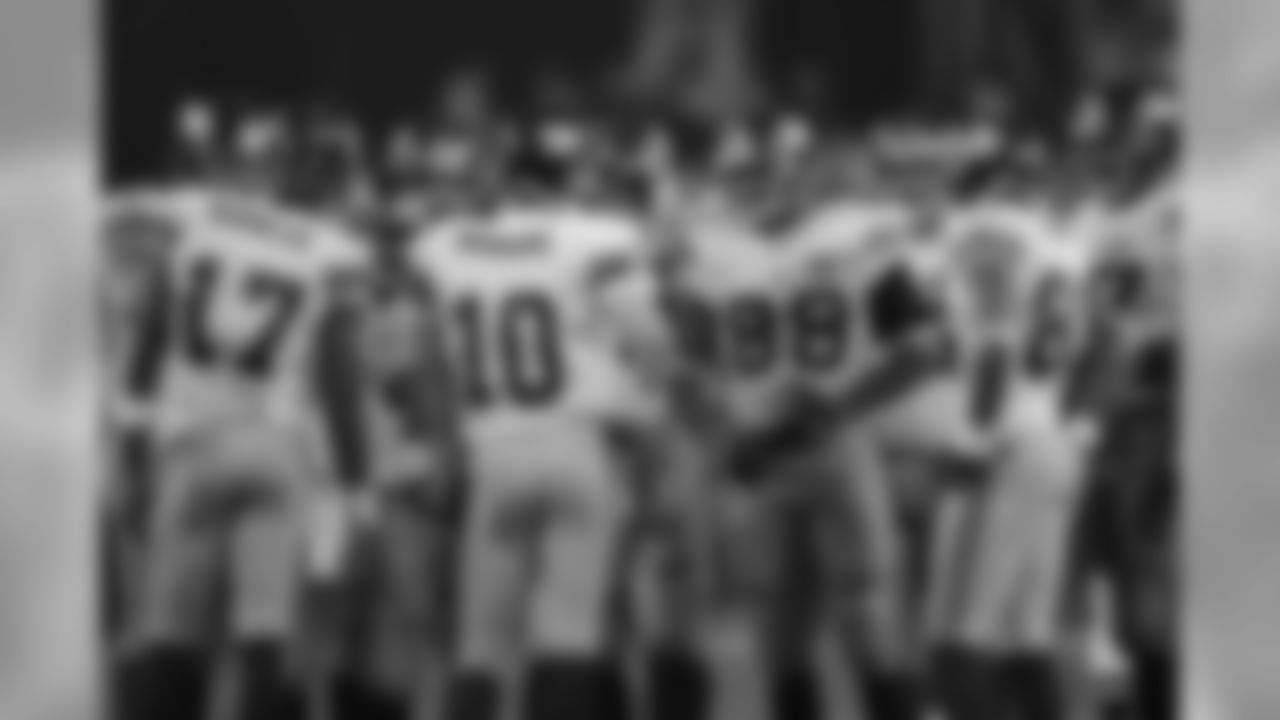
New York Giants quarterback Eli Manning (10) and running back Plaxico Burress (17) join teammates in a huddle during the second quarter of the Super Bowl XLII football game against the New England Patriots at University of Phoenix Stadium on Sunday, Feb. 3, 2008, in Glendale, Ariz. The Giants won 17-14. (AP Photo/Paul Sancya)
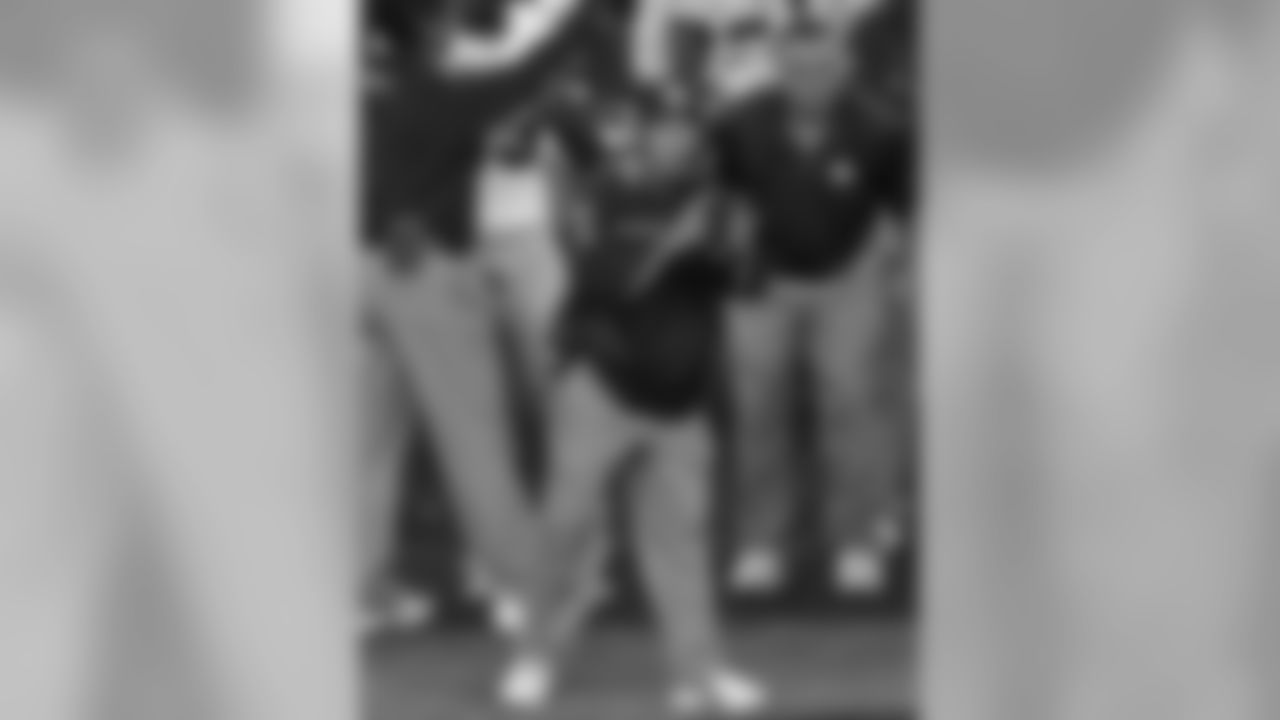
New York Giants head coach Tom Coughlin cheers on his team in the fourth quarter against the New England Patriots during the Super Bowl XLII football game at University of Phoenix Stadium on Sunday, Feb. 3, 2008 in Glendale, Ariz. (AP Photo/Charlie Riedel)

New York Giants quarterback Eli Manning (10) celebrates after defeating the New England Patriots 17-14 in the Super Bowl XLII football game at University of Phoenix Stadium on Sunday, Feb. 3, 2008 in Glendale, Ariz. (AP Photo/Chris O'Meara)
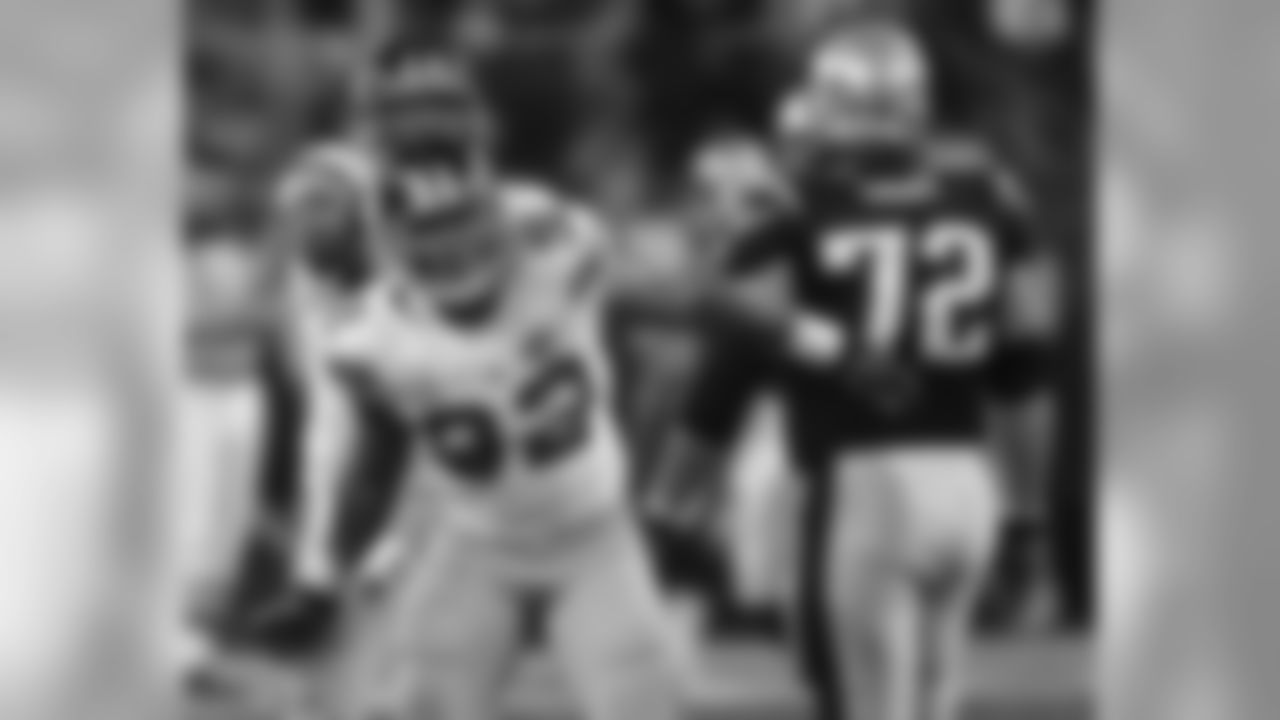
New York Giants defensive end Michael Strahan (92) reacts during the Giants 17-14 win over the New England Patriots during the Super Bowl XLII football game at University of Phoenix Stadium on Sunday, Feb. 3, 2008 in Glendale, Ariz. (AP Photo/Stephan Savoia)

New England Patriots head coach Bill Belichick watches warm-ups before the Super Bowl XLII football game against the New York Giants at University of Phoenix Stadium on Sunday, Feb. 3, 2008 in Glendale, Ariz. (AP Photo/Elaine Thompson)
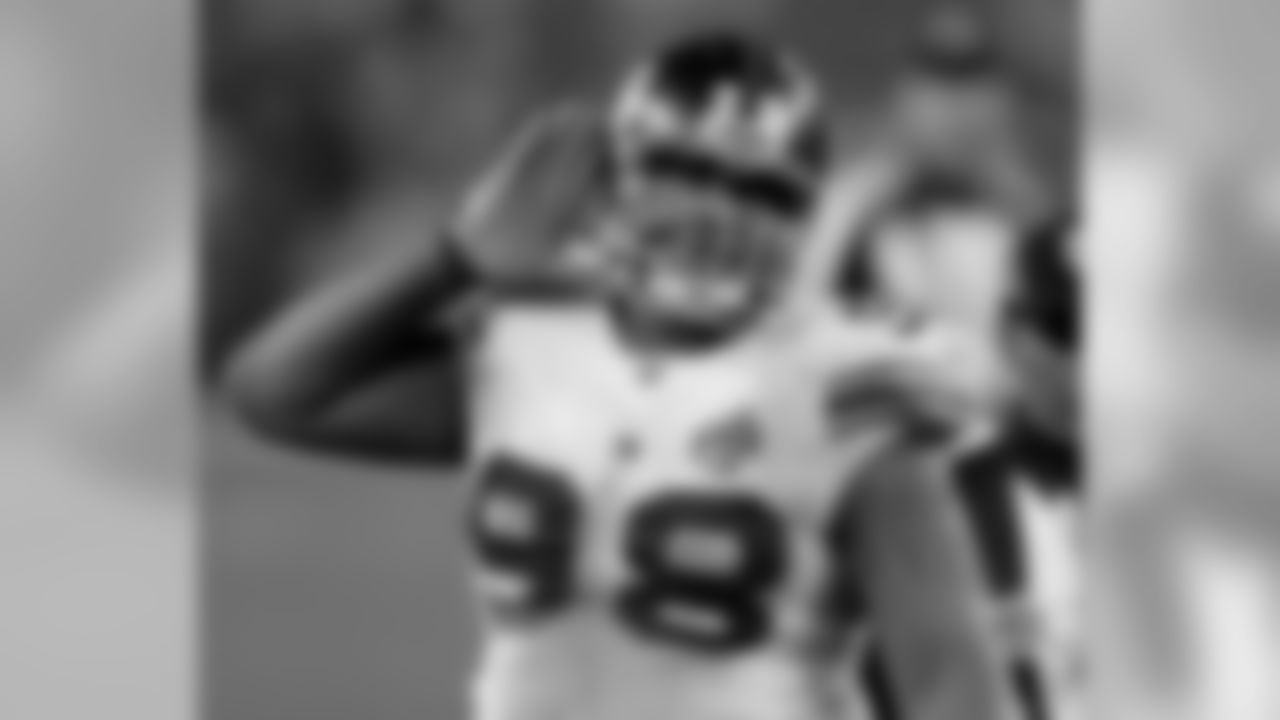
New York Giants defensive tackle Fred Robbins (98) gestures to the crowd during the fourth quarter against the New England Patriots at the Super Bowl XLII football game at University of Phoenix Stadium on Sunday, Feb. 3, 2008 in Glendale, Ariz. (AP Photo/Elaine Thompson)
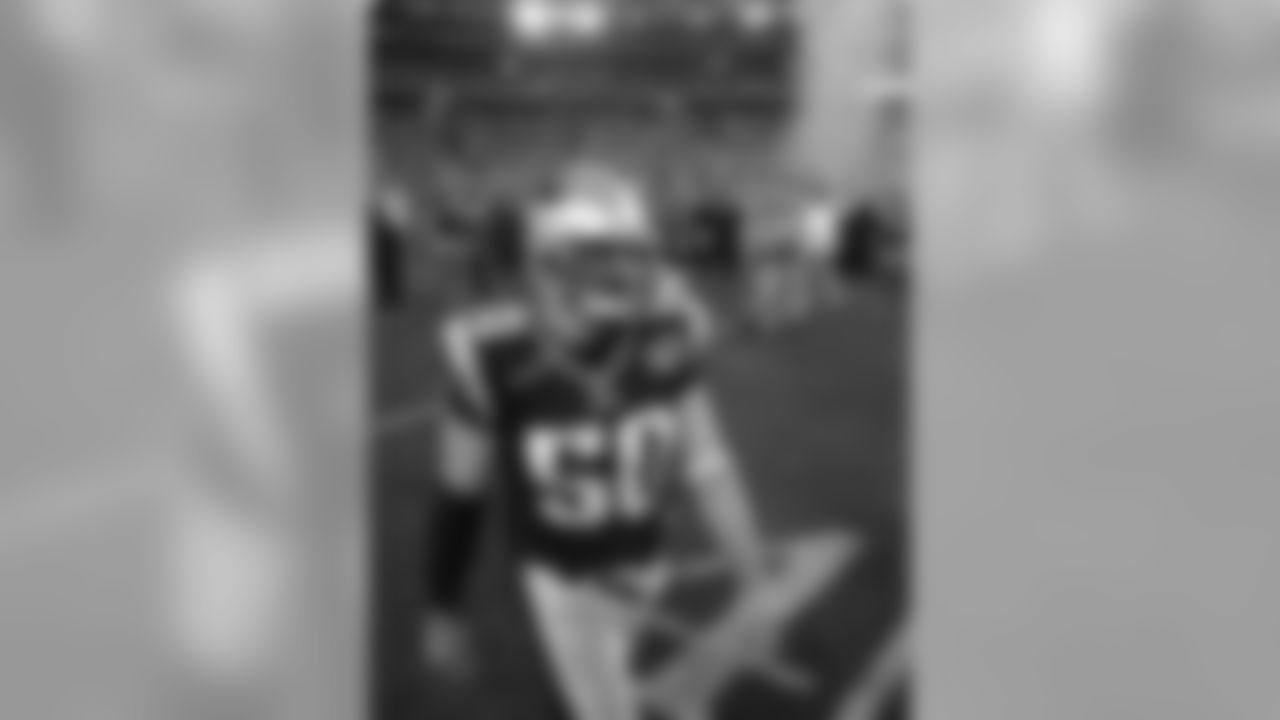
New England Patriots linebacker Mike Vrabel (50) walks off the field after the Patriots lost to the New York Giants 17-14 in the Super Bowl XLII football game on Sunday, Feb. 3, 2008, in Glendale, Ariz. (AP Photo/Stephan Savoia)
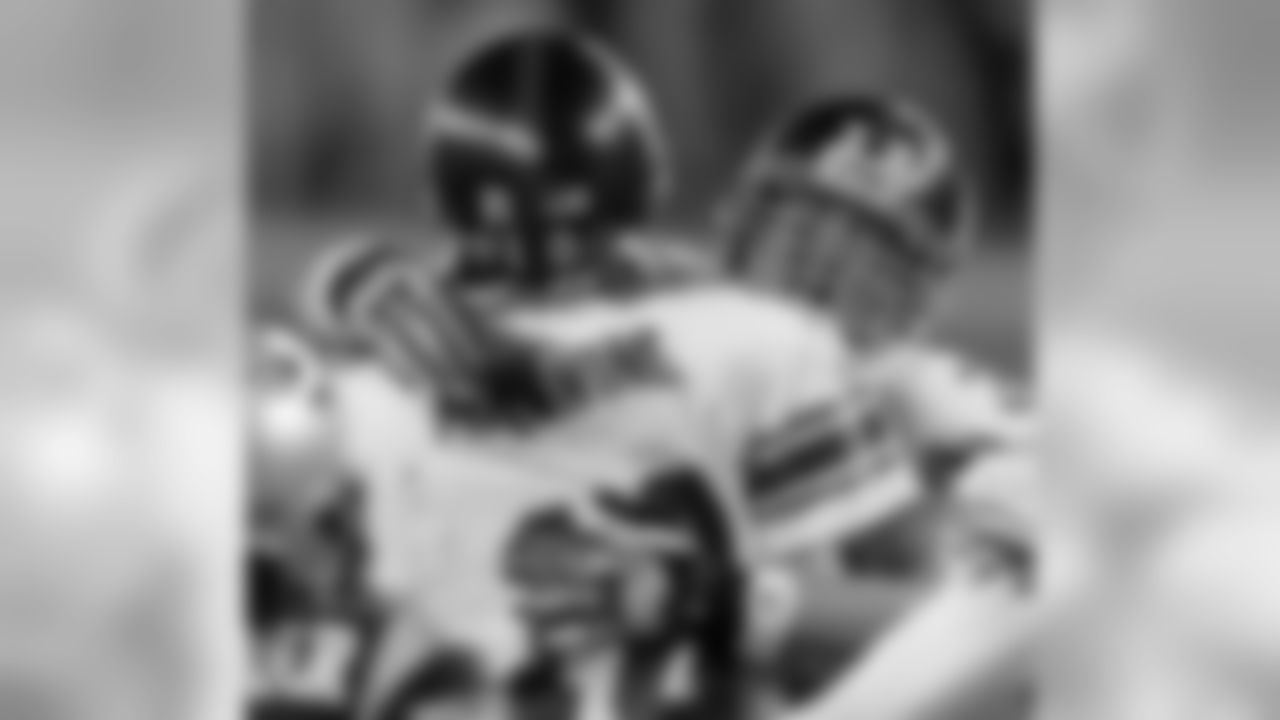
New York Giants quarterback Eli Manning (10) and Madison Hedgecock celebrate after their team scored the winning fourth-quarter touchdown during the Super Bowl XLII football game against the New England Patriots at University of Phoenix Stadium on Sunday, Feb. 3, 2008 in Glendale, Ariz. (AP Photo/Elaine Thompson)
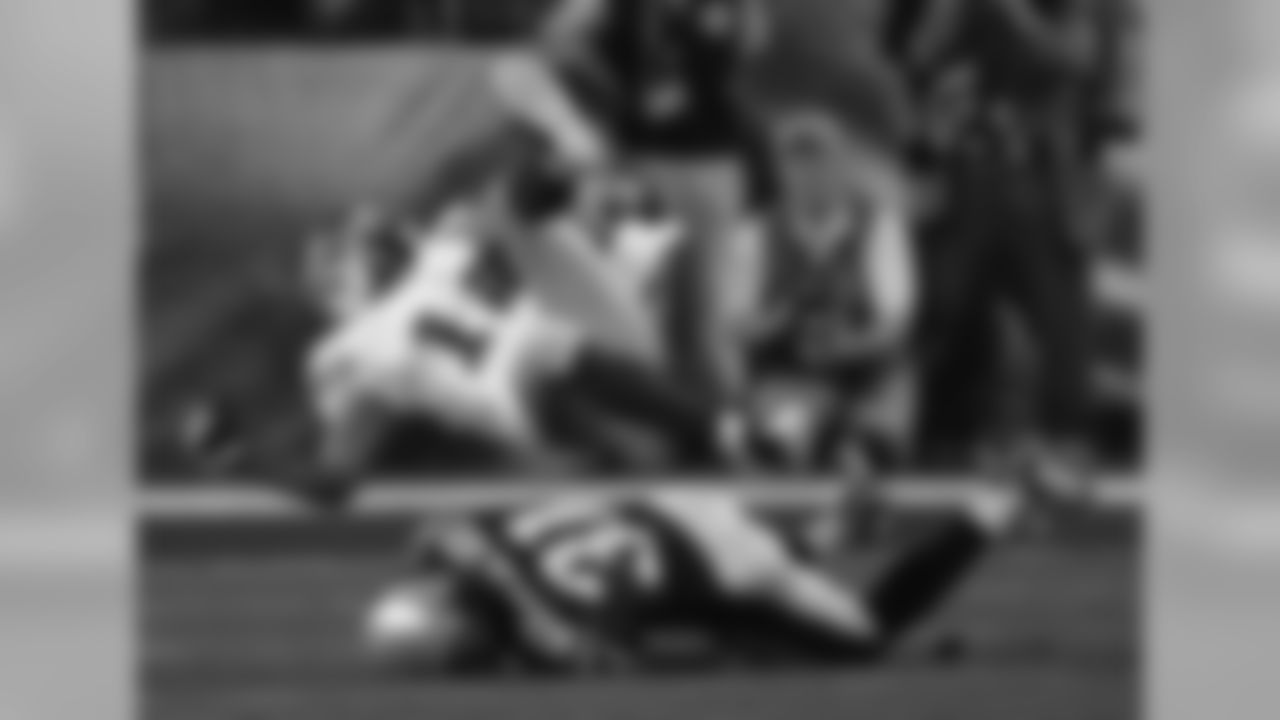
New York Giants receiver Steve Smith (12) is upended after a reception by New England Patriots safety Brandon Meriweather (31) during the Super Bowl XLII football game at University of Phoenix Stadium on Sunday, Feb. 3, 2008 in Glendale, Ariz. (AP Photo/Stephan Savoia)
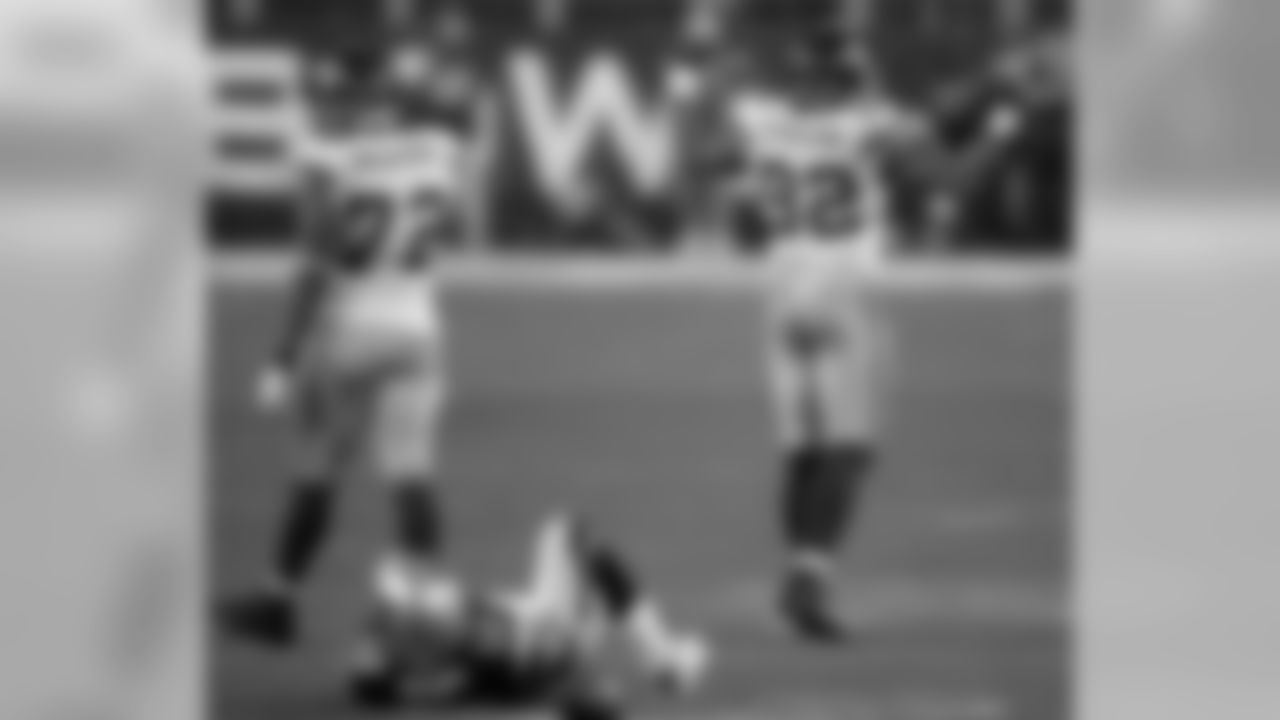
New York Giants' Michael Strahan (92) and Osi Umenyiora (72) celebrate after Strahan sacked New England Patriots quarterback Tom Brady, right, during the third quarter of the Super Bowl XLII football game at University of Phoenix Stadium on Sunday, Feb. 3, 2008 in Glendale, Ariz. (AP Photo/Matt Slocum)
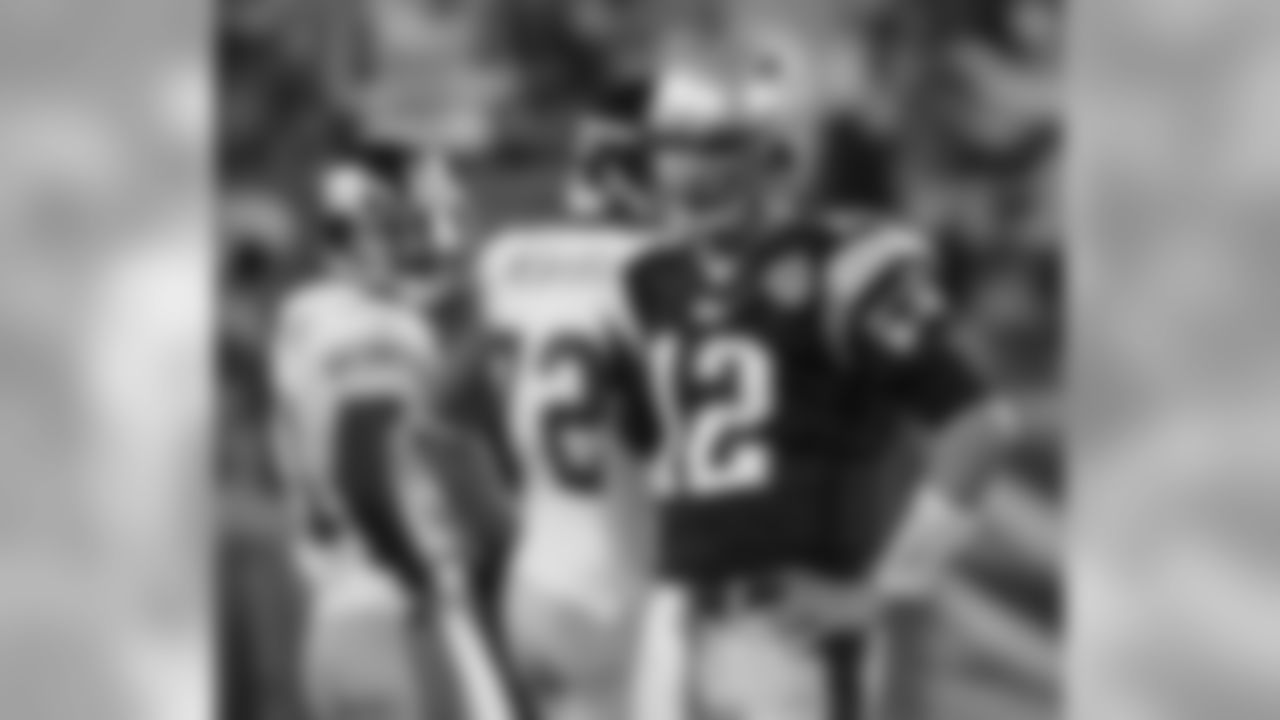
New England Patriots quarterback Tom Brady (12) is seen during the Patriots' 17-14 loss to the New York Giants during the Super Bowl XLII football game at University of Phoenix Stadium on Sunday, Feb. 3, 2008 in Glendale, Ariz. (AP Photo/Stephan Savoia)
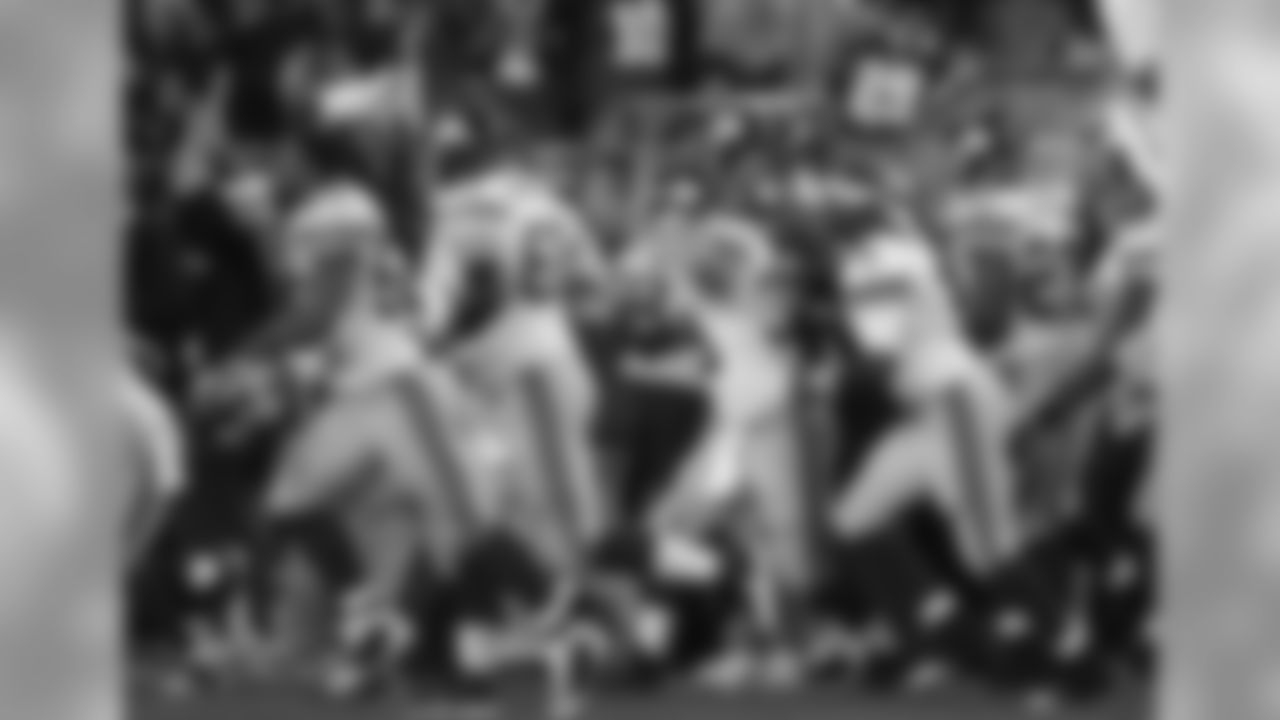
New York Giants players celebrate after beating the New England Patriots 17-14 in the Super Bowl XLII football game at University of Phoenix Stadium on Sunday, Feb. 3, 2008 in Glendale, Ariz. (AP Photo/Stephan Savoia)
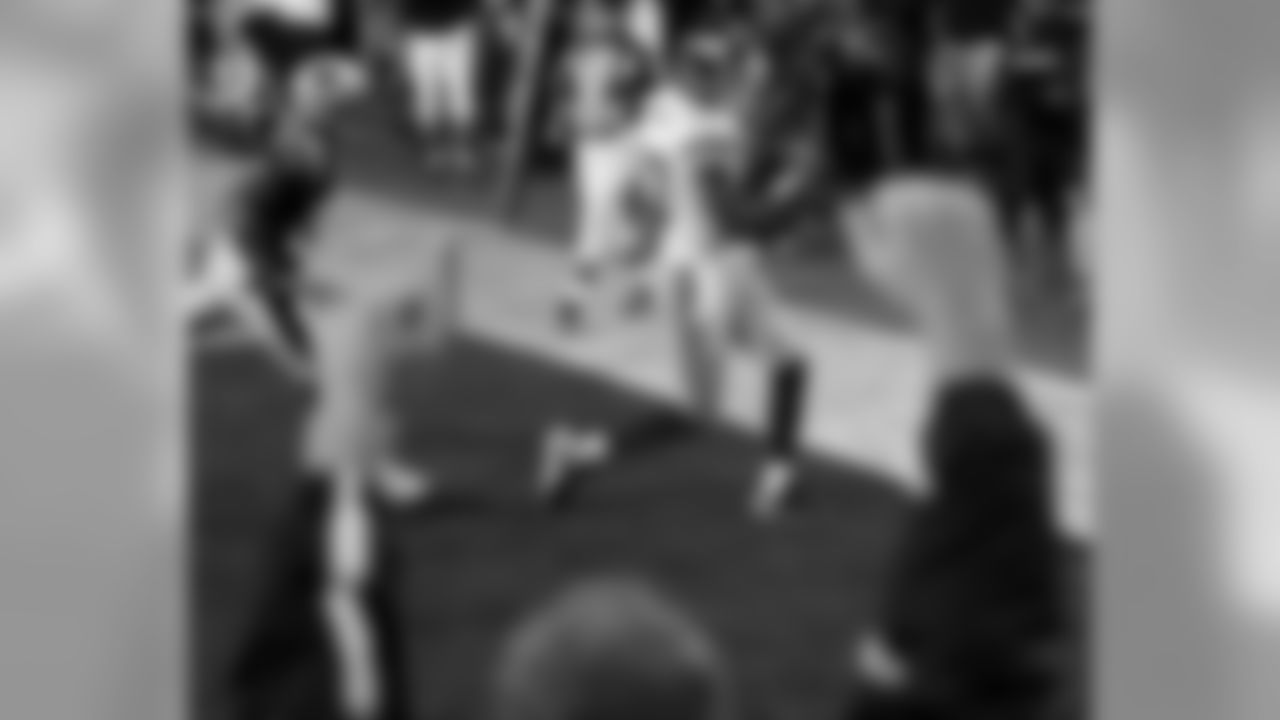
New York Giants receiver Plaxico Burress (17) scores a touchdown against the New England Patriots during the fourth quarter of the Super Bowl XLII football game at University of Phoenix Stadium on Sunday, Feb. 3, 2008 in Glendale, Ariz. (AP Photo/Matt Slocum)
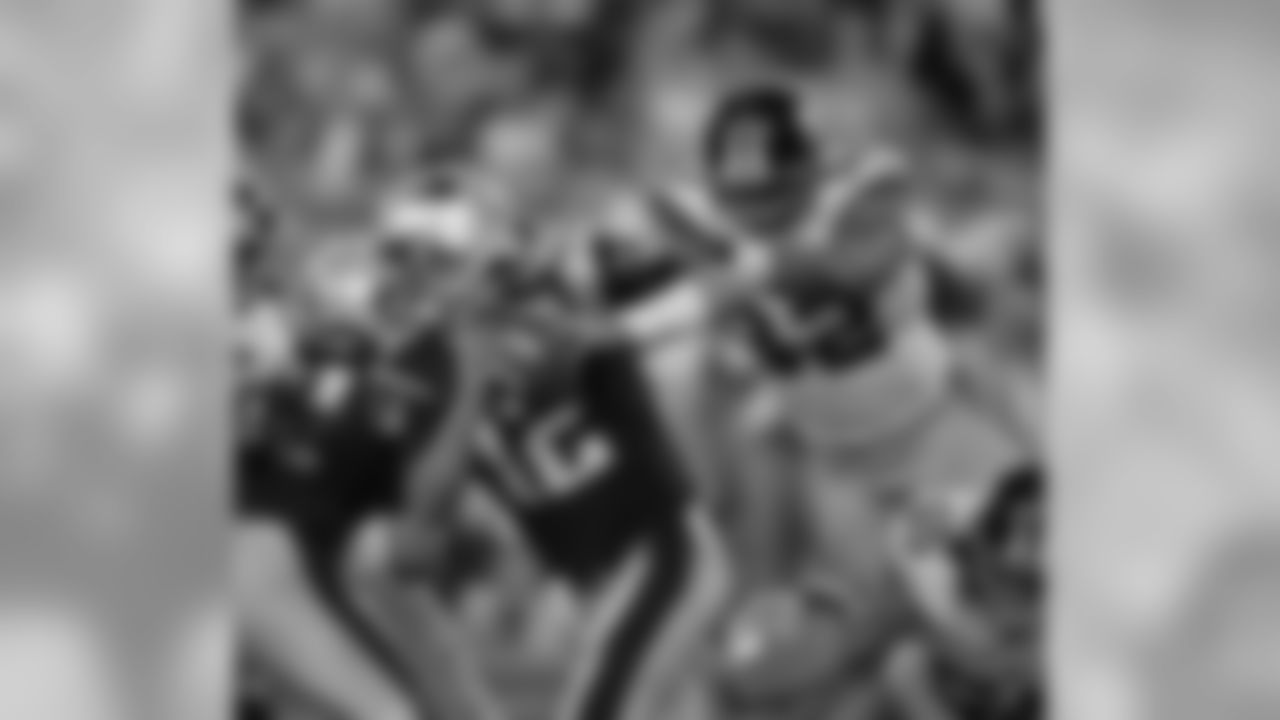
New England Patriots quarterback Tom Brady (12) gets pressure from New York Giants defensive end Michael Strahan (92) during the Super Bowl XLII football game at University of Phoenix Stadium on Sunday, Feb. 3, 2008 in Glendale, Ariz. (AP Photo/Stephan Savoia)

University of Phoenix Stadium is seen prior to the start of the Super Bowl XLII football game between the New England Patriots and New York Giants on Sunday, Feb. 3, 2008 in Glendale, Ariz. (AP Photo/Matt York)
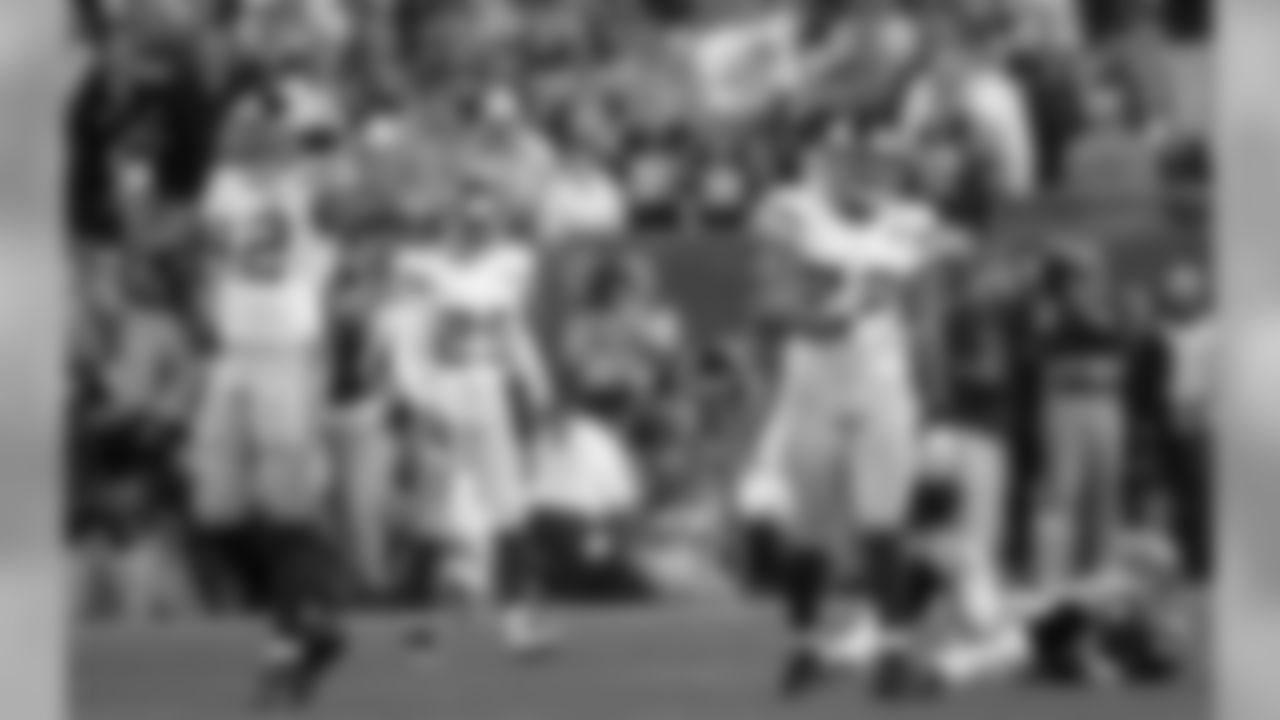
New York Giants' Michael Strahan (92) and Osi Umenyiora (72) celebrate after Strahan sacked New England Patriots quarterback Tom Brady, right, during the third quarter of the Super Bowl XLII football game at University of Phoenix Stadium on Sunday, Feb. 3, 2008 in Glendale, Ariz. (AP Photo/Eric Gay)

A young Giants fan celebrates after the New York Giants beat the New England Patriots 17-14 in the Super Bowl XLII football game on Sunday, Feb. 3, 2008, in Glendale, Ariz. (AP Photo/Eric Gay)
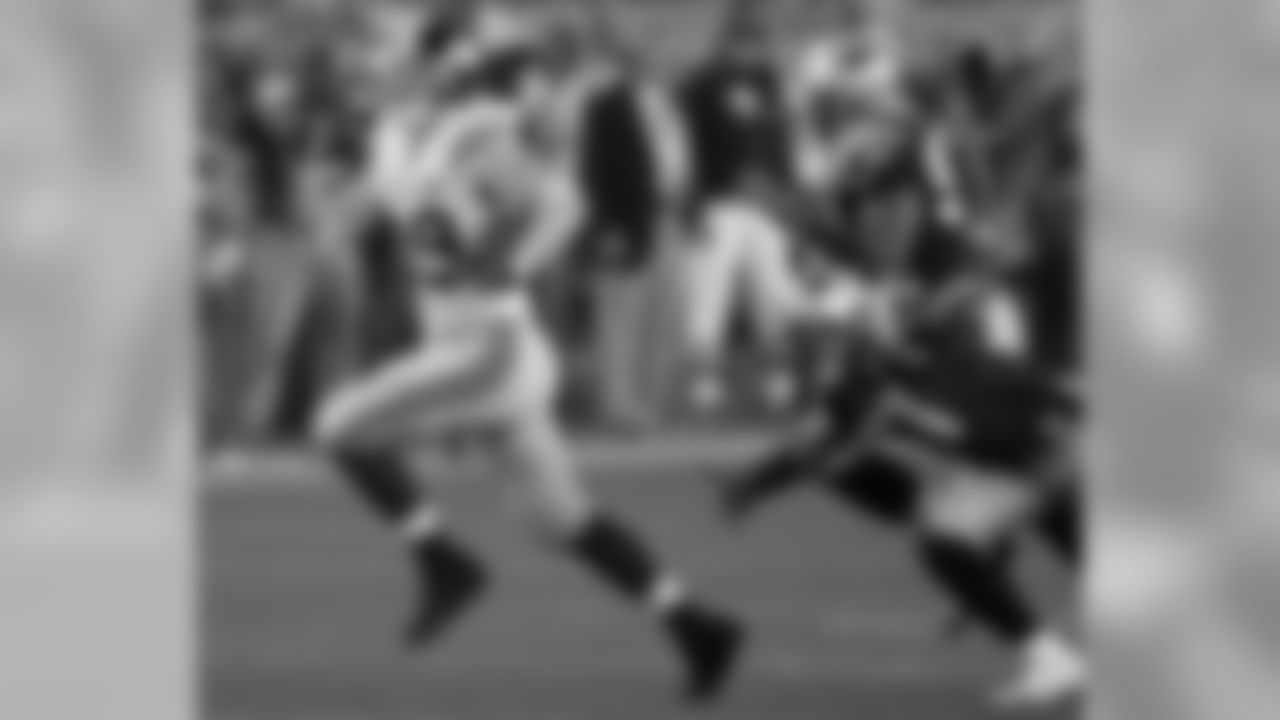
New York Giants tight end Kevin Boss (89) makes a 45-yards dash as New England Patriots linebacker Adalius Thomas (96) and Ellis Hobbs III (27) pursue during the fourth quarter of the Super Bowl XLII football game at University of Phoenix Stadium on Sunday, Feb. 3, 2008 in Glendale, Ariz. (AP Photo/Matt Slocum)

A New York Giants player holds up the Vince Lombardi trophy after the Giants beat the New England Patriots 17-14 to win the Super Bowl XLII football game in Glendale, Ariz, on Sunday, Feb. 3, 2008. (AP Photo/Eric Gay)
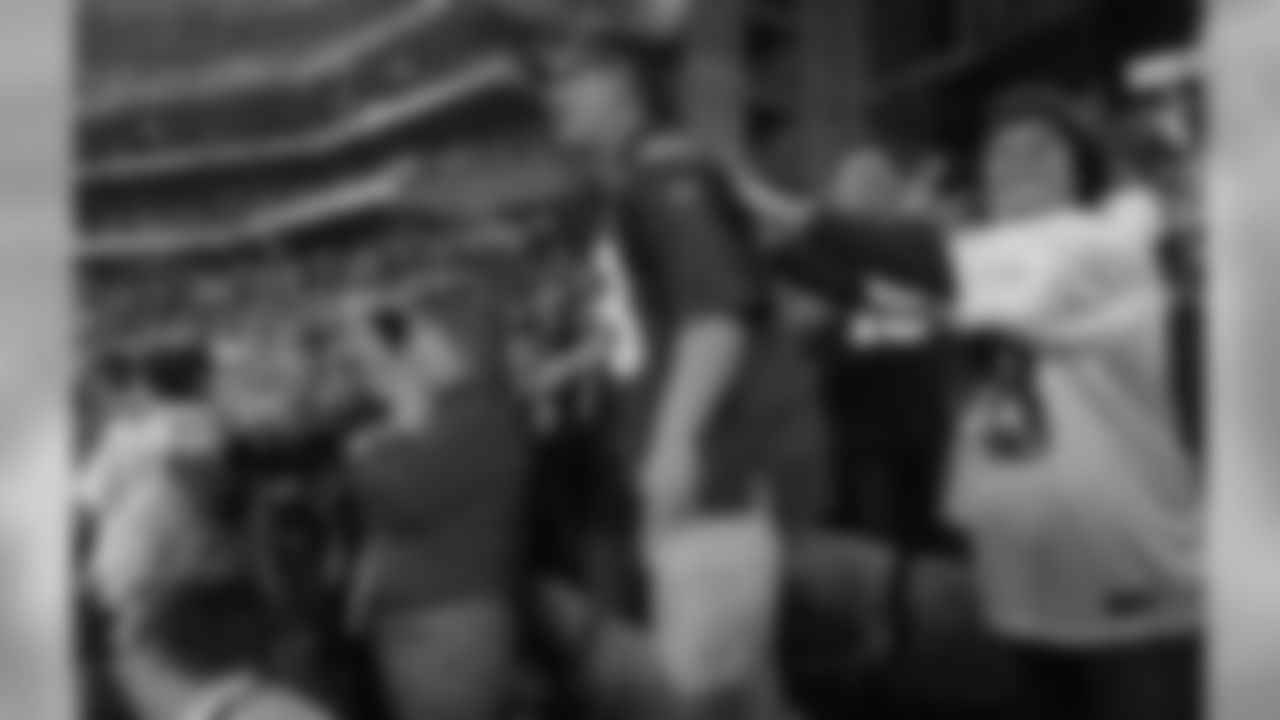
New York Giants fans react in the fourth quarter during the Super Bowl XLII football game between the Giants and New England Patriots at University of Phoenix Stadium on Sunday, Feb. 3, 2008 in Glendale, Ariz. (AP Photo/Matt York)
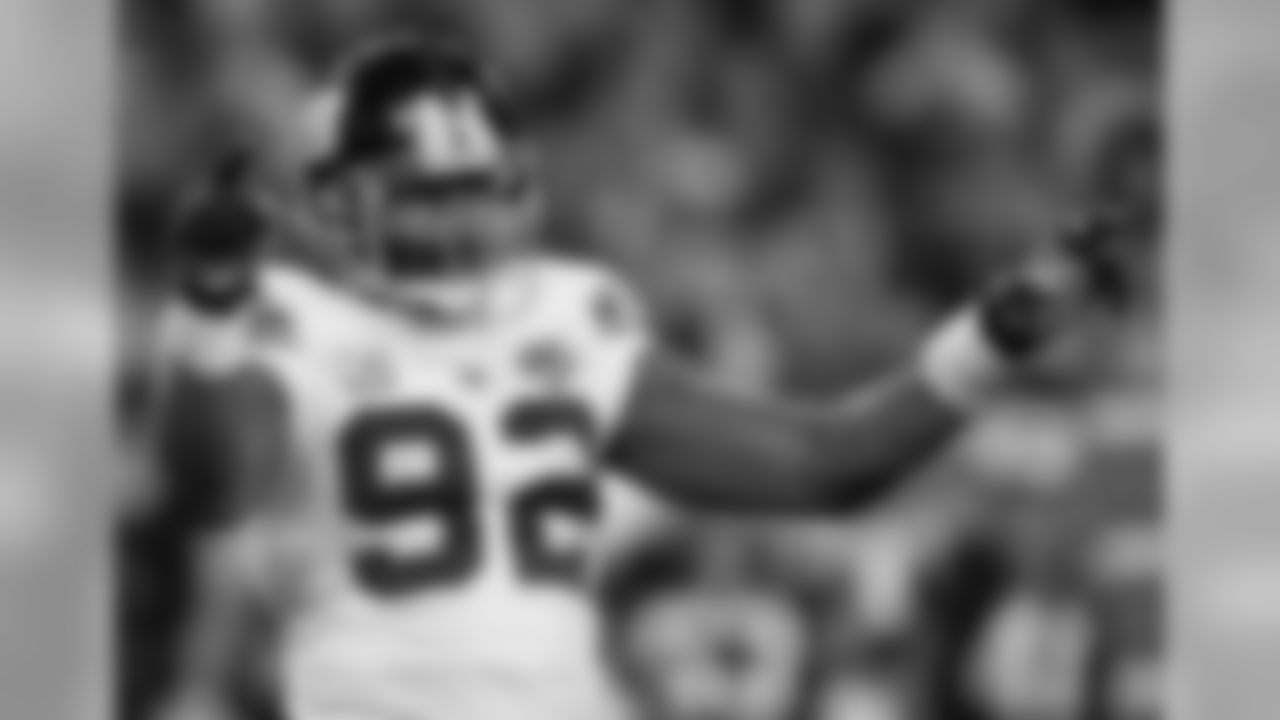
New York Giants defensive end Michael Strahan (92) celebrates after teammate Kawika Mitchell sacked New England Patriots quarterback Tom Brady during the second quarter of the Super Bowl XLII football game at University of Phoenix Stadium on Sunday, Feb. 3, 2008 in Glendale, Ariz. (AP Photo/Julie Jacobson)

New York Giants head coach Tom Coughlin hugs defensive end Osi Umenyiora (72) after defeating the New England Patriots 17-14 in Super Bowl XLII football game at University of Phoenix Stadium on Sunday, Feb. 3, 2008 in Glendale, Ariz. (AP Photo/Julie Jacobson)

New York Giants head coach Tom Coughlin reacts after defeating the New England Patriots 17-14 in Super Bowl XLII football game at University of Phoenix Stadium on Sunday, Feb. 3, 2008 in Glendale, Ariz. (AP Photo/Julie Jacobson)
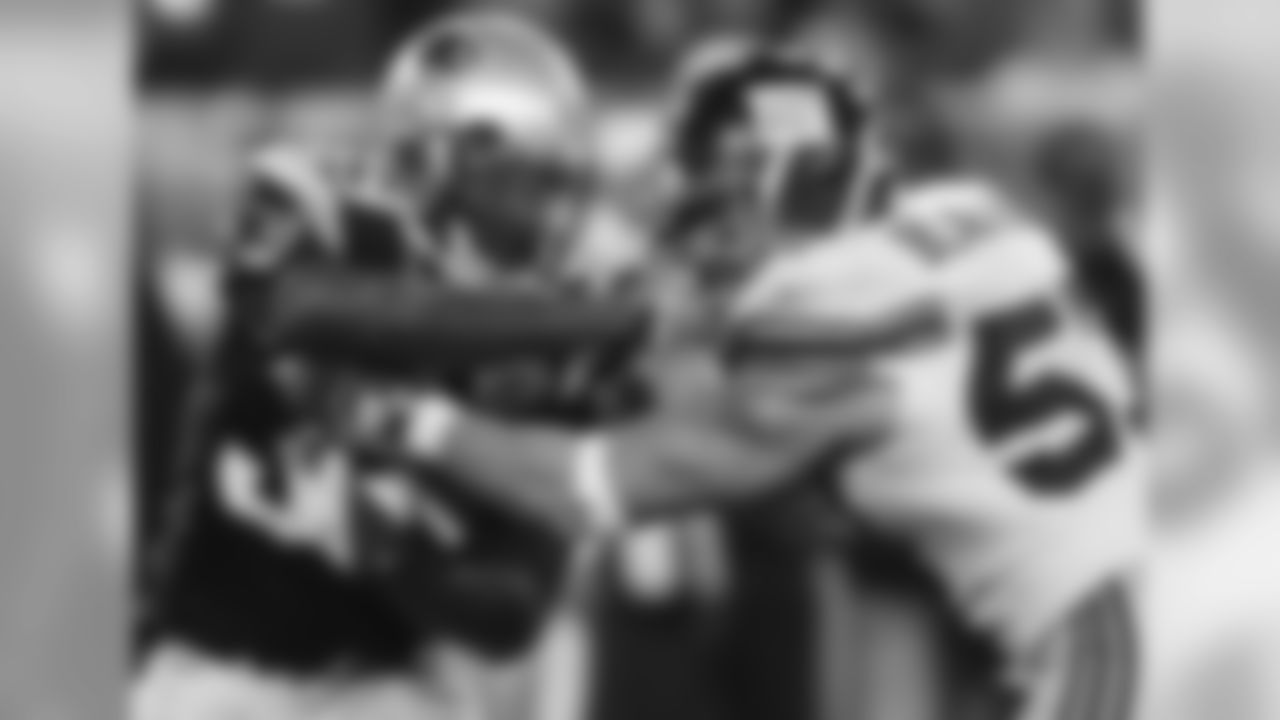
New England Patriots running back Laurence Maroney (39) is tackled by New York Giants linebacker Chase Blackburn (57) during the kick return to start the third quarter of the Super Bowl XLII football game at University of Phoenix Stadium on Sunday, Feb. 3, 2008 in Glendale, Ariz. (AP Photo/Julie Jacobson)
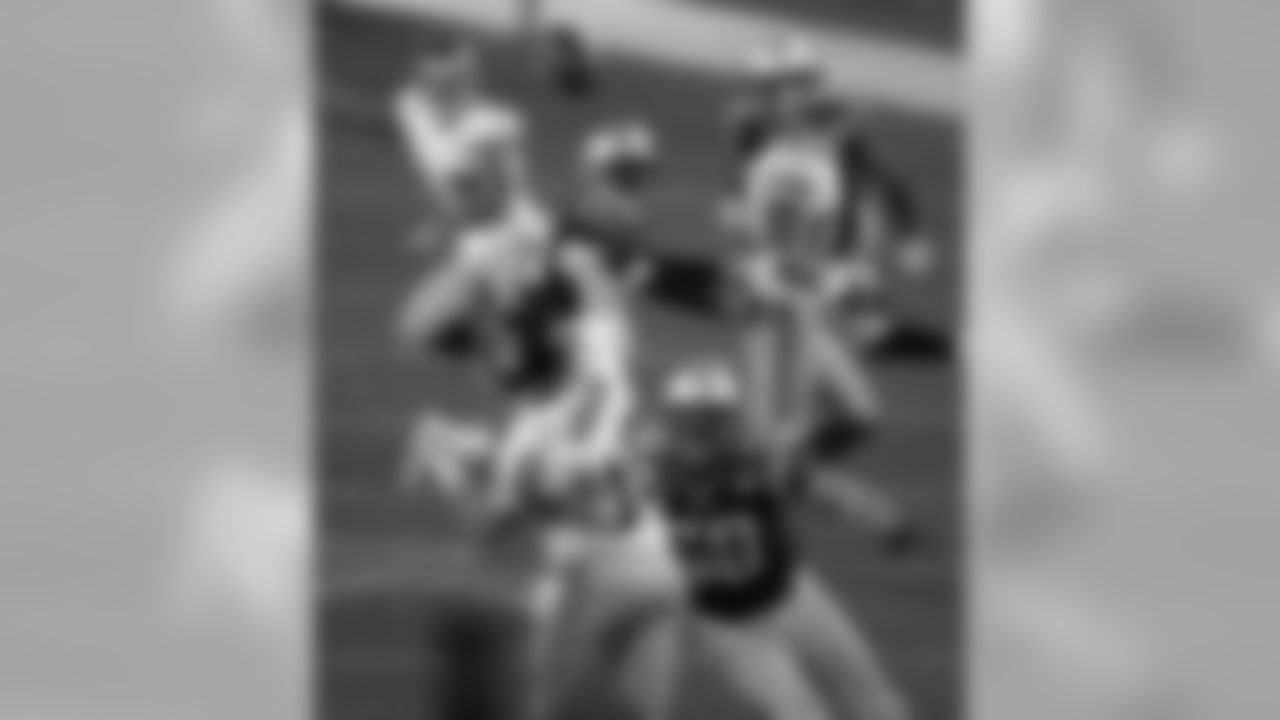
New York Giants quarterback Eli Manning releases a pass as New England Patriots linebacker Mike Vrabel (50) closes in during the fourth quarter of the Super Bowl XLII football game at University of Phoenix Stadium on Sunday, Feb. 3, 2008, in Glendale, Ariz. The Giants won 17-14. (AP Photo/Ross D. Franklin)
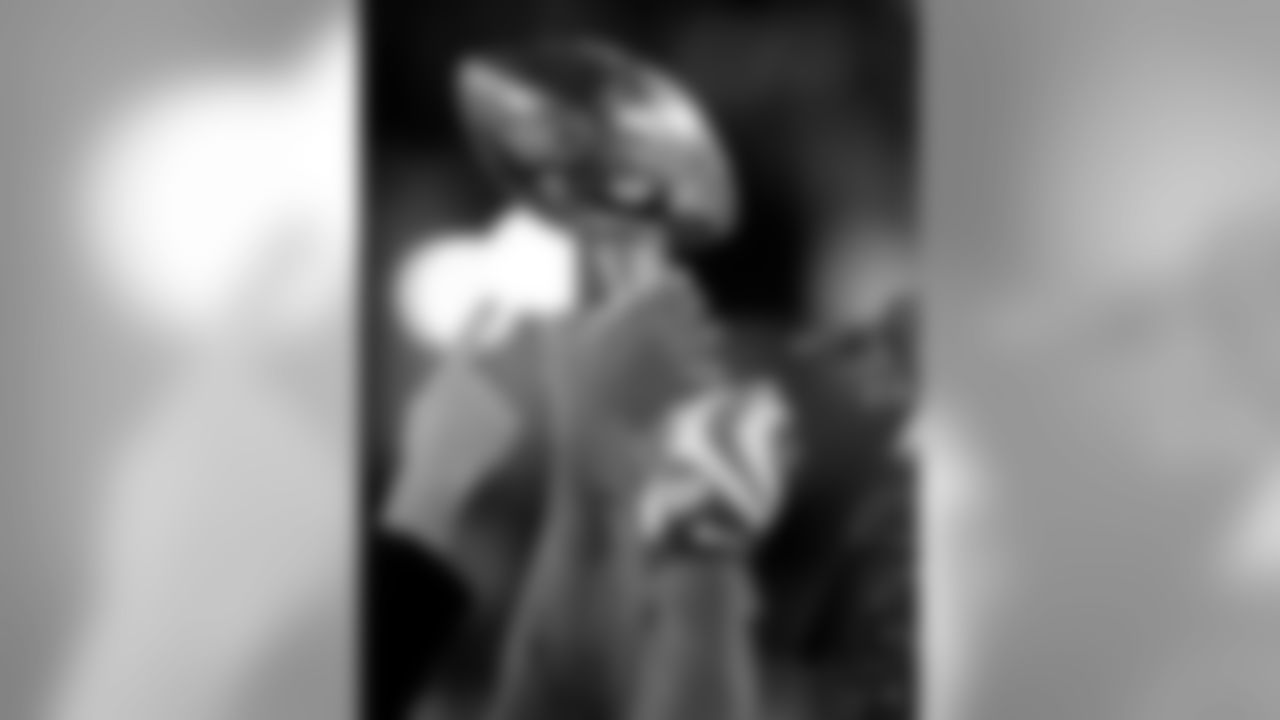
New York Giants players hold up the Vince Lombardi trophy after the Giants beat the New England Patriots 17-14 to win the Super Bowl XLII football game in Glendale, Ariz, on Sunday, Feb. 3, 2008. (AP Photo/Eric Gay)
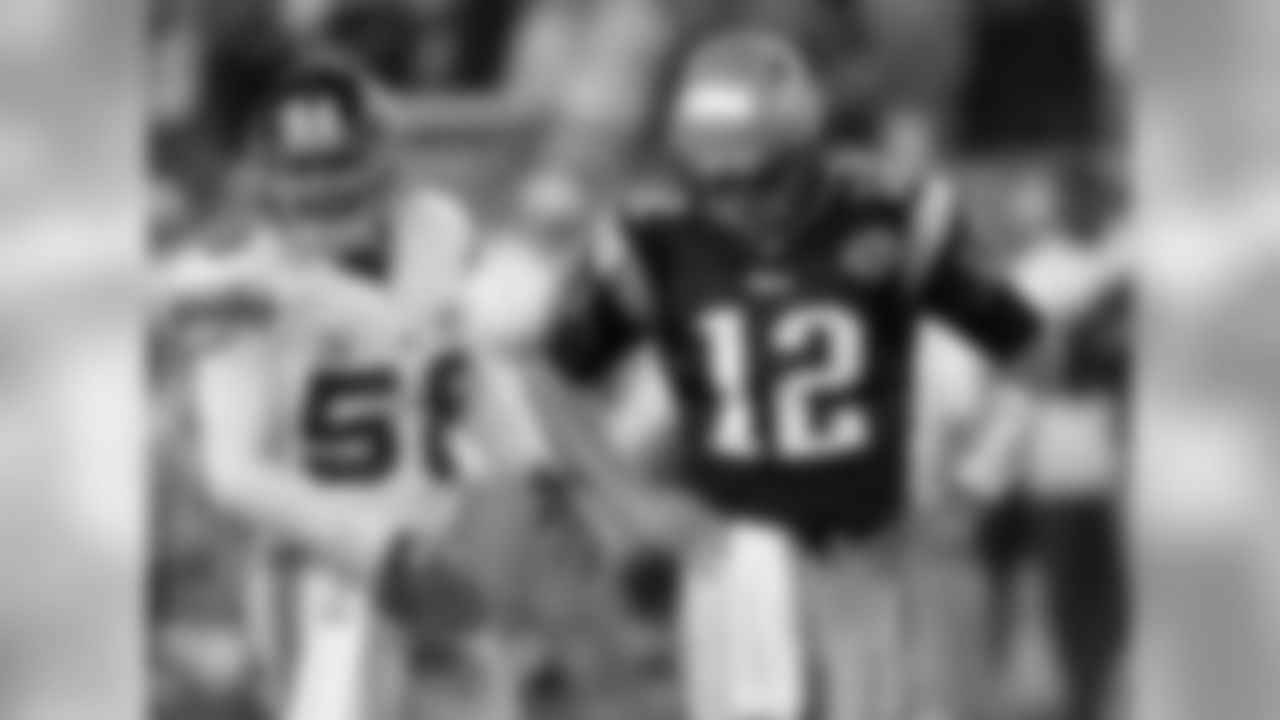
New England Patriots quarterback Tom Brady (12) stands next to New York Giants linebacker Antonio Pierce (58) during the Super Bowl XLII football game at University of Phoenix Stadium on Sunday, Feb. 3, 2008 in Glendale, Ariz. (AP Photo/Stephan Savoia)

New York Giants defensive end Michael Strahan (92) celebrates after the Giants beat the New England Patriots 17-14 to win the Super Bowl XLII football game in Glendale, Ariz, on Sunday, Feb. 3, 2008. (AP Photo/Matt Slocum)

New York Giants quarterback Eli Manning celebrates after the Giants beat the New England Patriots 17-14 in the Super Bowl XLII football game on Sunday, Feb. 3, 2008, in Glendale, Ariz. (AP Photo/Matt Slocum)

New York Giants quarterback Eli Manning celebrates after the Giants beat the New England Patriots 17-14 in the Super Bowl XLII football game on Sunday, Feb. 3, 2008, in Glendale, Ariz. (AP Photo/Matt Slocum)

New York Giants fans cheer for their team before the Super Bowl XLII football game against the New England Patriots at University of Phoenix Stadium on Sunday, Feb. 3, 2008 in Glendale, Ariz. (AP Photo/Julie Jacobson)
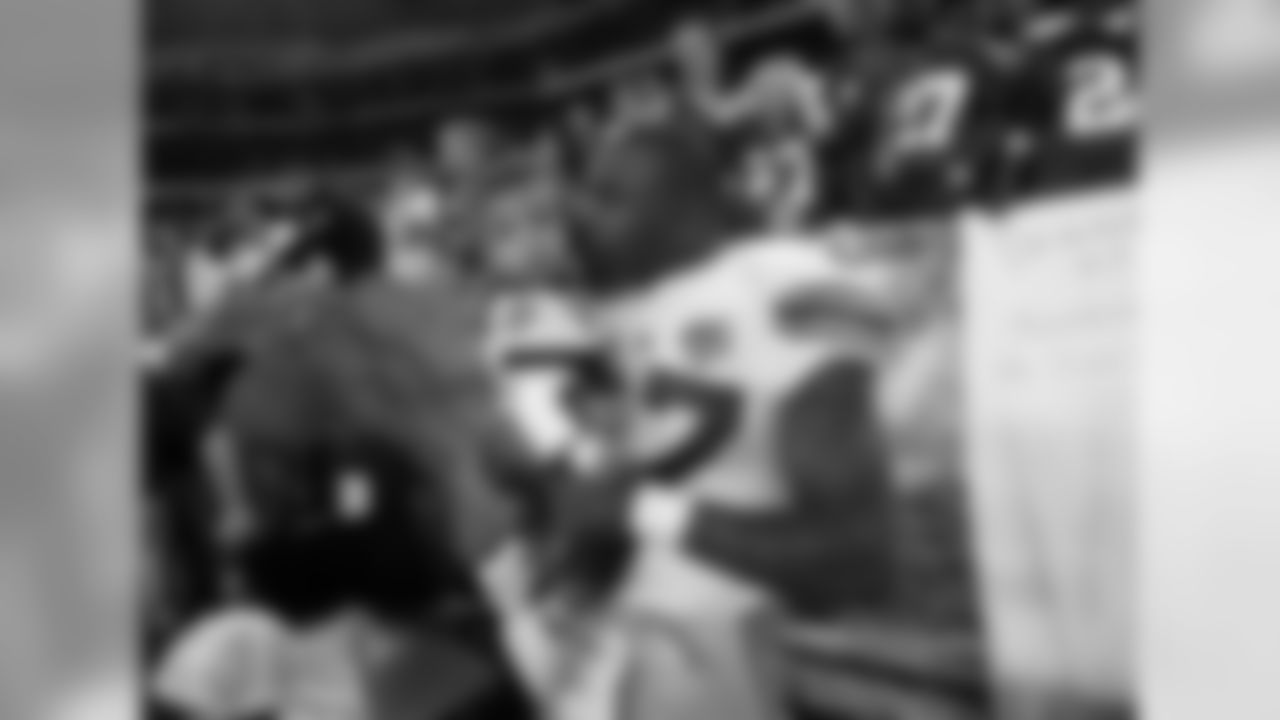
New York Giants running back Brandon Jacobs (27) celebrates after the Giants beat the New England Patriots 17-14 during the Super Bowl XLII football game at University of Phoenix Stadium on Sunday, Feb. 3, 2008 in Glendale, Ariz. (AP Photo/Eric Gay)

New York Giants kicker Lawrence Tynes (9) and Giants head coach Tom Coughlin celebrate after the Giants beat the New England Patriots 17-14 in the Super Bowl XLII football game on Sunday, Feb. 3, 2008, in Glendale, Ariz. (AP Photo/David J. Phillip)
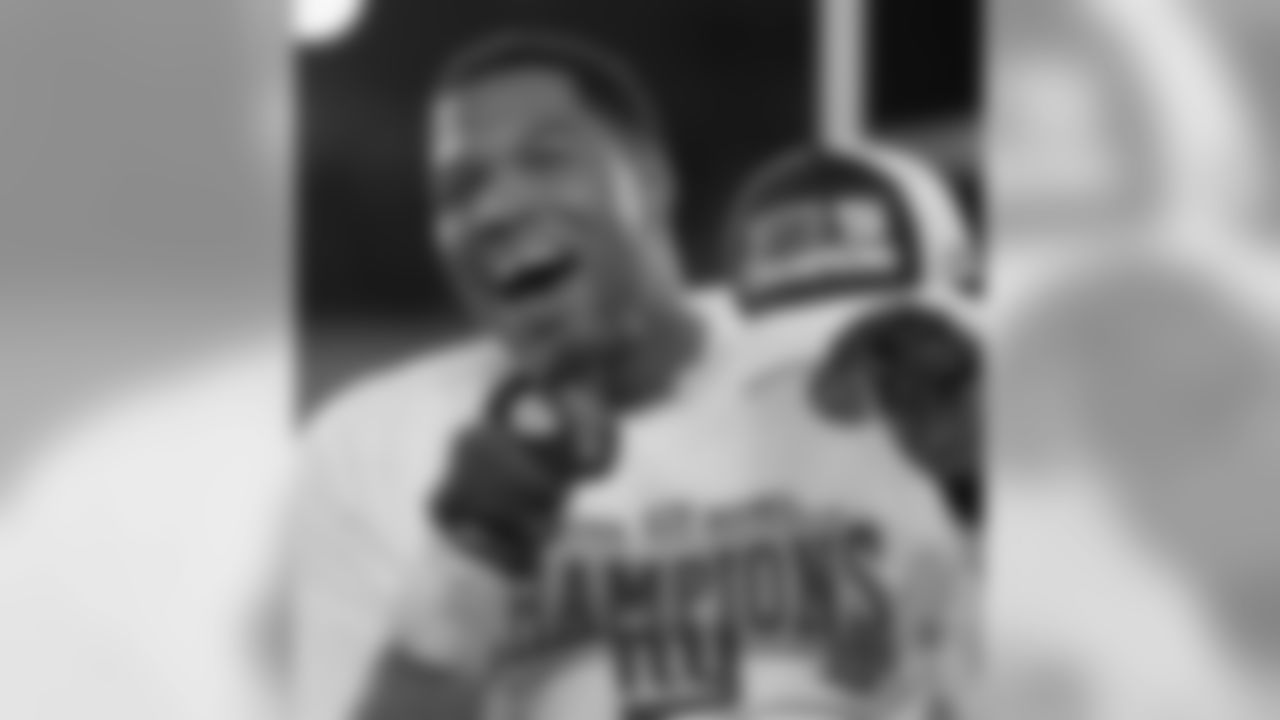
New York Giants defensive end Michael Strahan celebrates after the Giants beat the New England Patriots 17-14 in the Super Bowl XLII football game on Sunday, Feb. 3, 2008, in Glendale, Ariz.(AP Photo/David J. Phillip)

New York Giants' Lawrence Tynes (9) kicks a field goal during the first quarter against the New England Patriots in the Super Bowl XLII football game at University of Phoenix Stadium on Sunday, Feb. 3, 2008, in Glendale, Ariz. The Giants won 17-14. (AP Photo/Ross D. Franklin)
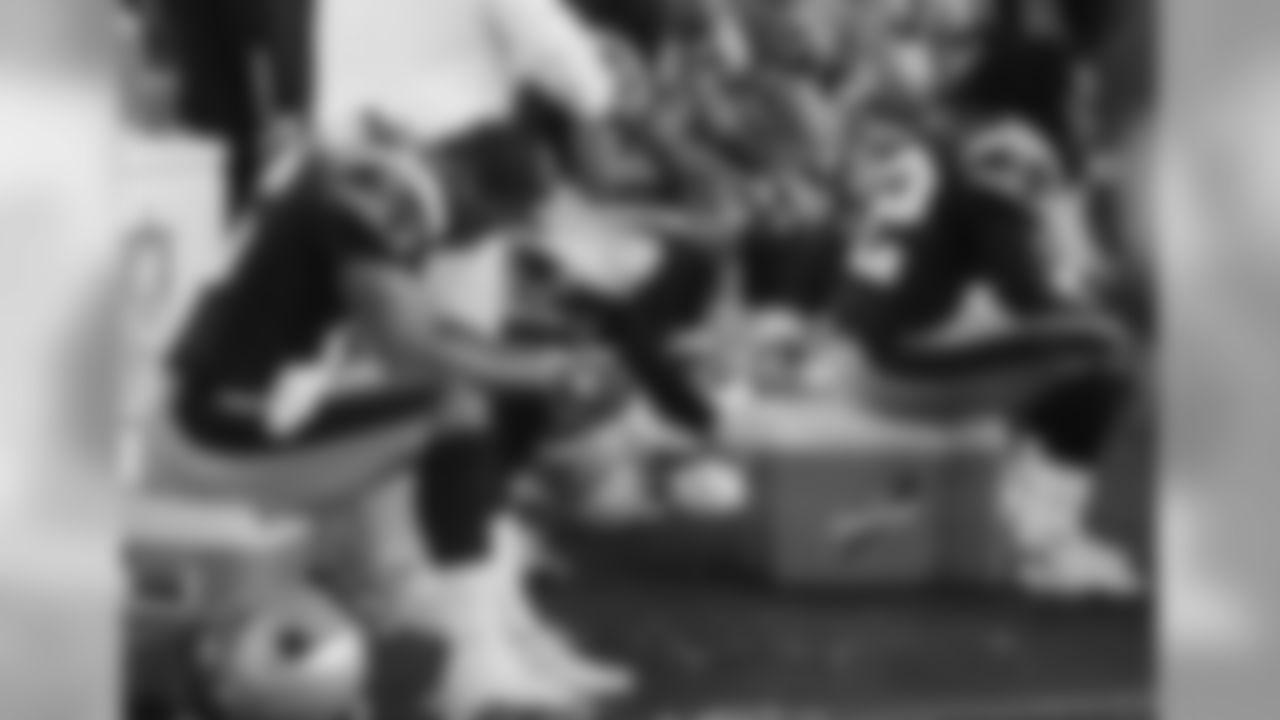
New England Patriots receiver Kelley Washington, left, sits on the bench with his teammates after the Patriots lost to the New York Giants 17-14 in the Super Bowl XLII football game on Sunday, Feb. 3, 2008, in Glendale, Ariz. (AP Photo/Stephan Savoia)

New York Giants quarterback Eli Manning holds the trophy for Most Valuable Player during a news conference on Monday, Feb. 4, 2008 in Phoenix. The Giants won the Super Bowl XLII football game by defeating the New England Patriots. (AP Photo/Morry Gash)
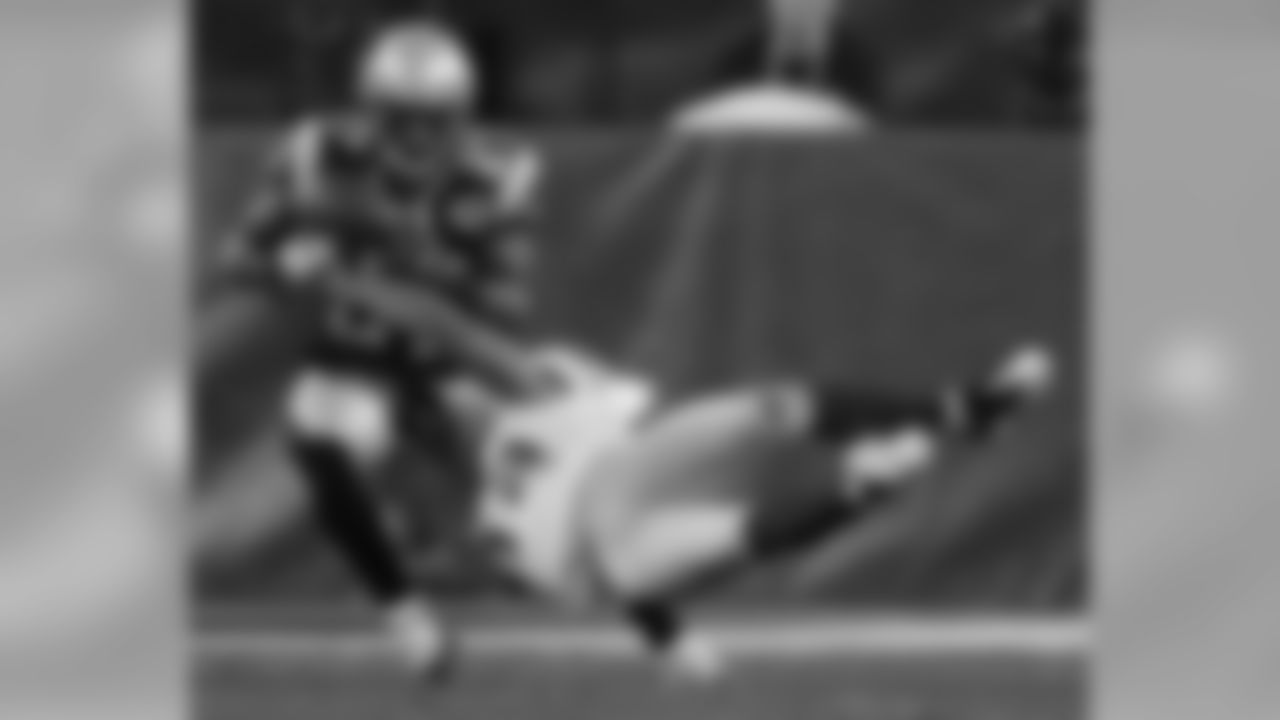
New England Patriots cornerback Ellis Hobbs III (27), left, intercepts a pass intended for New York Giants receiver Steve Smith (12) in the second quarter during the Super Bowl XLII football game at University of Phoenix Stadium on Sunday, Feb. 3, 2008 in Glendale, Ariz. (AP Photo/Paul Sancya)
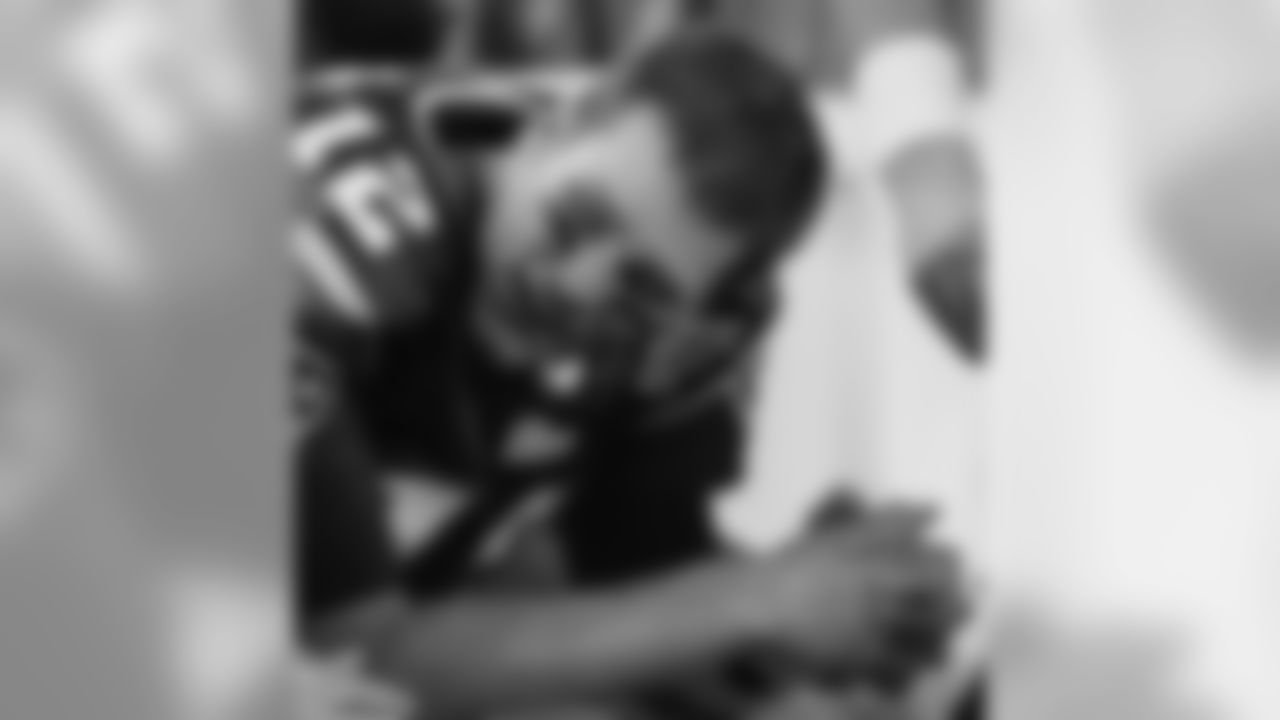
New England Patriots quarterback Tom Brady talks to his teammate while sitting on the bench during the third quarter of the Super Bowl XLII football game against the New York Giants at University of Phoenix Stadium on Sunday, Feb. 3, 2008 in Glendale, Ariz. (AP Photo/David J. Phillip)

New York Giants players hold up the Vince Lombardi trophy after the Giants beat the New England Patriots 17-14 to win the Super Bowl XLII football game in Glendale, Ariz, on Sunday, Feb. 3, 2008. (AP Photo/Eric Gay)
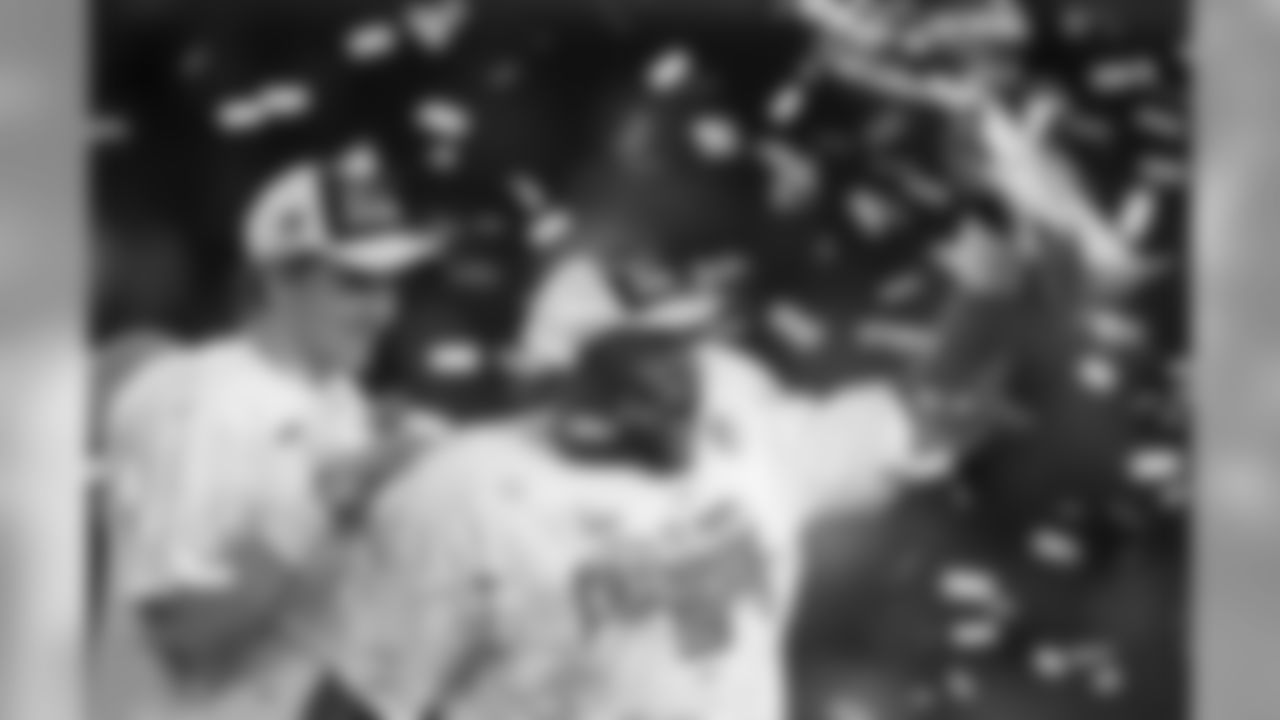
New York Giants quarterback Eli Manning, left, and Michael Strahan celebrate the Giants' 17-14 win over the New England Patriots in the Super Bowl XLII football game at University of Phoenix Stadium on Sunday, Feb. 3, 2008 in Glendale, Ariz. (AP Photo/Julie Jacobson)
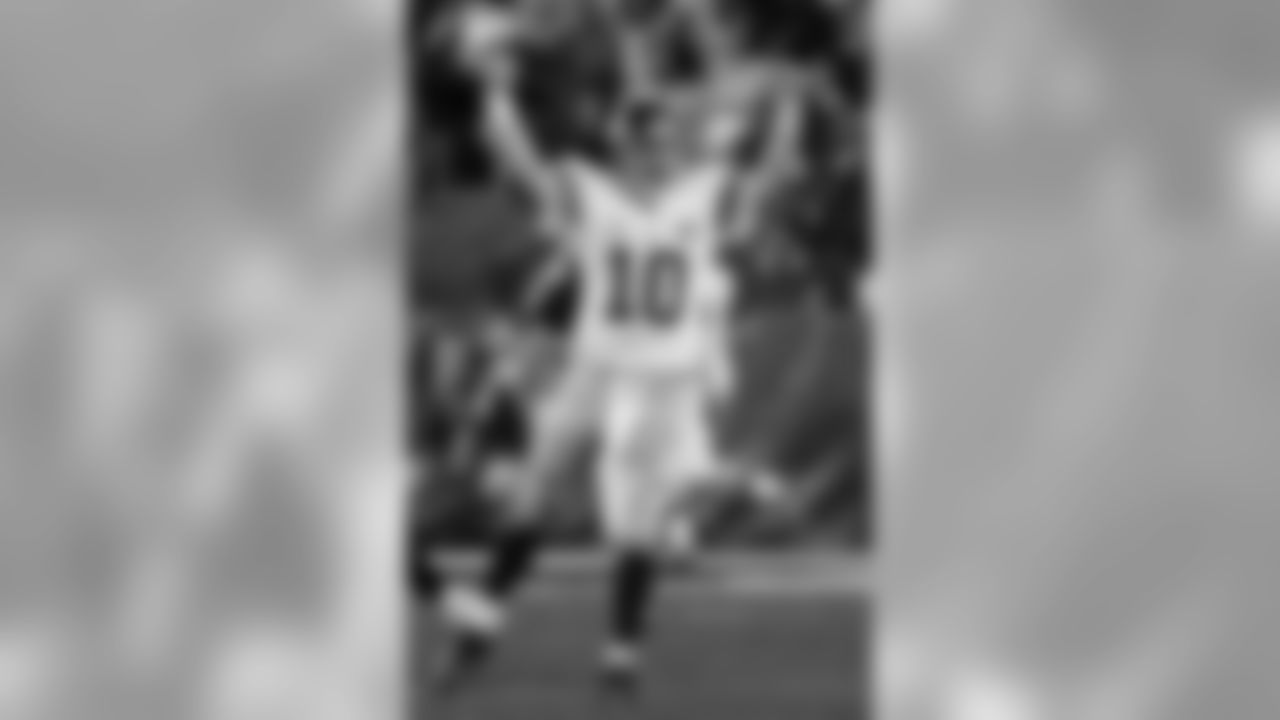
New York Giants quarterback Eli Manning (10) celebrates after his 13-yard touchdown pass to Plaxico Burress in the fourth quarter of the Super Bowl XLII football game against the New England Patriots at University of Phoenix Stadium on Sunday, Feb. 3, 2008 in Glendale, Ariz. (AP Photo/Julie Jacobson)
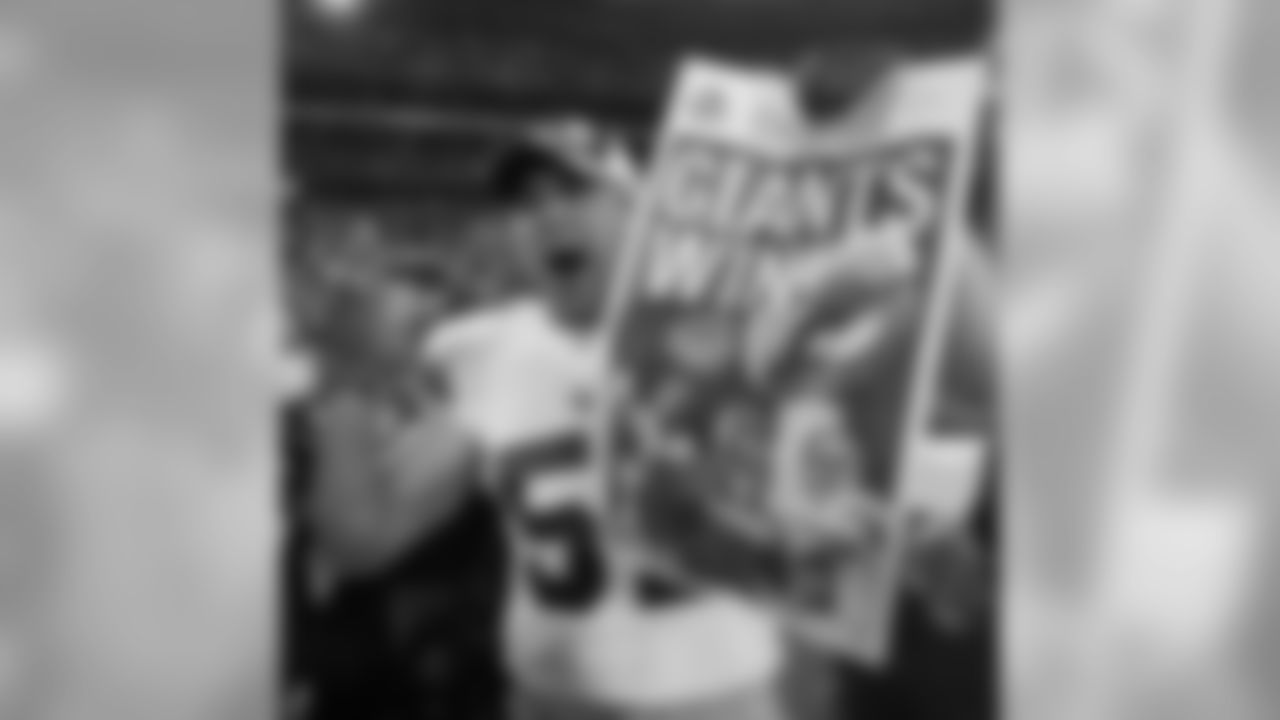
New York Giants linebacker Zak DeOssie holds up a newspaper after the Giants beat the New England Patriots 17-14 in the Super Bowl XLII football game on Sunday, Feb. 3, 2008, in Glendale, Ariz. (AP Photo/David J. Phillip)
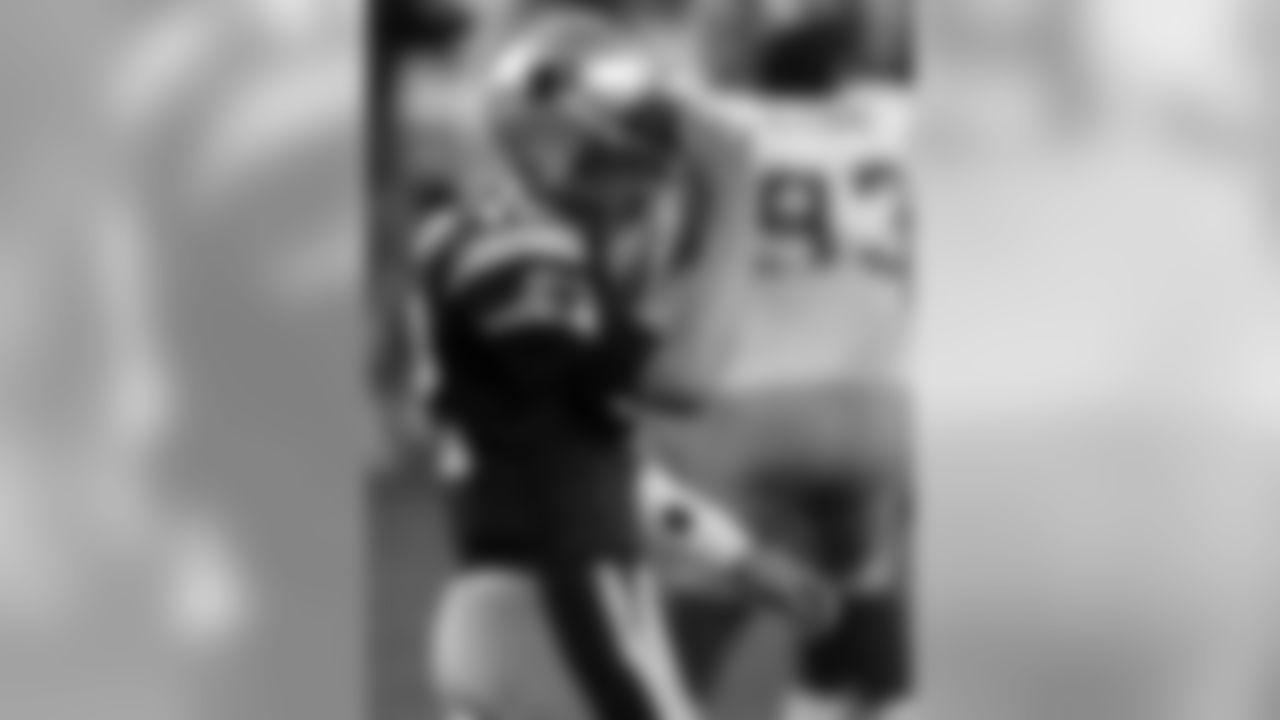
New England Patriots quarterback Tom Brady walks off the field after the New York Giants beat the Patriots 17-14 during the Super Bowl XLII football game at University of Phoenix Stadium on Sunday, Feb. 3, 2008 in Glendale, Ariz. (AP Photo/Matt Slocum)
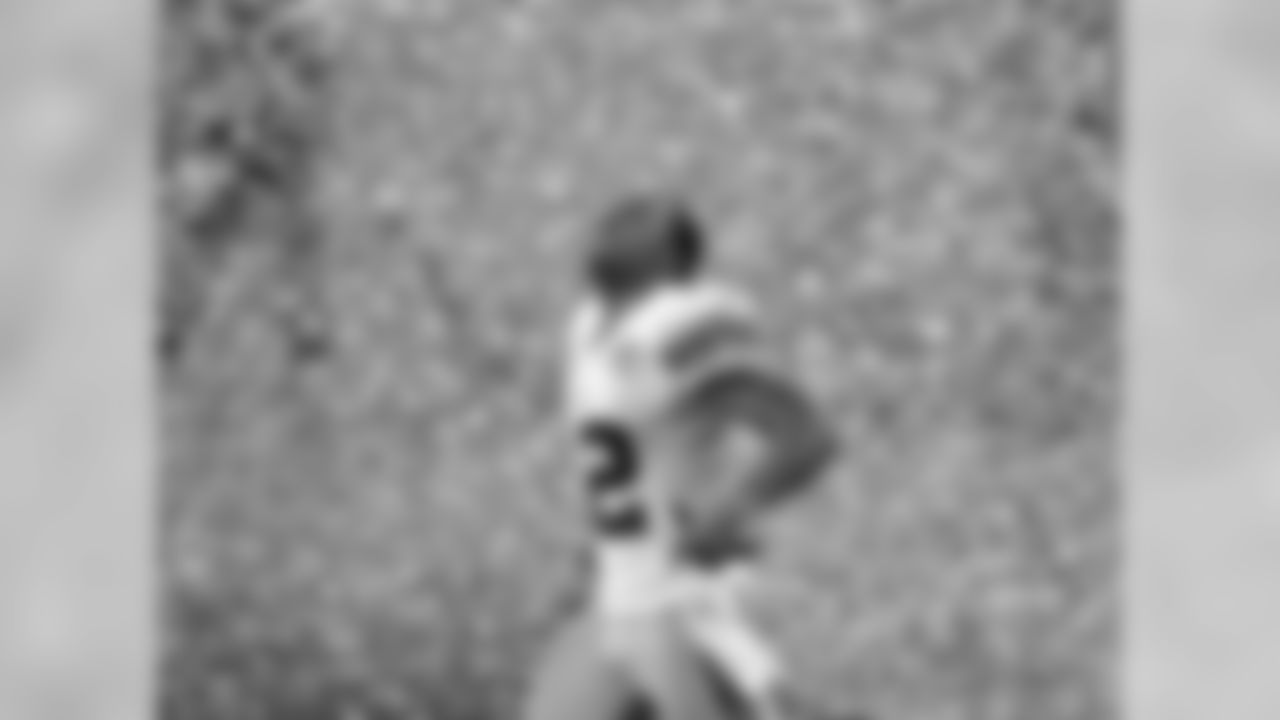
New York Giants receiver Steve Smith (12) celebrates after the Giants beat the New England Patriots 17-14 in the Super Bowl XLII football game on Sunday, Feb. 3, 2008, in Glendale, Ariz. (AP Photo/Matt Slocum)
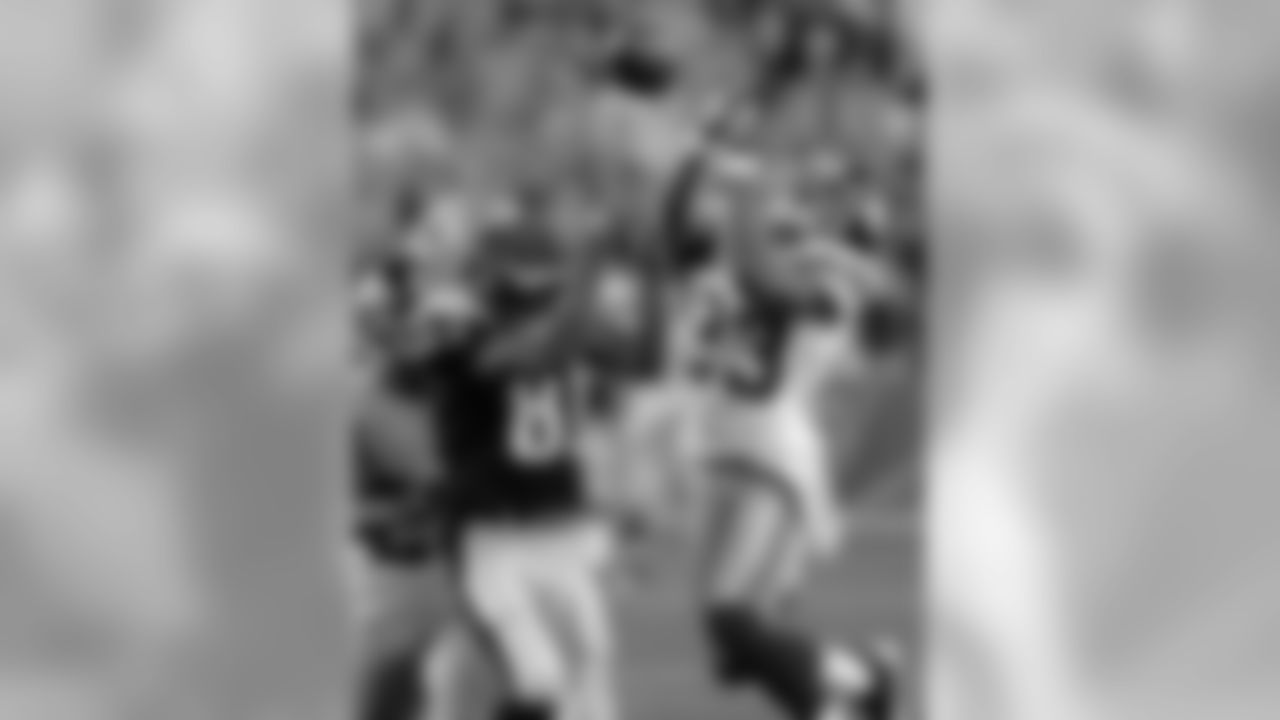
New England Patriots receiver Randy Moss (81) and New York Giants cornerback Corey Webster (23) go after the ball in the final minute of the Super Bowl XLII football game at University of Phoenix Stadium on Sunday, Feb. 3, 2008 in Glendale, Ariz. (AP Photo/Eric Gay)

New York Giants quarterback Eli Manning holds the Vince Lombardi Trophy as he celebrates after the Giants beat the New England Patriots 17-14 in the Super Bowl XLII football game on Sunday, Feb. 3, 2008, in Glendale, Ariz. (AP Photo/Stephan Savoia)
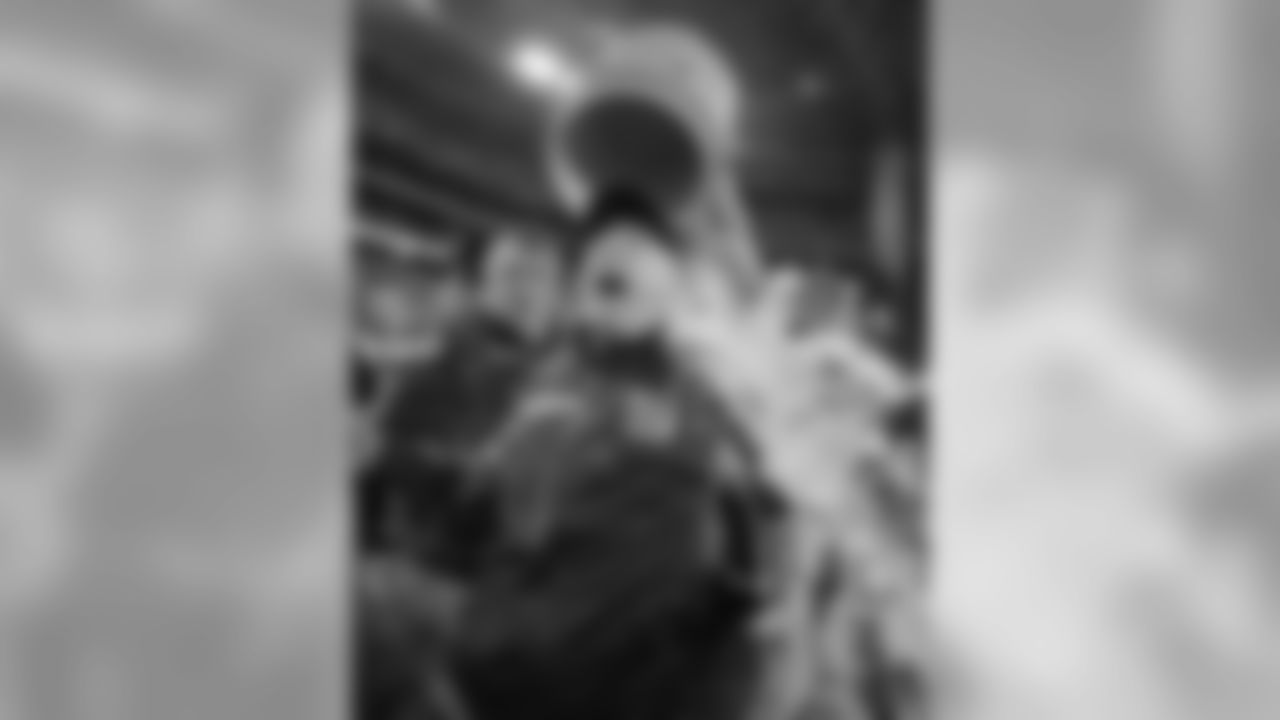
New York Giants head coach Tom Coughlin is doused by his player Madison Hedgecock after the Giants beat the New England Patriots 17-14 in the Super Bowl XLII football game on Sunday, Feb. 3, 2008, in Glendale, Ariz. (AP Photo/David J. Phillip)
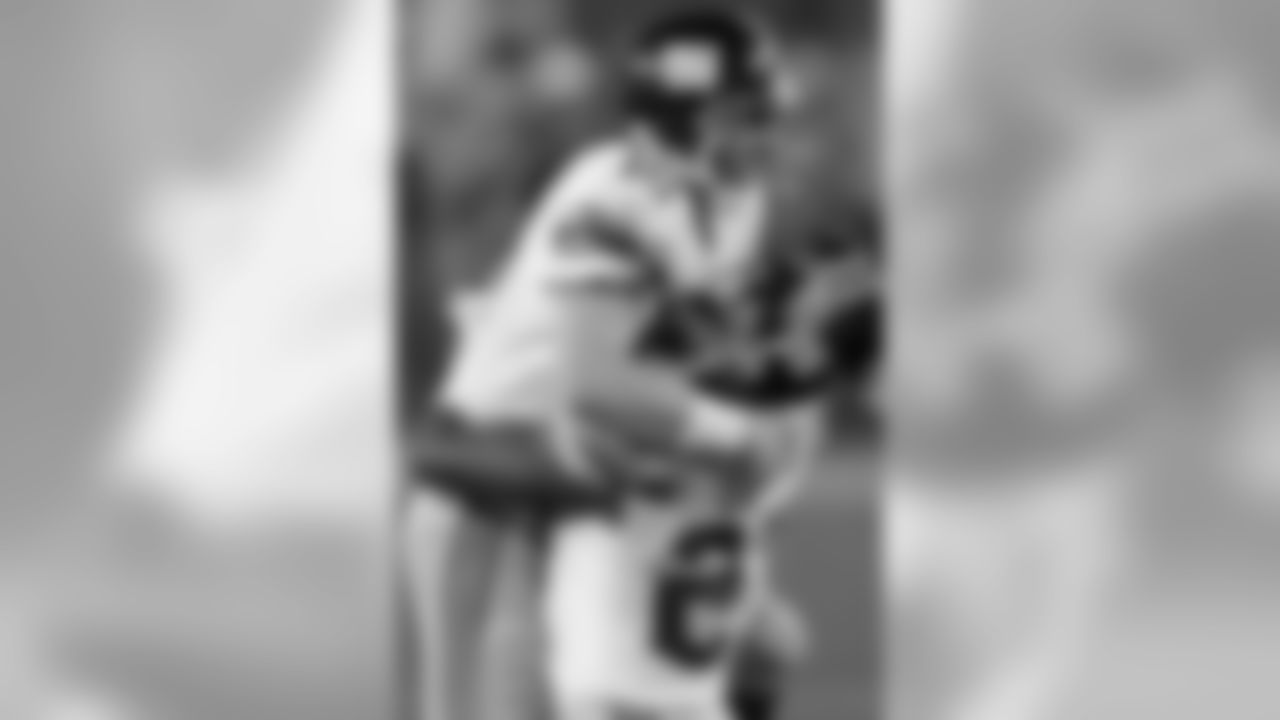
New York Giants' Eli Manning (10) and Brandon Jacobs celebrate after Manning threw the game-winning touchdown pass during the fourth quarter of the Super Bowl XLII football game against the New England Patriots at University of Phoenix Stadium on Sunday, Feb. 3, 2008 in Glendale, Ariz. The Giants won 17-14. (AP Photo/Elaine Thompson)

New York Giants defensive end Michael Strahan holds the Vince Lombardi trophy after the Giants beat the New England Patriots 17-14 to win the Super Bowl XLII football game in Glendale, Ariz, on Sunday, Feb. 3, 2008. (AP Photo/Eric Gay)
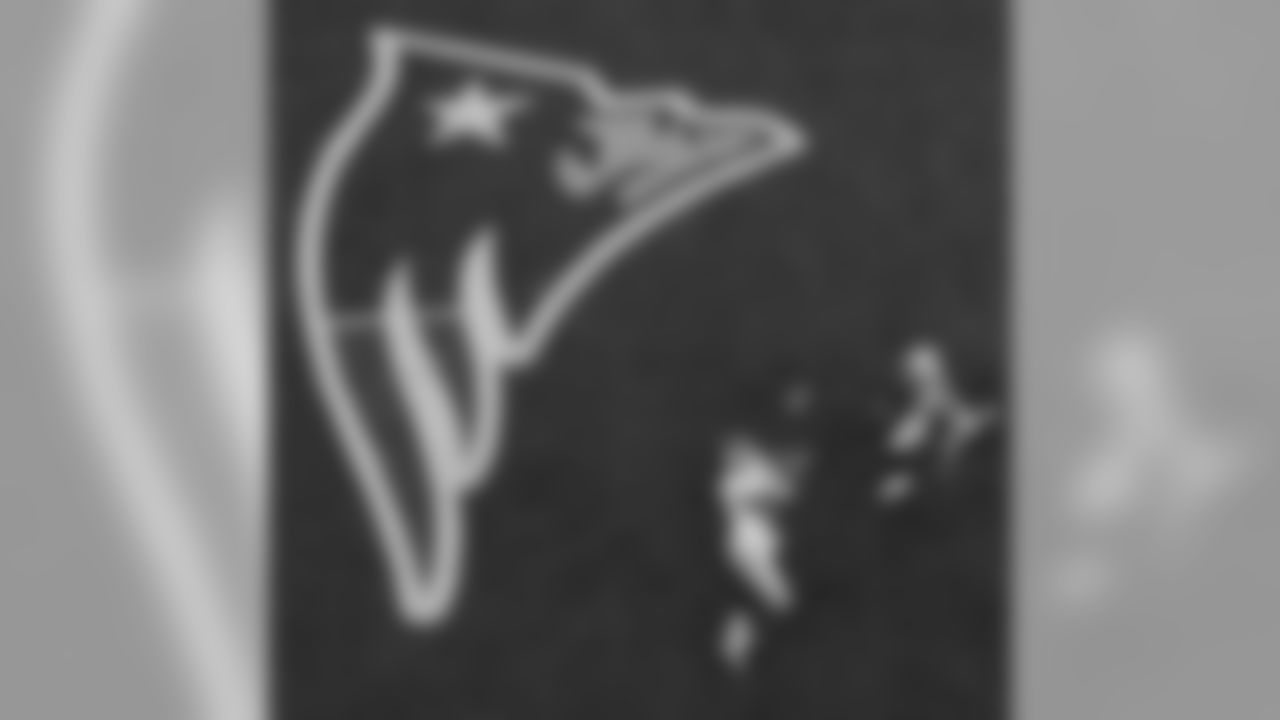
New York Giants' Plaxico Burress, left, catches the game-winning touchdown pass in front of New England Patriots' Ellis Hobbs III during the final minute of the Super Bowl XLII football game at University of Phoenix Stadium on Sunday, Feb. 3, 2008 in Glendale, Ariz. (AP Photo/David J. Phillip)
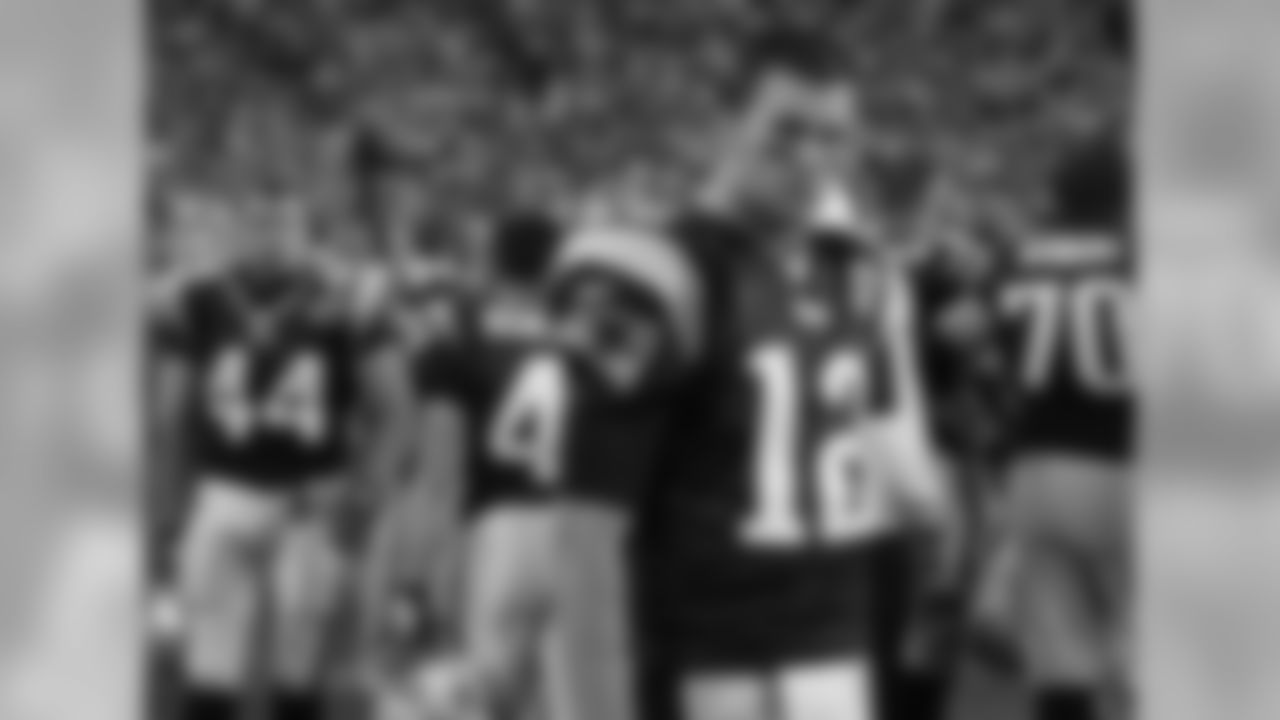
New England Patriots quarterback Tom Brady (12) looks on during the fourth quarter of the Super Bowl XLII football game against the New York Giants at University of Phoenix Stadium on Sunday, Feb. 3, 2008 in Glendale, Ariz. (AP Photo/Stephan Savoia)

New York Giants receiver Plaxico Burress celebrates after the Giants beat the New England Patriots 17-14 in the Super Bowl XLII football game on Sunday, Feb. 3, 2008, in Glendale, Ariz. (AP Photo/Gene Puskar)

New York Giants quarterback Eli Manning celebrates with the Vince Lombardi Trophy alongside Giants head coach Tom Coughlin, right, and Terry Bradshaw after the Giants defeated the New England Patriots 17-14 in the Super Bowl XLII football game Sunday, Feb. 3, 2008 in Glendale, Ariz. (AP Photo/Chris O'Meara)
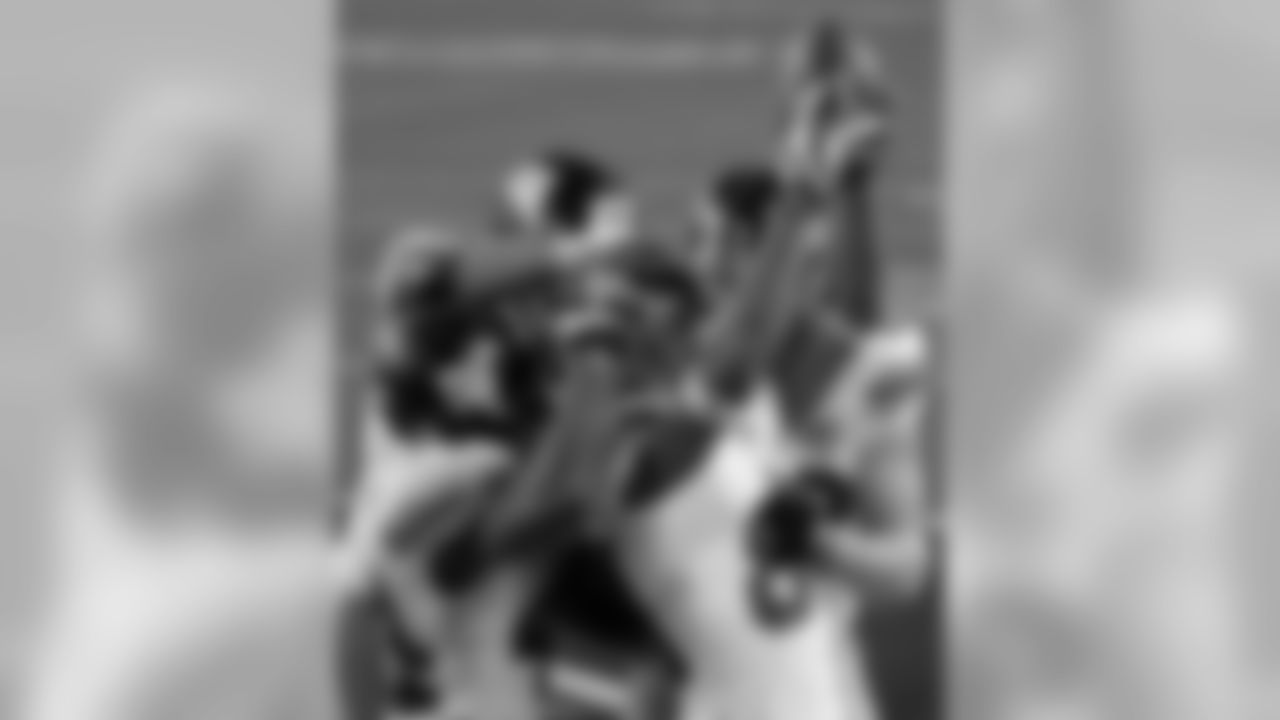
New York Giants receiver David Tyree, front right, celebrates with his teammates after scoring a touchdown against the New England Patriots during the fourth quarter of the Super Bowl XLII football game at University of Phoenix Stadium on Sunday, Feb. 3, 2008 in Glendale, Ariz. (AP Photo/Matt Slocum)
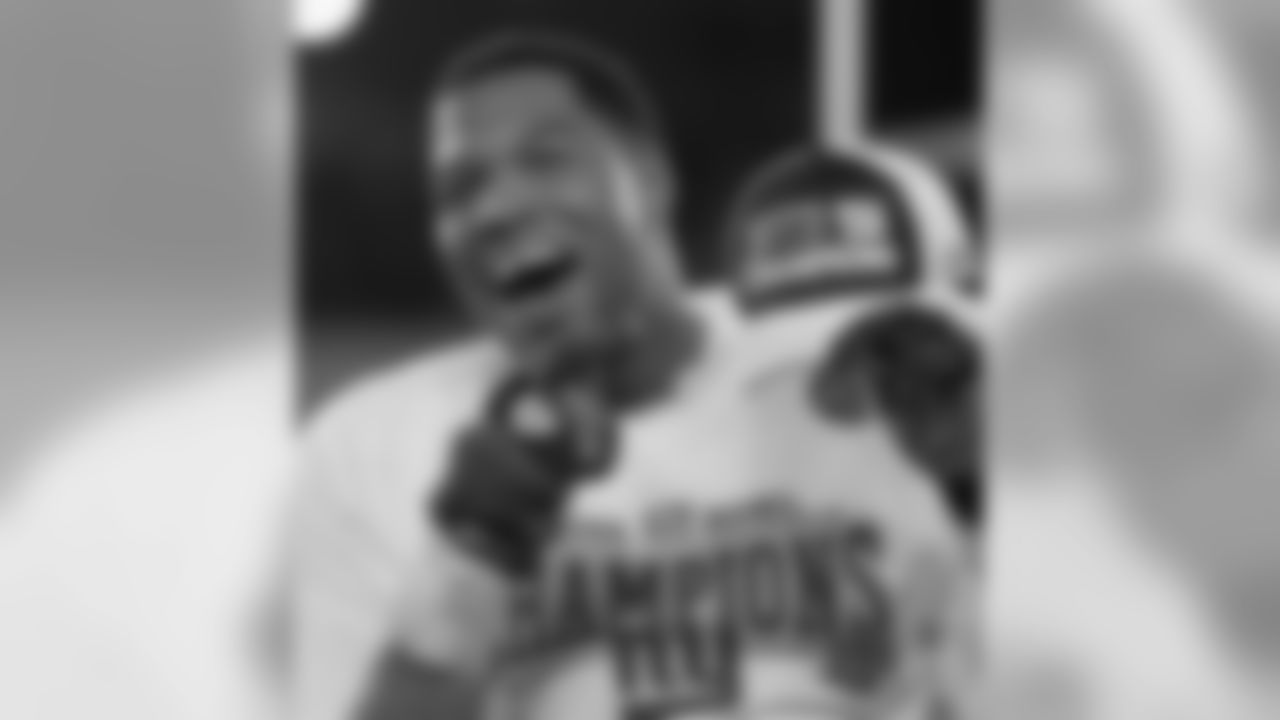
New York Giants defensive end Michael Strahan celebrates after the Giants beat the New England Patriots 17-14 in the Super Bowl XLII football game on Sunday, Feb. 3, 2008, in Glendale, Ariz.(AP Photo/David J. Phillip)

New York Giants defensive end Michael Strahan kisses the Vince Lombardi Trophy after defeating the New England Patriots 17-14 to win Super Bowl XLII football game at University of Phoenix Stadium on Sunday, Feb. 3, 2008 in Glendale, Ariz. (AP Photo/Gene Puskar)
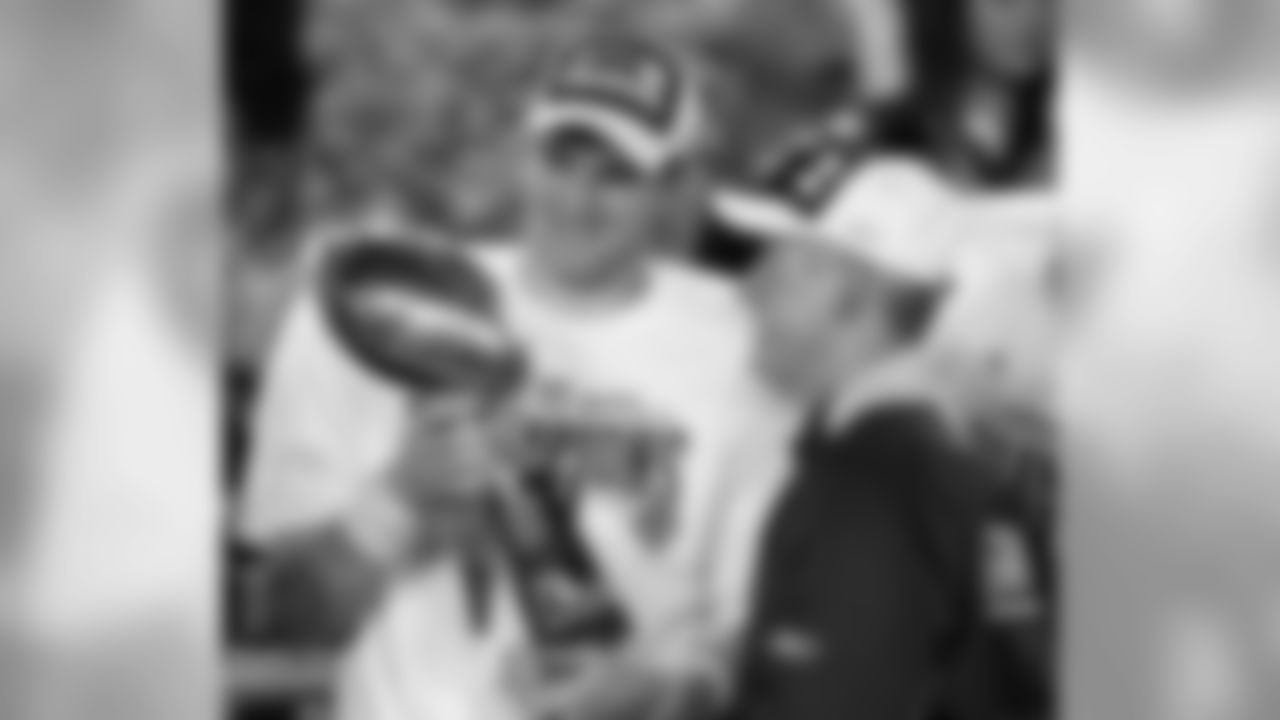
New York Giants quarterback Eli Manning, left, and his coach Tom Coughlin look at the Vince Lombardi Trophy as they celebrate after the Giants beat the New England Patriots 17-14 in the Super Bowl XLII football game on Sunday, Feb. 3, 2008, in Glendale, Ariz.(AP Photo/Charlie Riedel)

RETRANSMISSION FOR ALTERNATE CROP New York Giants quarterback Eli Manning (10) celebrates after his 13-yard touchdown pass to Plaxico Burress in the fourth quarter of the Super Bowl XLII football game against the New England Patriots at University of Phoenix Stadium on Sunday, Feb. 3, 2008 in Glendale, Ariz. (AP Photo/Julie Jacobson)
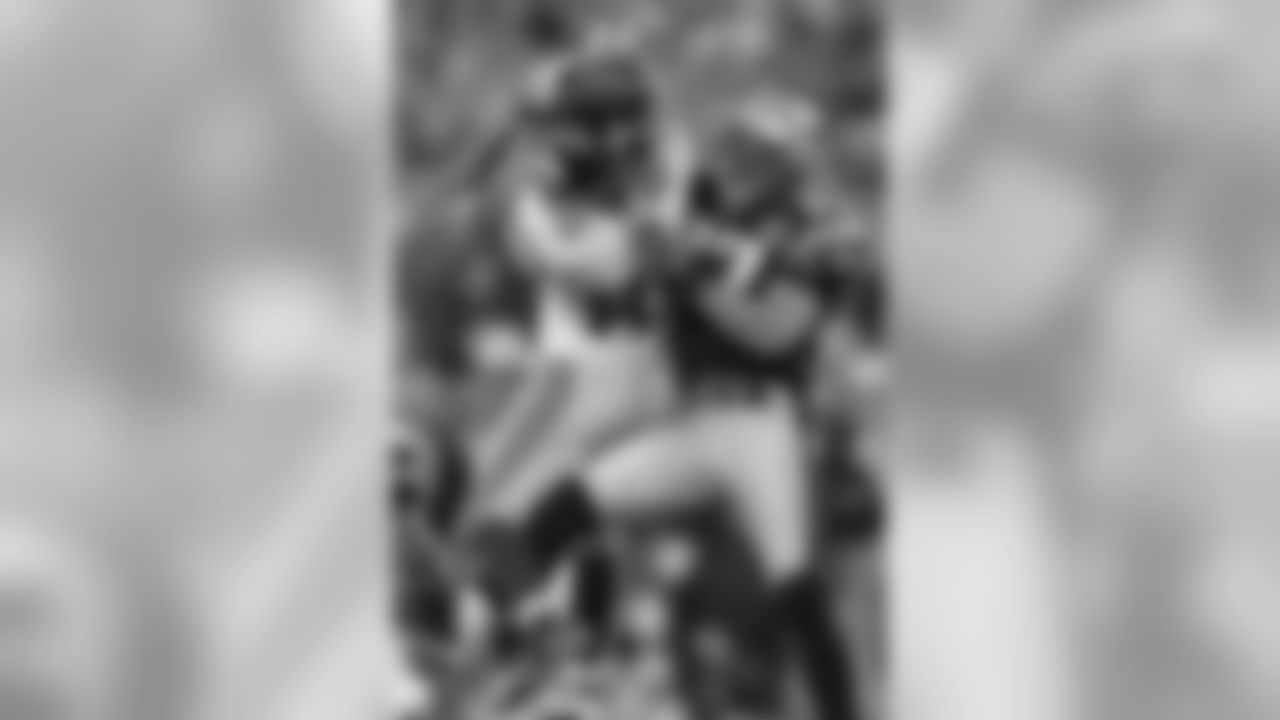
New York Giants receiver David Tyree (85) catches a 32-yard pass in the clutches of New England Patriots safety Rodney Harrison (37) during the fourth quarter of the Super Bowl XLII football game at University of Phoenix Stadium on Sunday, Feb. 3, 2008 in Glendale, Ariz. (AP Photo/Gene Puskar)
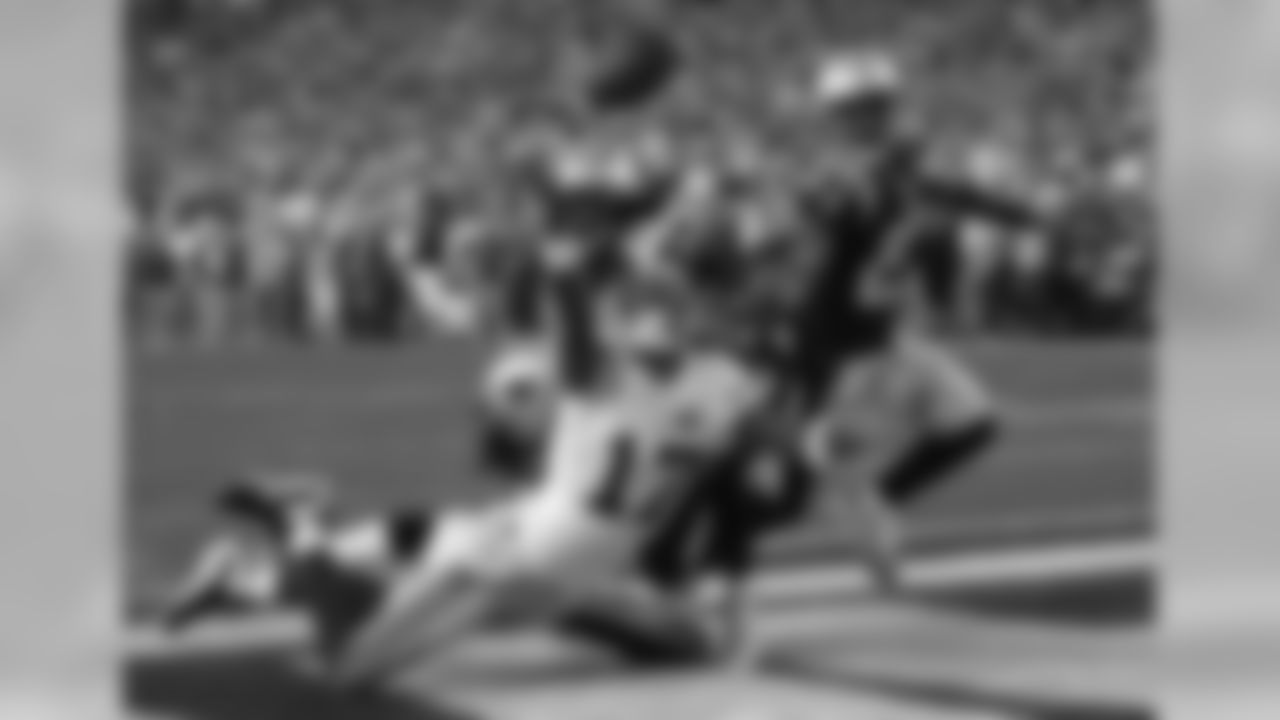
New York Giants receiver Plaxico Burress (17) fails to catch a pass in the end zone while under pressure from New England Patriots defenders Ellis Hobbs III, right, Brandon Meriweather, (31) and Asante Samuel in the third quarter during the Super Bowl XLII football game at University of Phoenix Stadium on Sunday, Feb. 3, 2008 in Glendale, Ariz. (AP Photo/David Duprey)
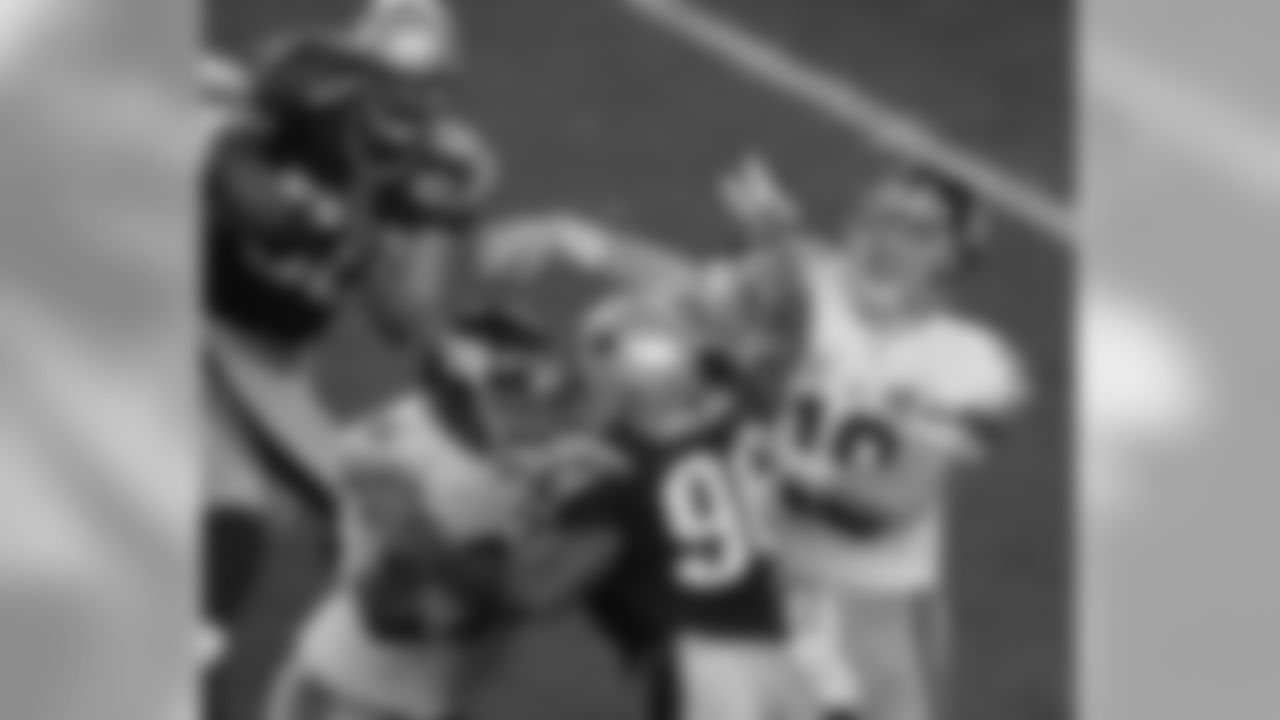
New York Giants quarterback Eli Manning (10) throws a pass as his teamate David Diehl (66) holds off New England Patriots linebacker Adalius Thomas (96) during the fourth quarter of the Super Bowl XLII football game at University of Phoenix Stadium on Sunday, Feb. 3, 2008 in Glendale, Ariz. (AP Photo/Charlie Riedel)
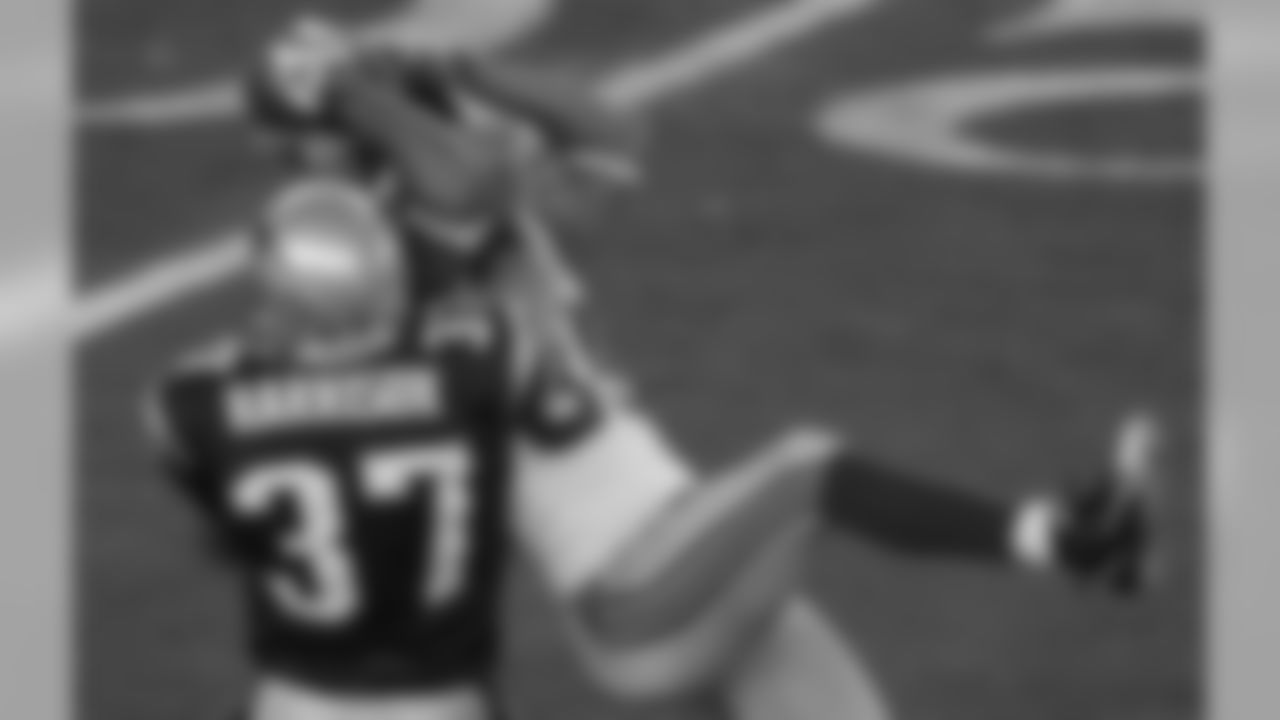
New York Giants receiver David Tyree, right, makes a catch against New England Patriots safety Rodney Harrison (37) during the fourth quarter of the Super Bowl XLII football game at University of Phoenix Stadium on Sunday, Feb. 3, 2008 in Glendale, Ariz. (AP Photo/Charlie Riedel)
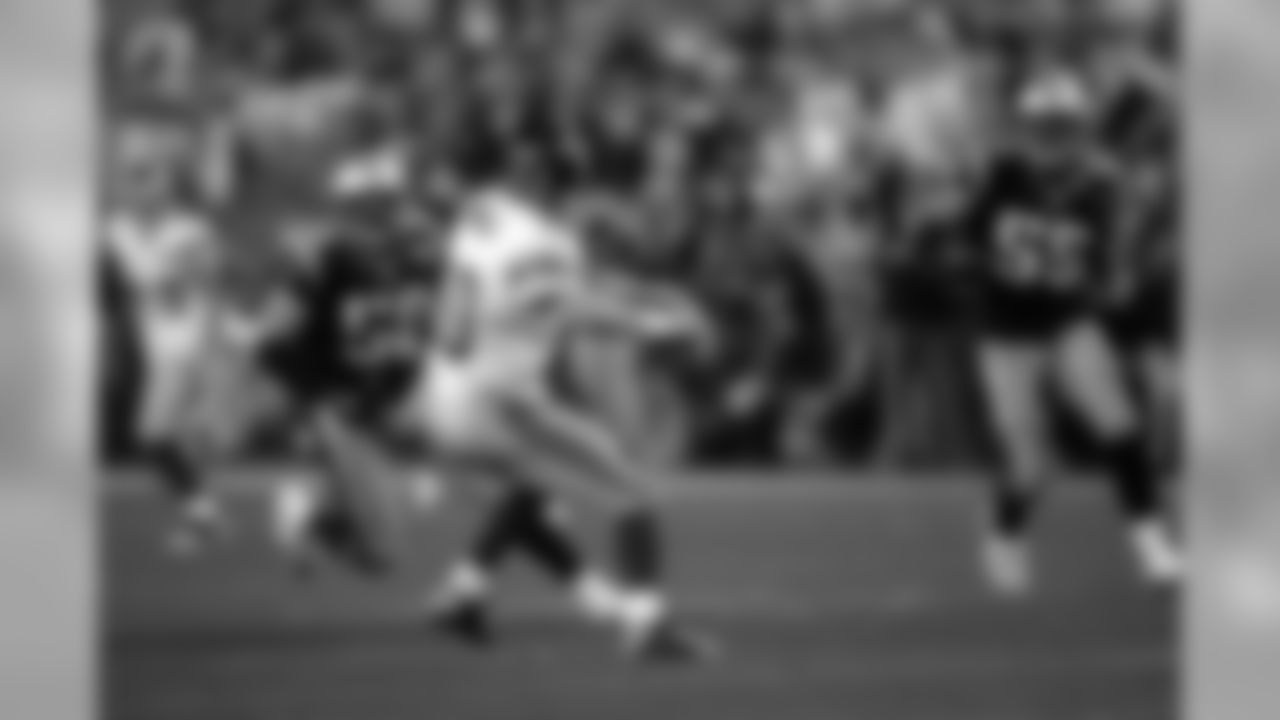
New York Giants QB Eli Manning #10 escapes pressure and sets to pass against the New England Patriots during the Super Bowl XLII football game at University of Phoenix Stadium on Sunday, Feb. 3, 2008 in Glendale, Ariz. Manning completed a miracle 32-yard pass to David Tyree on the play to set up their winning td. (AP Photo/David Duprey)
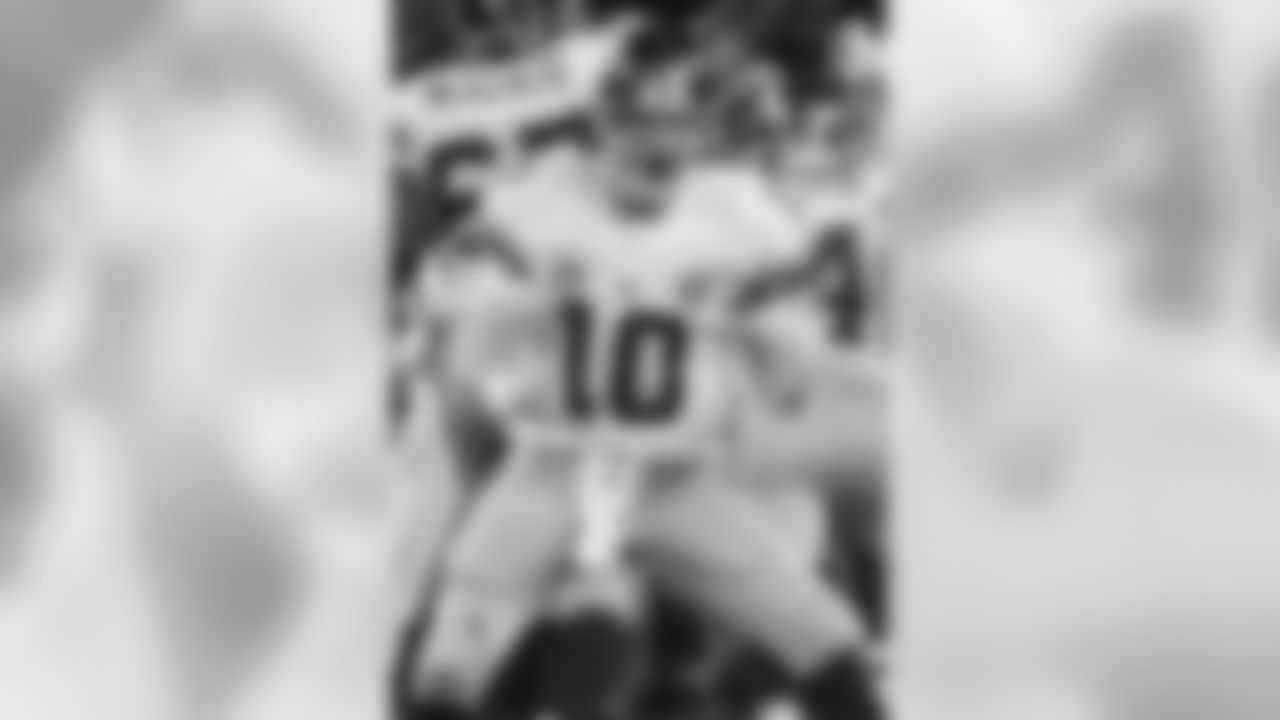
New York Giants quarterback Eli Manning celebrates his 5-yard touchdown pass to David Tyree during the fourth quarter of the Super Bowl XLII football game against the New England Patriots at University of Phoenix Stadium on Sunday, Feb. 3, 2008 in Glendale, Ariz. (AP Photo/Julie Jacobson)
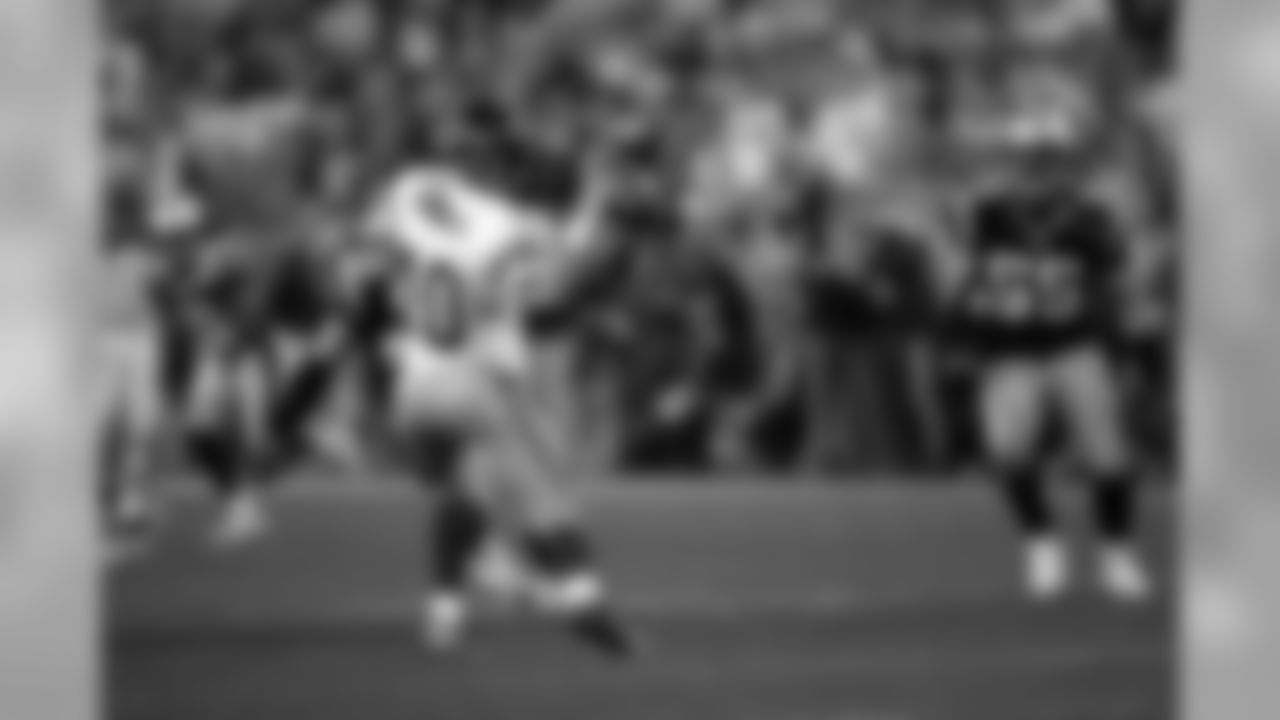
New York Giants QB Eli Manning #10 escapes pressure and passes downfield against the New England Patriots during the Super Bowl XLII football game at University of Phoenix Stadium on Sunday, Feb. 3, 2008 in Glendale, Ariz. Manning completed a miracle 32-yard pass to David Tyree on the play to set up their winning td. (AP Photo/David Duprey)

New York Giants defensive end Osi Umenyiora (72) pressures New England Patriots quarterback Tom Brady in the third quarter during the Super Bowl XLII football game at University of Phoenix Stadium on Sunday, Feb. 3, 2008 in Glendale, Ariz. (AP Photo/David J. Phillip)
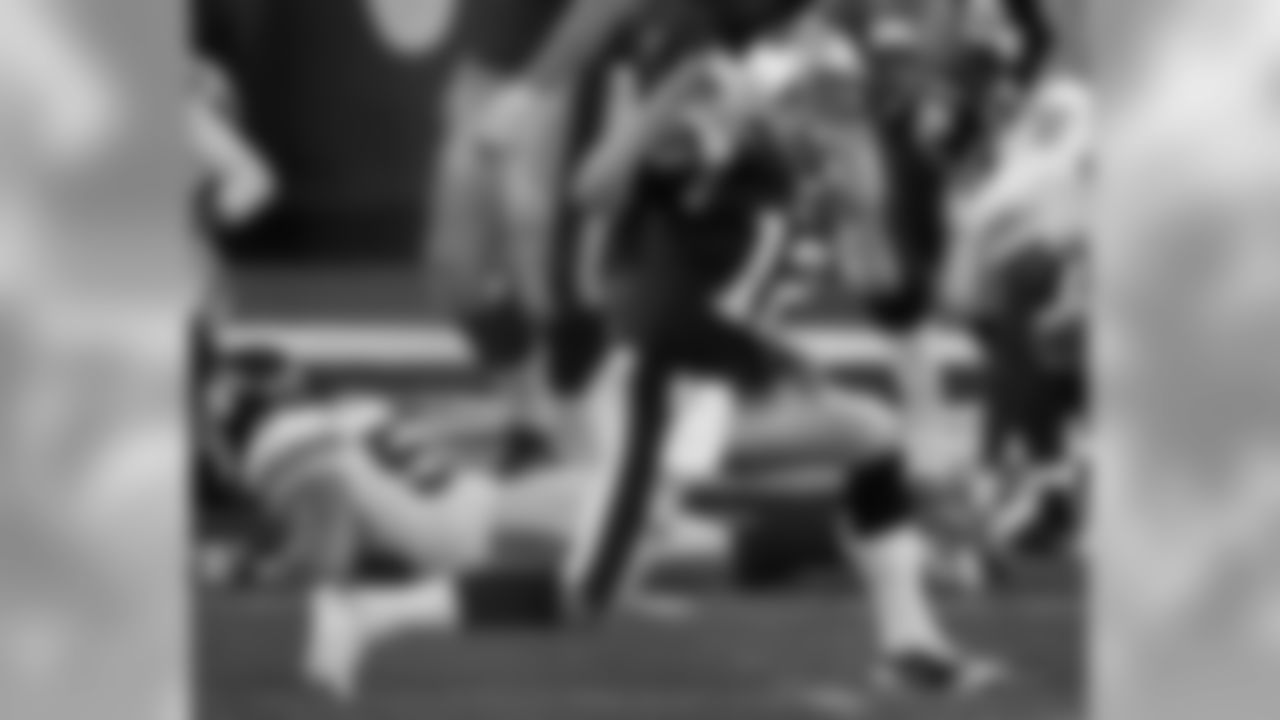
New England Patriots quarterback Tom Brady (12) celebrates a touchdown by running back Laurence Maroney during the second quarter of the Super Bowl XLII football game against the New York Giants at University of Phoenix Stadium on Sunday, Feb. 3, 2008 in Glendale, Ariz. (AP Photo/Ross D. Franklin)
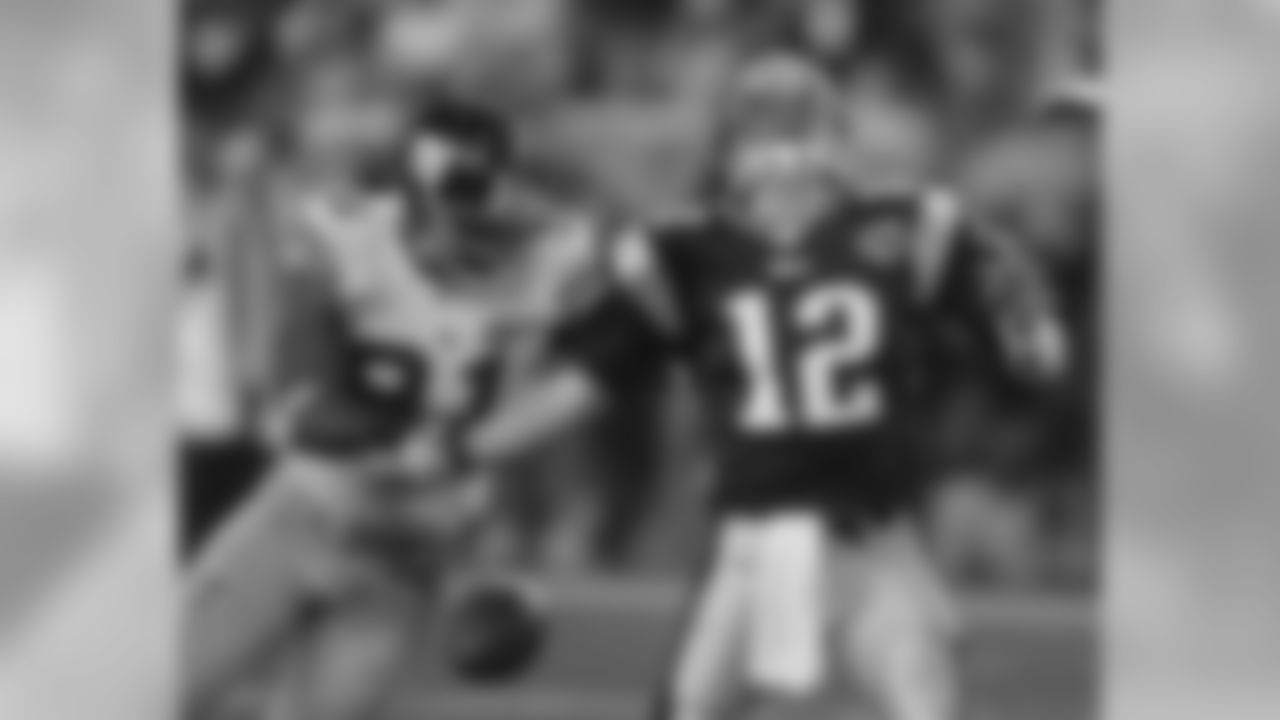
New York Giants defensive end Justin Tuck (91) strips the football from New England Patriots quarterback Tom Brady (12) during the second quarter of the Super Bowl XLII football game at University of Phoenix Stadium on Sunday, Feb. 3, 2008 in Glendale, Ariz. (AP Photo/Chris O'Meara)
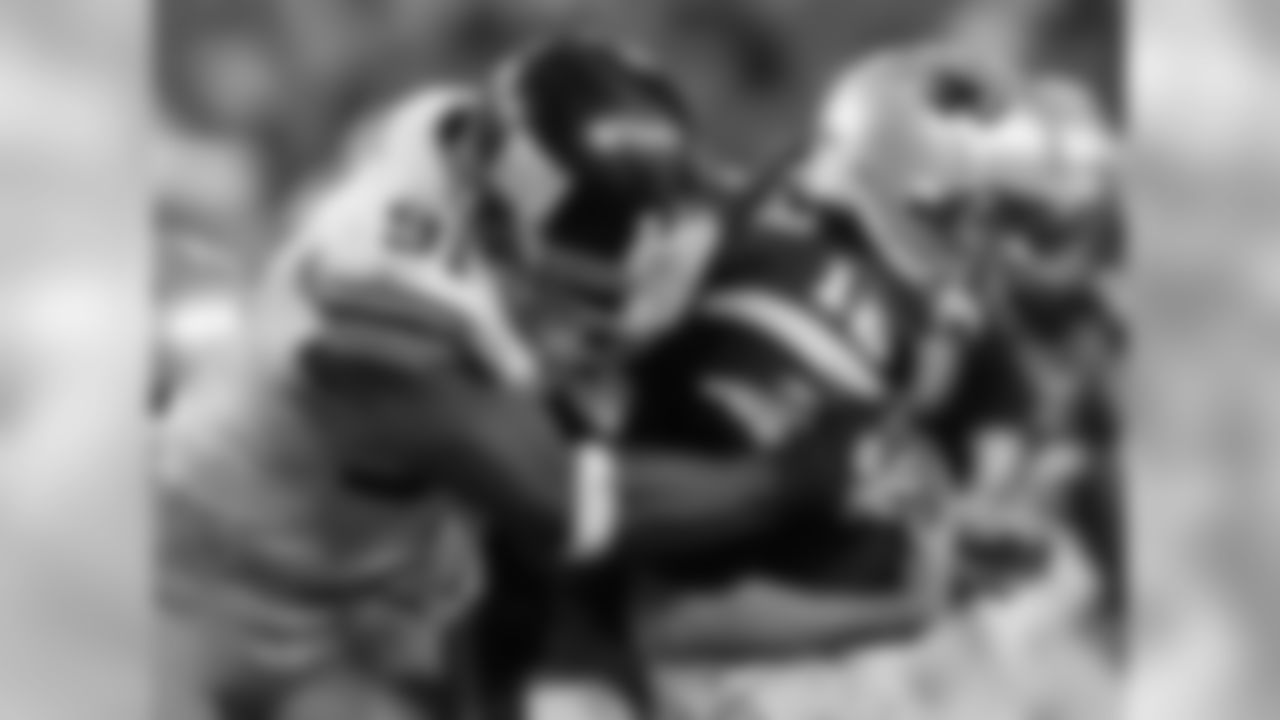
New York Giants defensive end Justin Tuck (91) sacks New England Patriots quarterback Tom Brady (12) during the second quarter of the Super Bowl XLII football game at University of Phoenix Stadium on Sunday, Feb. 3, 2008 in Glendale, Ariz. (AP Photo/Eric Gay)
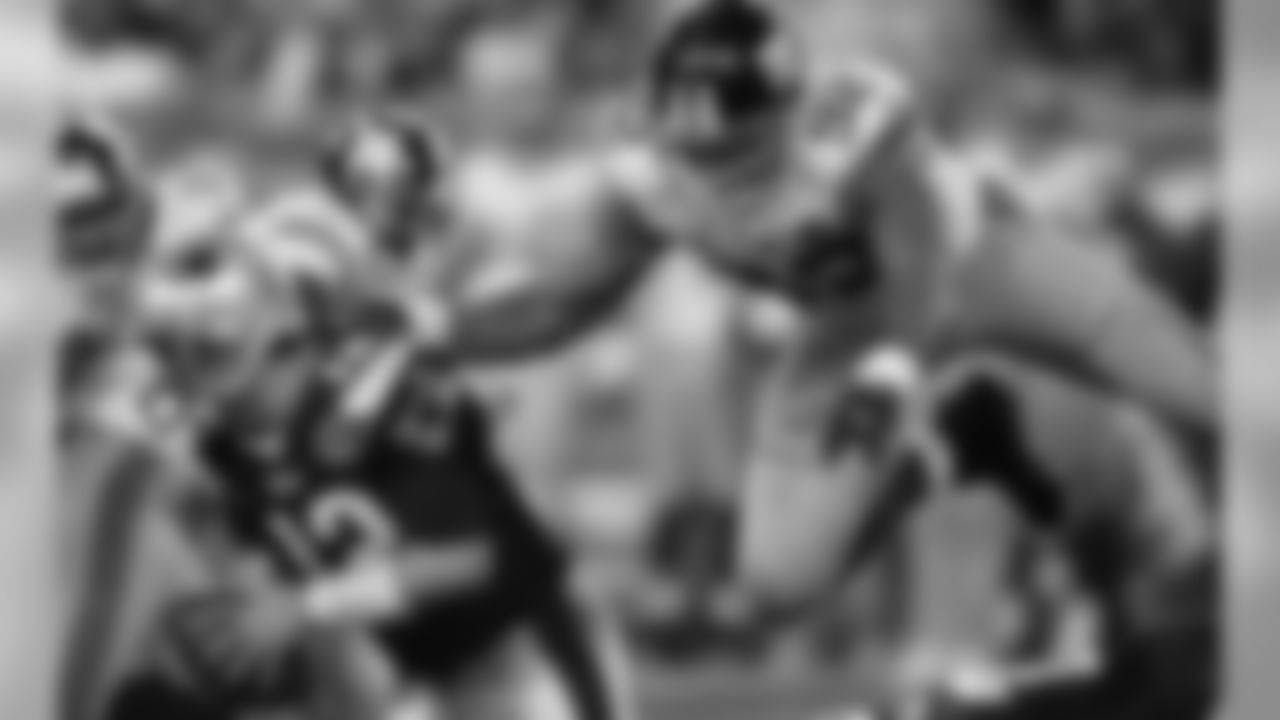
New York Giants defensive end Michael Strahan (92) dives on New England Patriots quarterback Tom Brady (12) in the second quarter during the Super Bowl XLII football game at University of Phoenix Stadium on Sunday, Feb. 3, 2008 in Glendale, Ariz. Brady was sacked on the play. (AP Photo/Stephan Savoia)
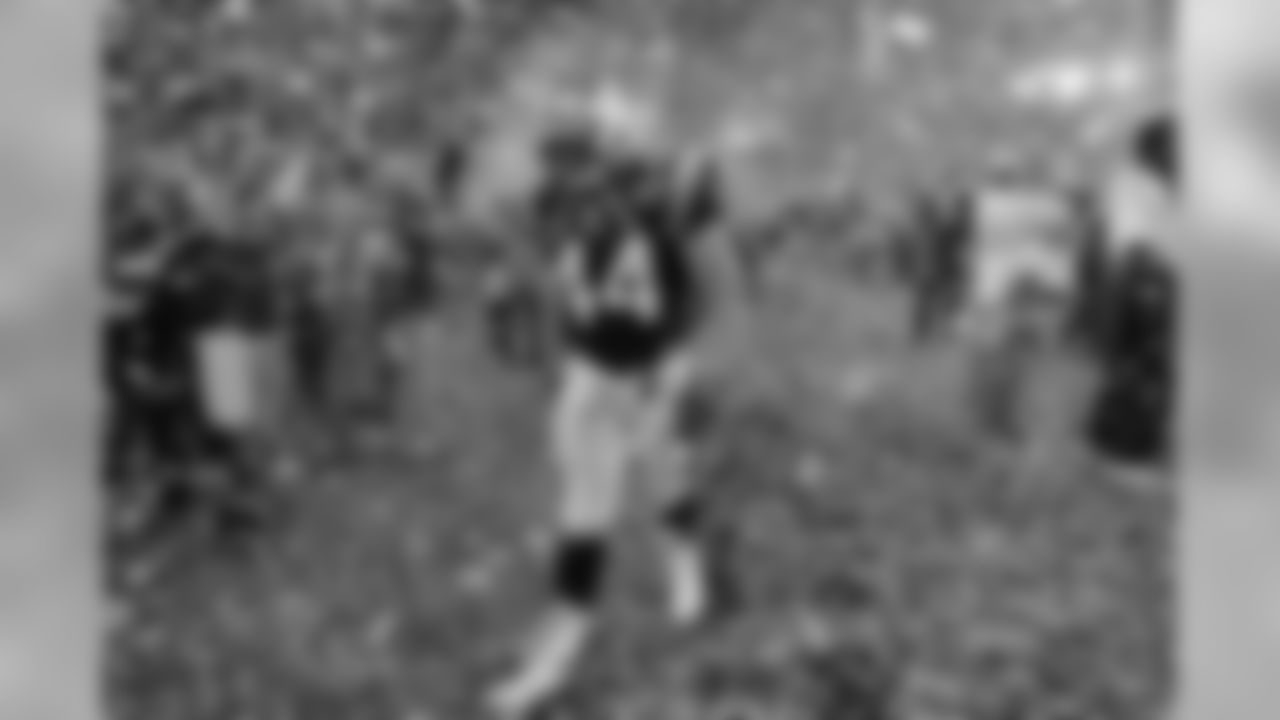
New England Patriots running back Heath Evans (44) walks off the field amid a shower of confetti after the Patriots' 17-14 loss to the New York Giants in the Super Bowl XLII football game at University of Phoenix Stadium on Sunday, Feb. 3, 2008, in Glendale, Ariz. (AP Photo/Paul Sancya)
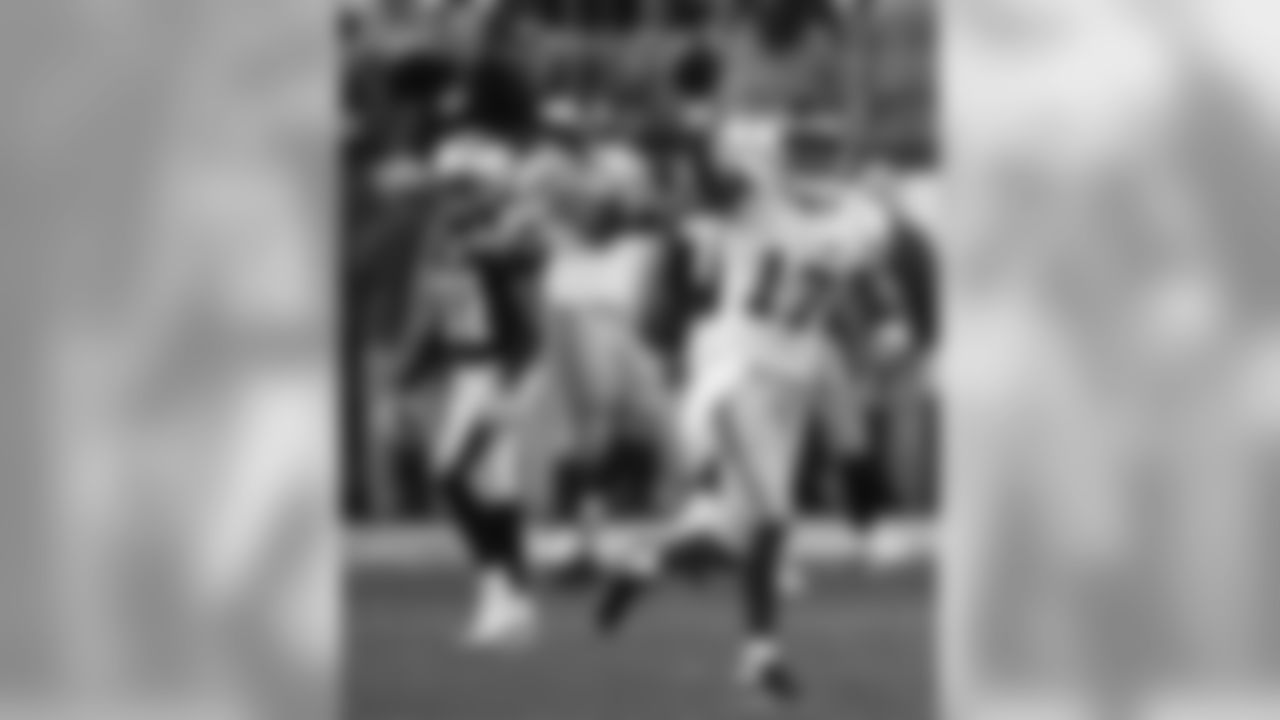
FILE In this Feb. 3, 2008 file photo, New York Giants receiver Plaxico Burress (17) celebrates after scoring the winning touchdown in the fourth quarter of the Giants' 17-14 win over the New England Patriots during the Super Bowl XLII football game at University of Phoenix Stadium in Glendale, Ariz. It was just 10 months ago that Burress became an instant New York sports hero after his clutch performance in the Super Bowl. But on Monday Dec. 1, 2008 , Burress was hauled out of a police precinct in handcuffs facing two weapons charges that could send him to jail. (AP Photo/David Duprey, File)
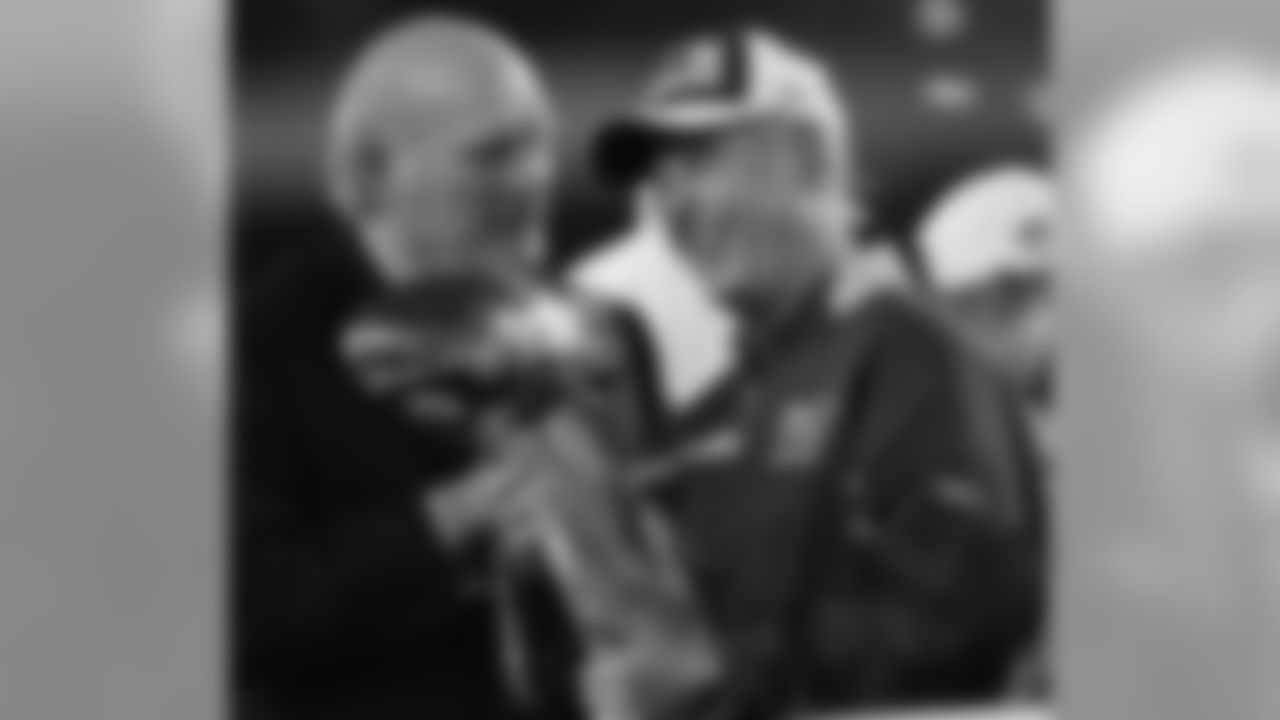
New York Giants head coach Tom Coughlin, right, admires the Vince Lombardi Trophy with broadcaster Terry Bradshaw after the Giants beat the New England Patriots 17-14 in the Super Bowl XLII football game on Sunday, Feb. 3, 2008, in Glendale, Ariz. (AP Photo/David Duprey)
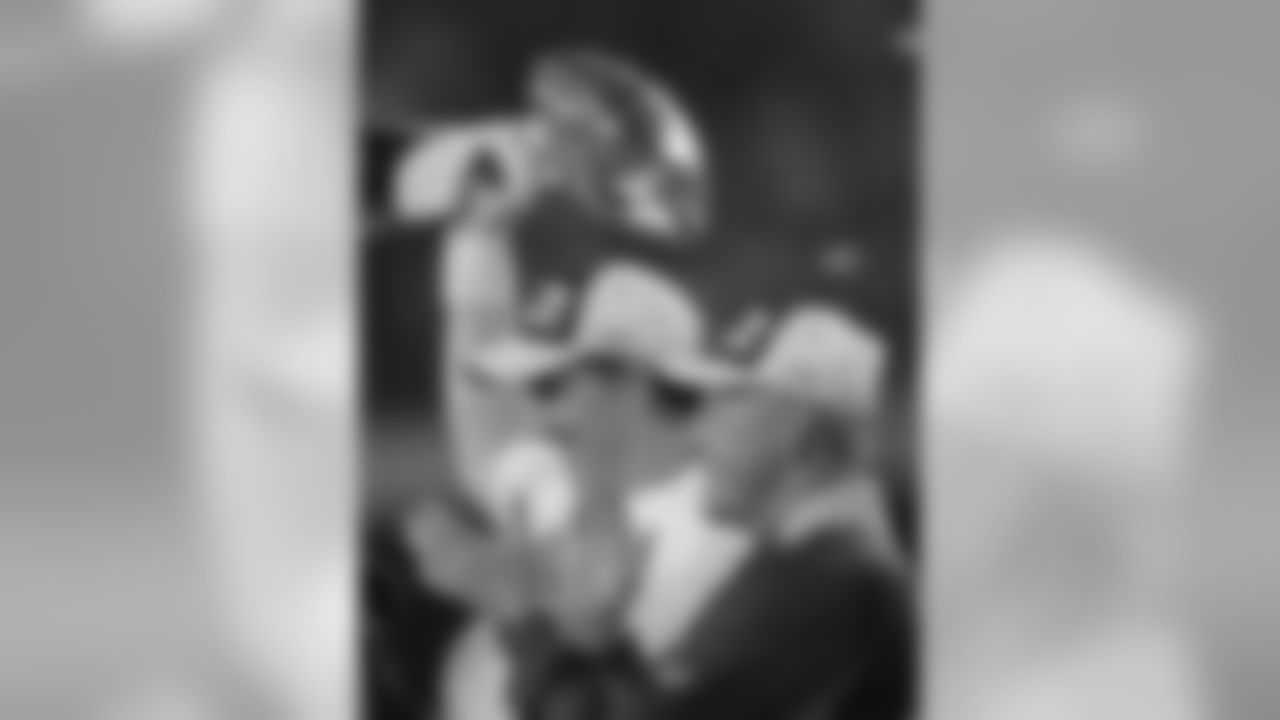
New York Giants quarterback Eli Manning, left, holds the Vince Lombardi Trophy as he celebrates with his coach Tom Coughlin after the Giants beat the New England Patriots 17-14 in the Super Bowl XLII football game on Sunday, Feb. 3, 2008, in Glendale, Ariz. (AP Photo/David Duprey)

New York Giants defensive end Michael Strahan celebrates after the Giants beat the New England Patriots 17-14 in the Super Bowl XLII football game on Sunday, Feb. 3, 2008, in Glendale, Ariz. (AP Photo/David Duprey)
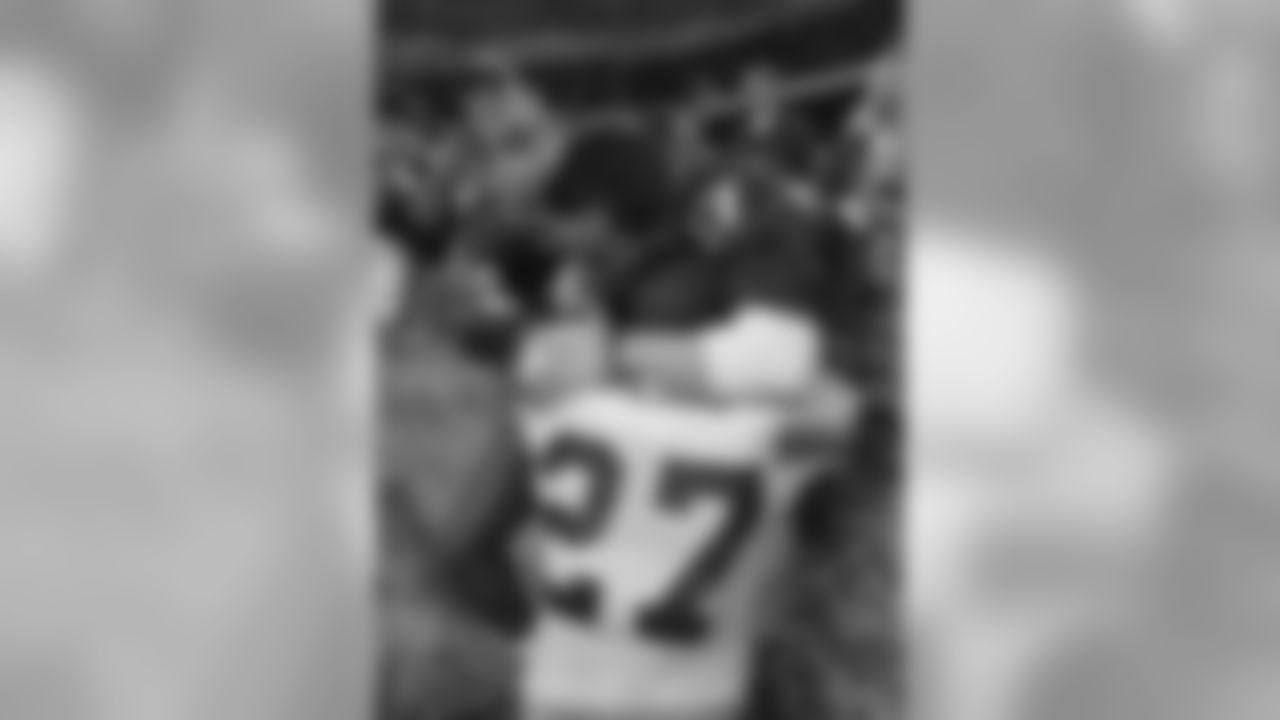
New York Giants running back Brandon Jacobs (27) celebrates with fans after the Giants beat the New England Patriots 17-14 in the Super Bowl XLII football game at University of Phoenix Stadium on Sunday, Feb. 3, 2008 in Glendale, Ariz. (AP Photo/David Duprey)
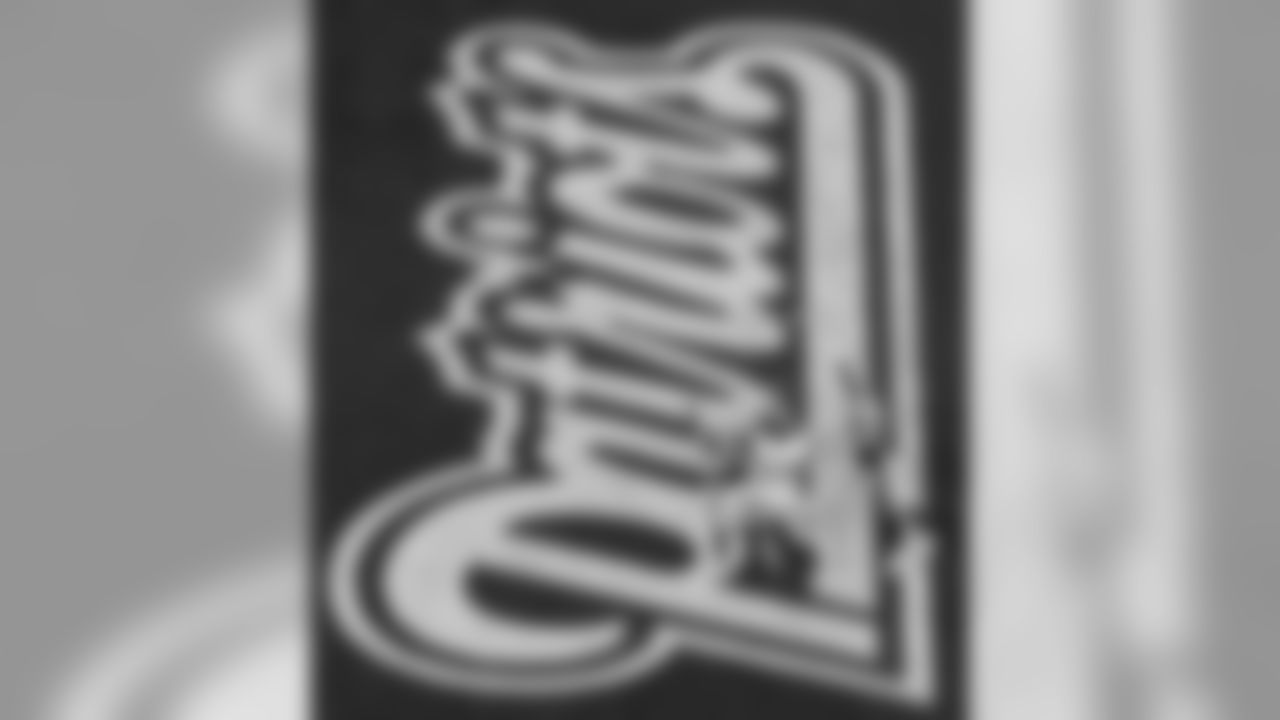
New York Giants receiver Plaxico Burress (17) jumps for the ball against New England Patriots cornerback Ellis Hobbs (27) and James Sanders during the first quarter of the Super Bowl XLII football game at University of Phoenix Stadium on Sunday, Feb. 3, 2008 in Glendale, Ariz. The pass fell incomplete. (AP Photo/David J. Phillip)

New York Giants' Guy Whimper (79) holds the Vince Lombardi Trophy after the Giants beat the New England Patriots 17-14 in the Super Bowl XLII football game on Sunday, Feb. 3, 2008, in Glendale, Ariz. (AP Photo/David Duprey)
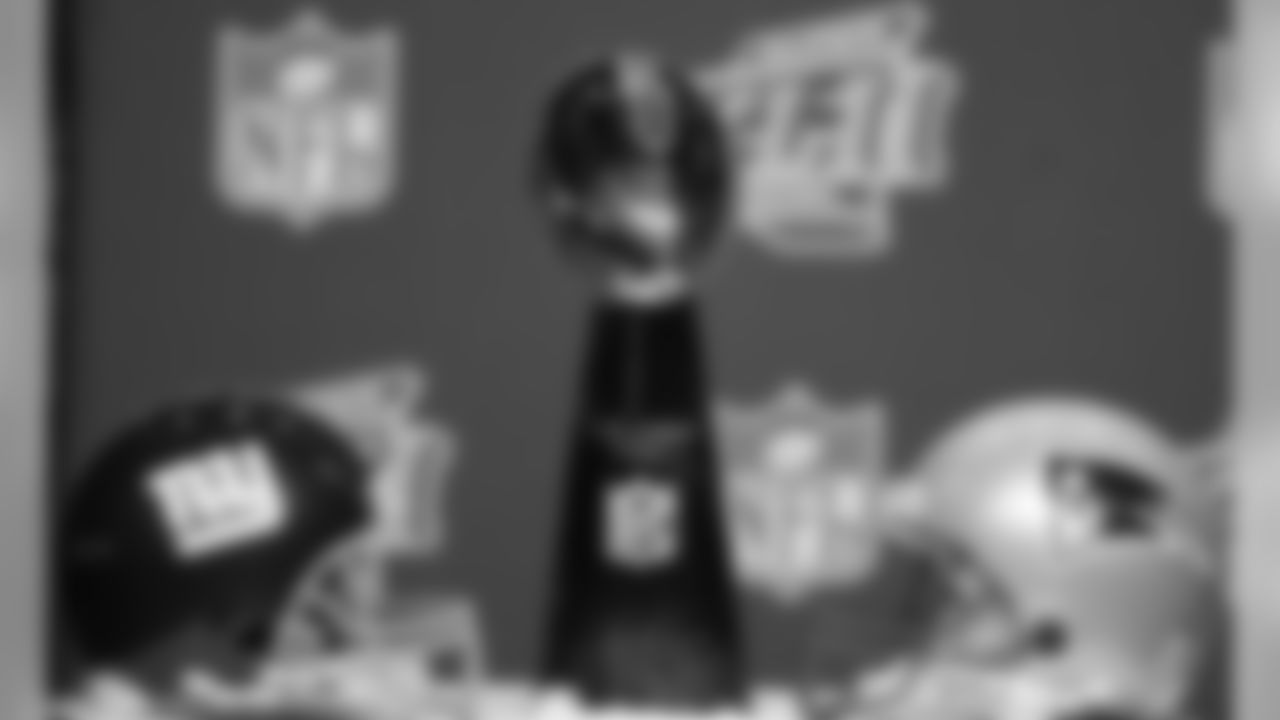
The Vince Lombardi Super Bowl trophy is seen at a news conference at the Phoenix Convention Center Friday, Feb. 1, 2008, in Phoenix. The New England Patriots play the New York Giants in Super Bowl XLII on Sunday, Feb. 3. (AP Photo/Stephan Savoia)
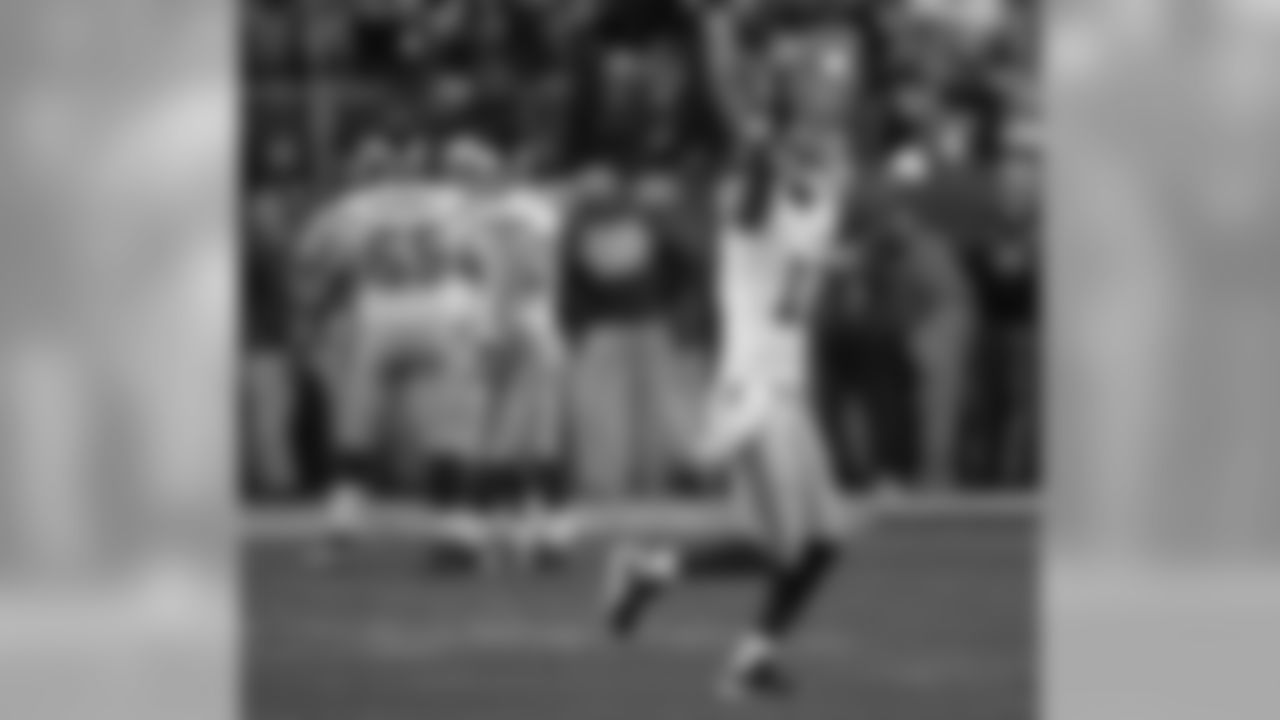
New York Giants receiver Plaxico Burress (17) celebrates after scoring the winning touchdown in the fourth quarter of the Giants' 17-14 win over the New England Patriots during the Super Bowl XLII football game at University of Phoenix Stadium on Sunday, Feb. 3, 2008 in Glendale, Ariz. (AP Photo/David Duprey)
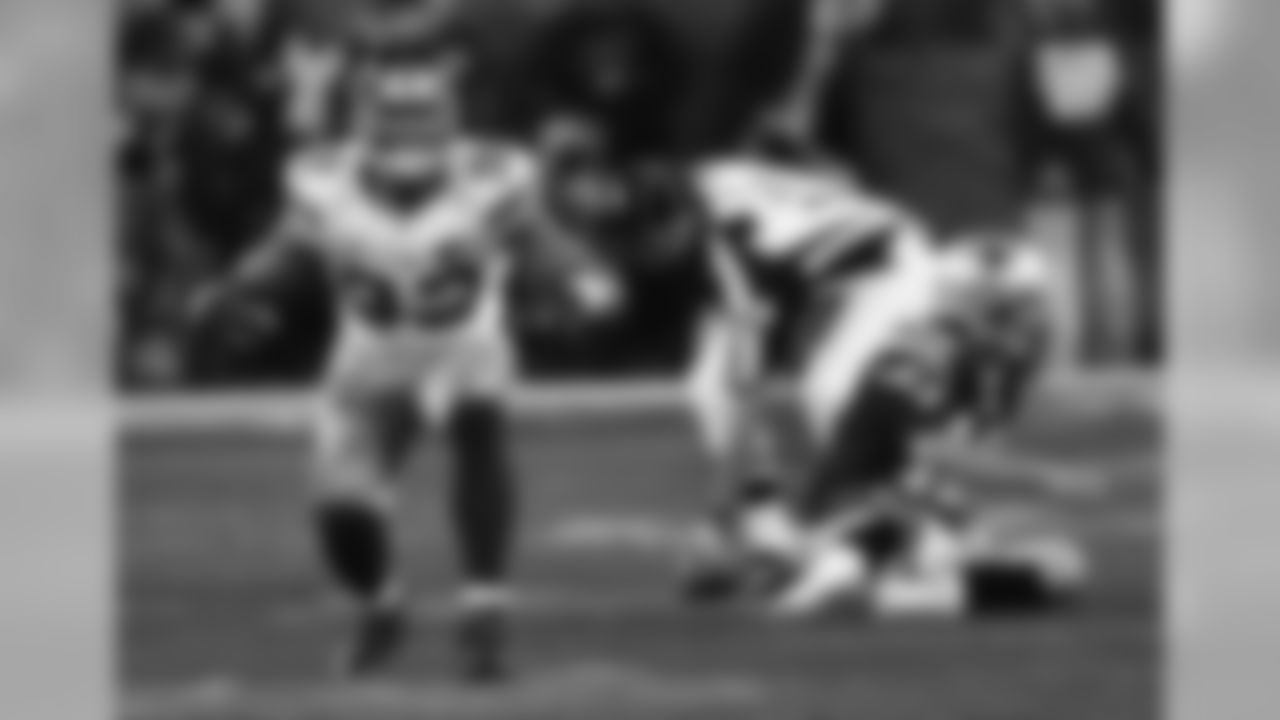
New York Giants defensive end Michael Strahan (92) reacts after sacking New England Patriots quarterback Tom Brady (12) in the third quarter during the Super Bowl XLII football game at University of Phoenix Stadium on Sunday, Feb. 3, 2008 in Glendale, Ariz. (AP Photo/David Duprey)
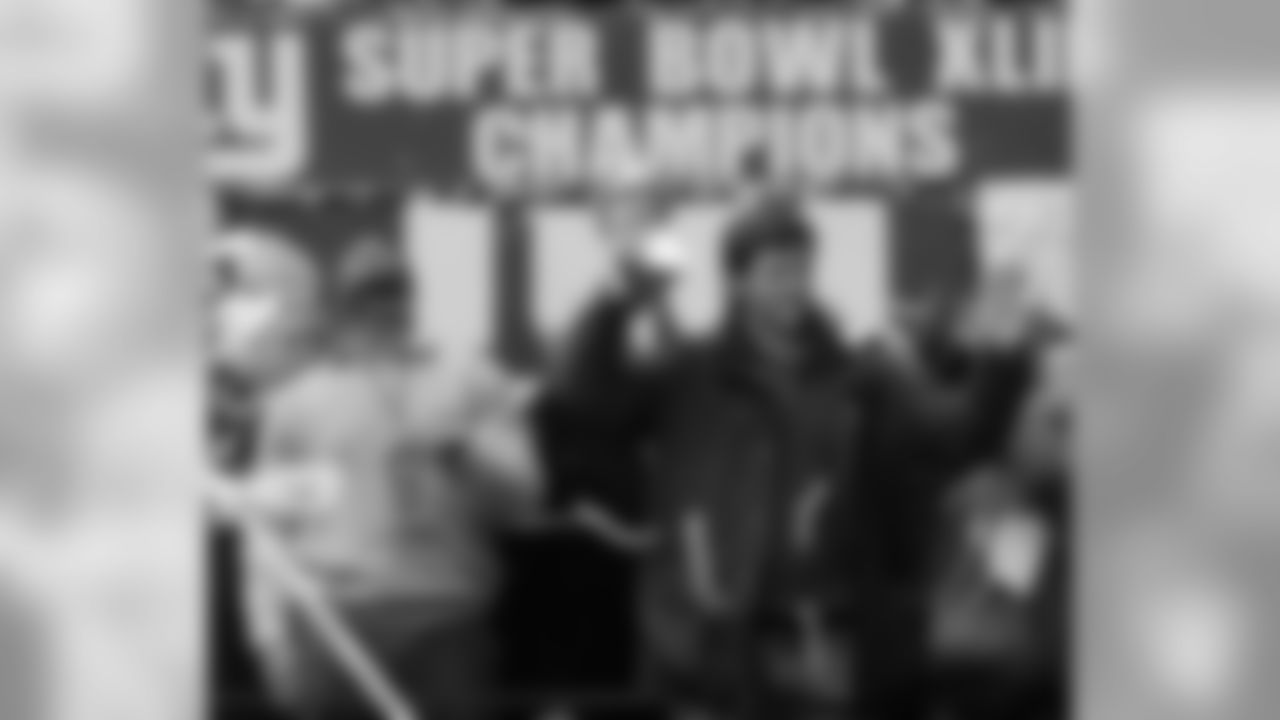
New York Giants players Michael Strahan, left, and Eli Manning, holding the Vince Lombardi trophy, celebrate during a Super Bowl parade in New York on Tuesday, Feb. 5, 2008. The Giants defeated the New England Patriots 17-14 in Sunday's National Football League championship game. (AP Photo/Mike Groll)

FILE - In this Tuesday, Feb. 5, 2008 in New York file photo, New York Giants' quarterback Eli Manning looks on as defensive end Michael Strahan, holds the Super Bowl trophy during a parade celebrating the New York Giants Super Bowl victory over the New England Patriots. A reader-submitted question about extra pay for NFL playoff teams is being answered as part of an Associated Press Q&A column called "Ask AP." (AP Photo/Frank Franklin II, File)

New York Giants fans watch from the ground and from scaffolding during the Super Bowl parade Tuesday, Feb. 5, 2008 in New York. (AP Photo/Gary He)

New York Giants wide receiver David Tyree holds up his key to the city during a ceremony honoring the team Tuesday, Feb. 5, 2008 in New York. Tyree made a spectacular catch in the fourth quarter to help the Giants beat the New England Patriots in Super Bowl XLII 17-14 on Sunday. (AP Photo/Julie Jacobson)

A New York Giants fan holds up a sign during a ceremony honoring the Giants at City Hall Tuesday, Feb. 5, 2008 in New York. The sign was in reference to the Giants' 17-14 Super Bowl win over the New England Patriots on Sunday, which tarnished the Patriots' perfect season. (AP Photo/Julie Jacobson)
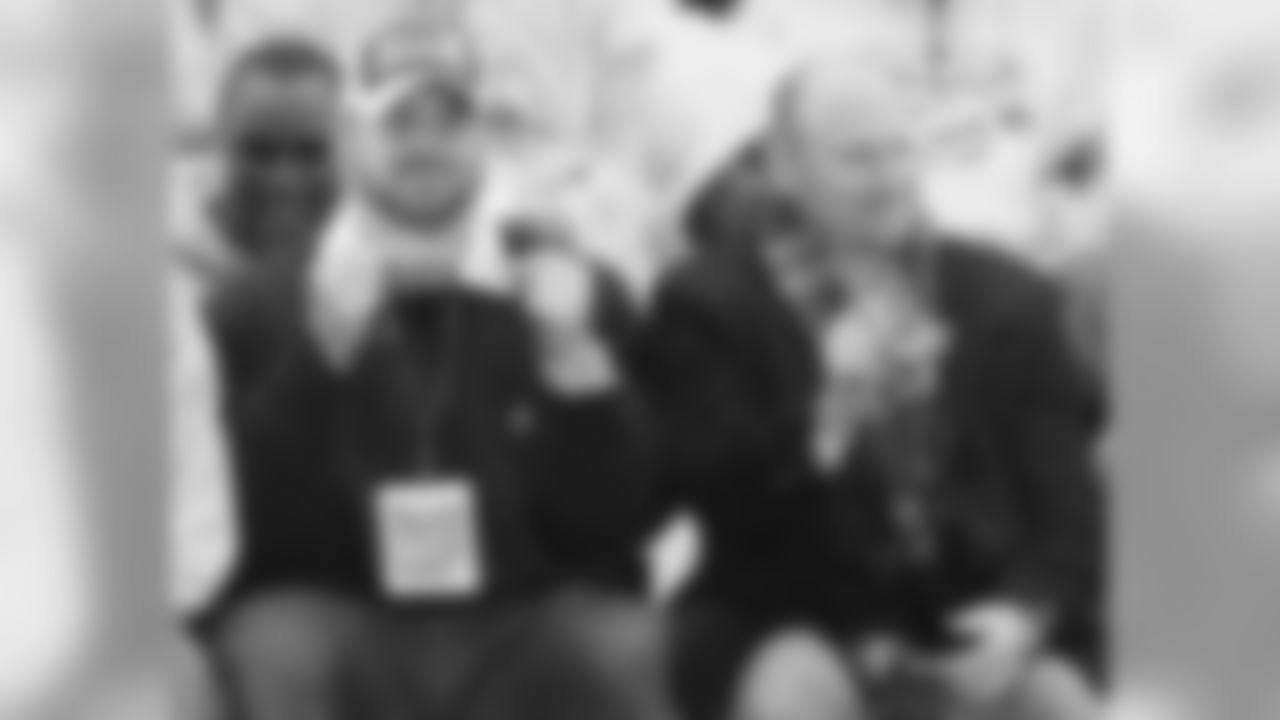
New York Giants center Shaun O'Hara, left, and punter Jeff Feagles show off their keys to the city during a ceremony honoring the team Tuesday, Feb. 5, 2008 in New York. The Giants beat the New England Patriots in Super Bowl XLII 17-14 on Sunday. (AP Photo/Julie Jacobson)
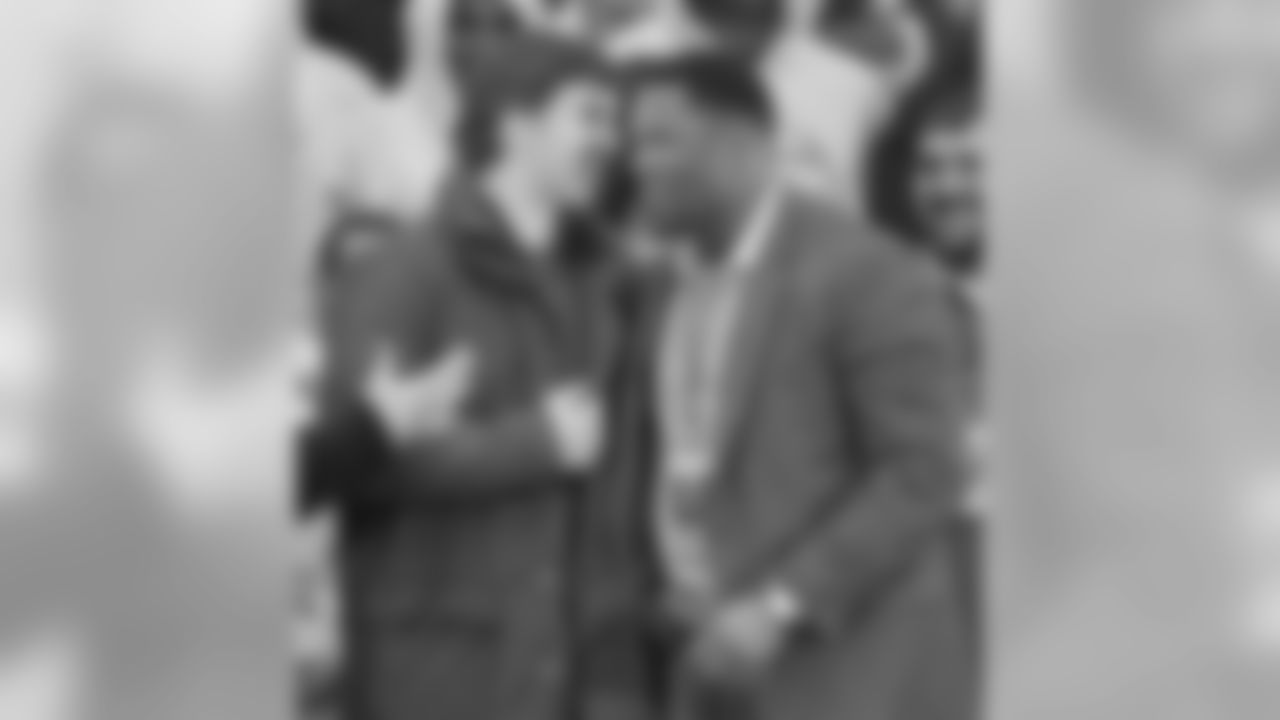
New York Giants quarterback Eli Manning, left, talks with defensive end Michael Strahan after receiving their keys to the city during a ceremony honoring the team Tuesday, Feb. 5, 2008 in New York. The Giants beat the New England Patriots 17-14 in Super Bowl XLII on Sunday. (AP Photo/Julie Jacobson)
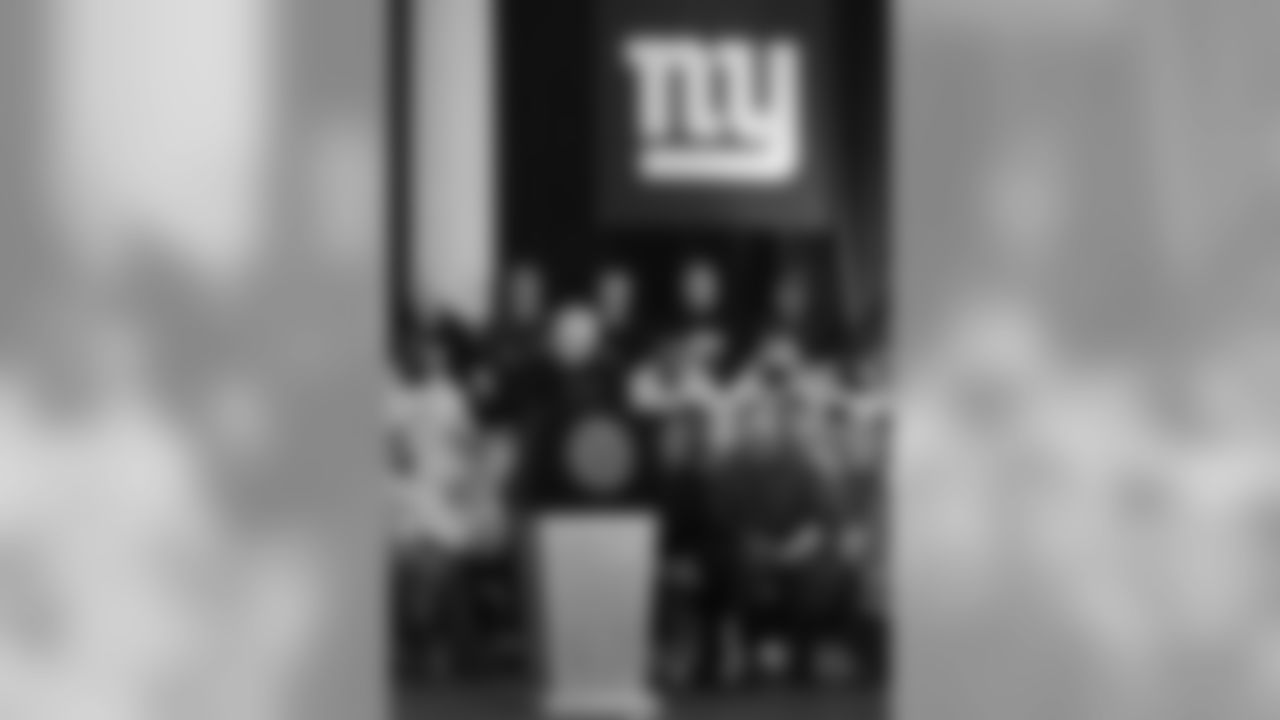
New York Giants head coach Tom Coughlin addresses fans during a ceremony honoring the team Tuesday, Feb. 5, 2008 at City Hall in New York. The Giants beat the New England Patriots 17-14 in Super Bowl XLII on Sunday. (AP Photo/Julie Jacobson)
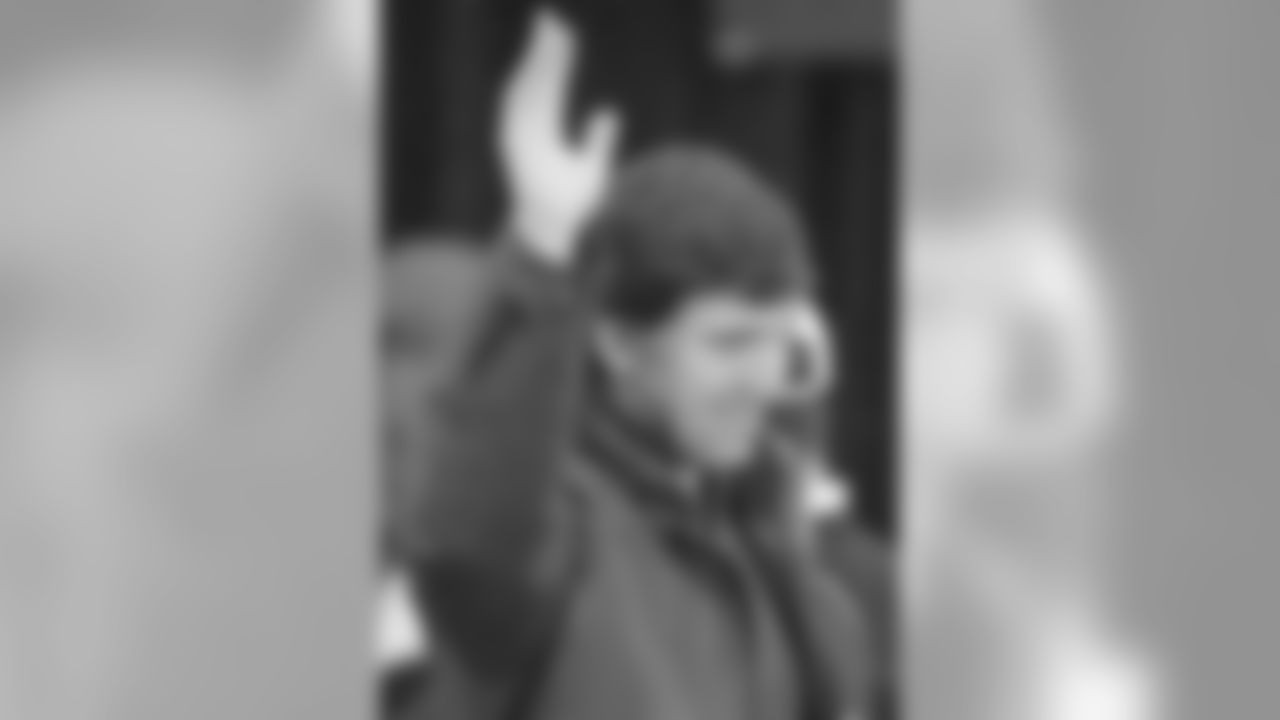
New York Giants quarterback Eli Manning waves to fans during a ceremony honoring the team Tuesday, Feb. 5, 2008 at City Hall in New York. The Giants beat the New England Patriots 17-14 in Super Bowl XLII on Sunday. (AP Photo/Julie Jacobson)
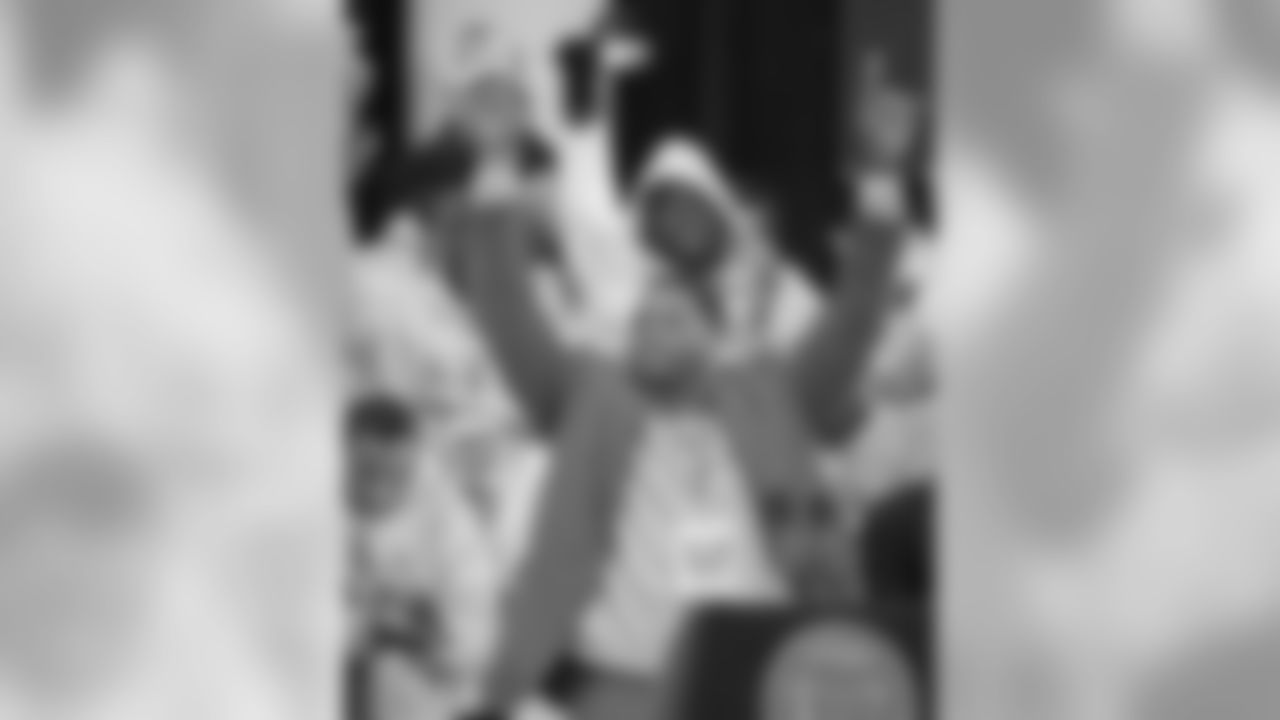
New York Giants defensive end Michael Strahan celebrates with teammates during a ceremony honoring the team Tuesday, Feb. 5, 2008 at City Hall in New York. The Giants beat the New England Patriots 17-14 in Super Bowl XLII on Sunday. (AP Photo/Julie Jacobson)

Fans gather outside New York City Hall to honor the New York Giants Tuesday, Feb. 5, 2008 in New York. The Giants beat the New England Patriots 17-14 in Super Bowl XLII on Sunday.(AP Photo/Julie Jacobson)
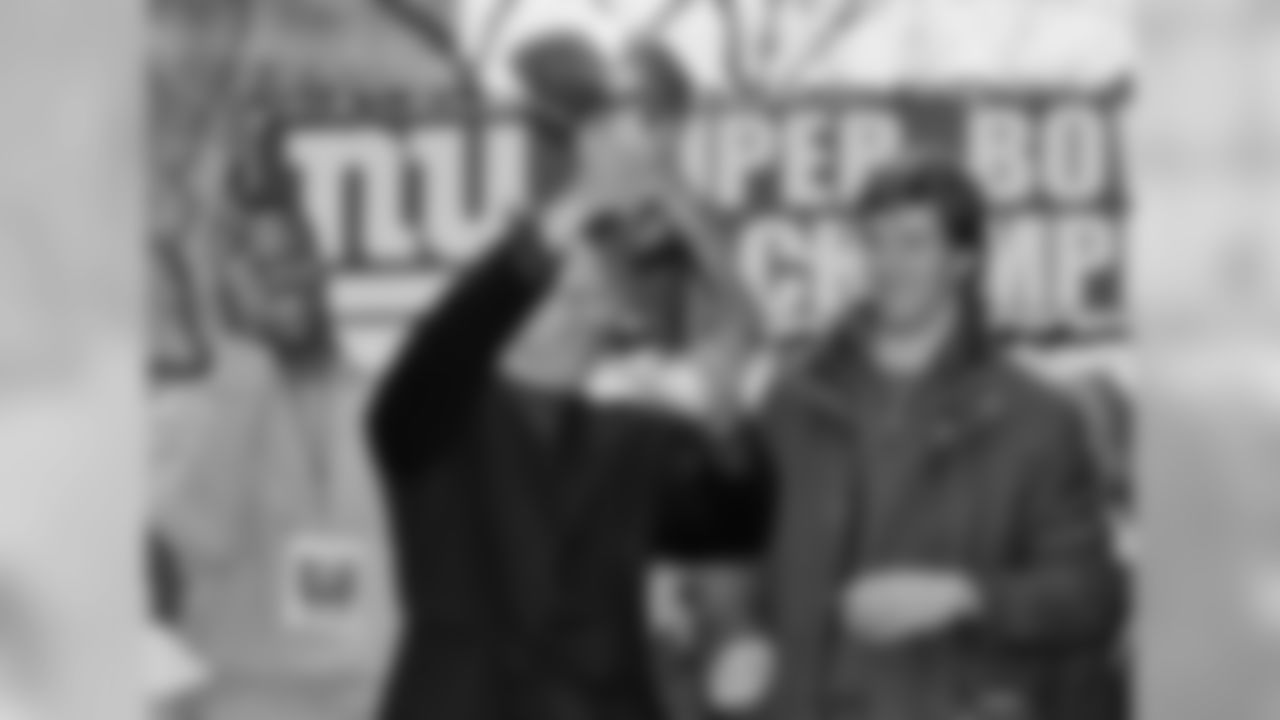
New York Giants' head coach Tom Coughlin, center, holds the Vince Lombardi trophy as Michael Strahan, left, and Eli Manning, right, look on during a parade celebrating the Giants Super Bowl victory over the New England Patriots Tuesday, Feb. 5, 2008 in New York. (AP Photo/Frank Franklin II)

New York Giants defensive end Michael Strahan, left, talks with Whoopi Goldberg during a ceremony honoring the team Tuesday, Feb. 5, 2008 at City Hall in New York. The Giants beat the New England Patriots 17-14 in Super Bowl XLII on Sunday. (AP Photo/Julie Jacobson)

New York Giants defensive end Michael Strahan makes his way to the stage carrying the George C. Halas trophy of the NFC Championship trophy during a ceremony honoring the team Tuesday, Feb. 5, 2008 at City Hall in New York. The Giants beat the New England Patriots 17-14 in Super Bowl XLII on Sunday. (AP Photo/Julie Jacobson, Pool)
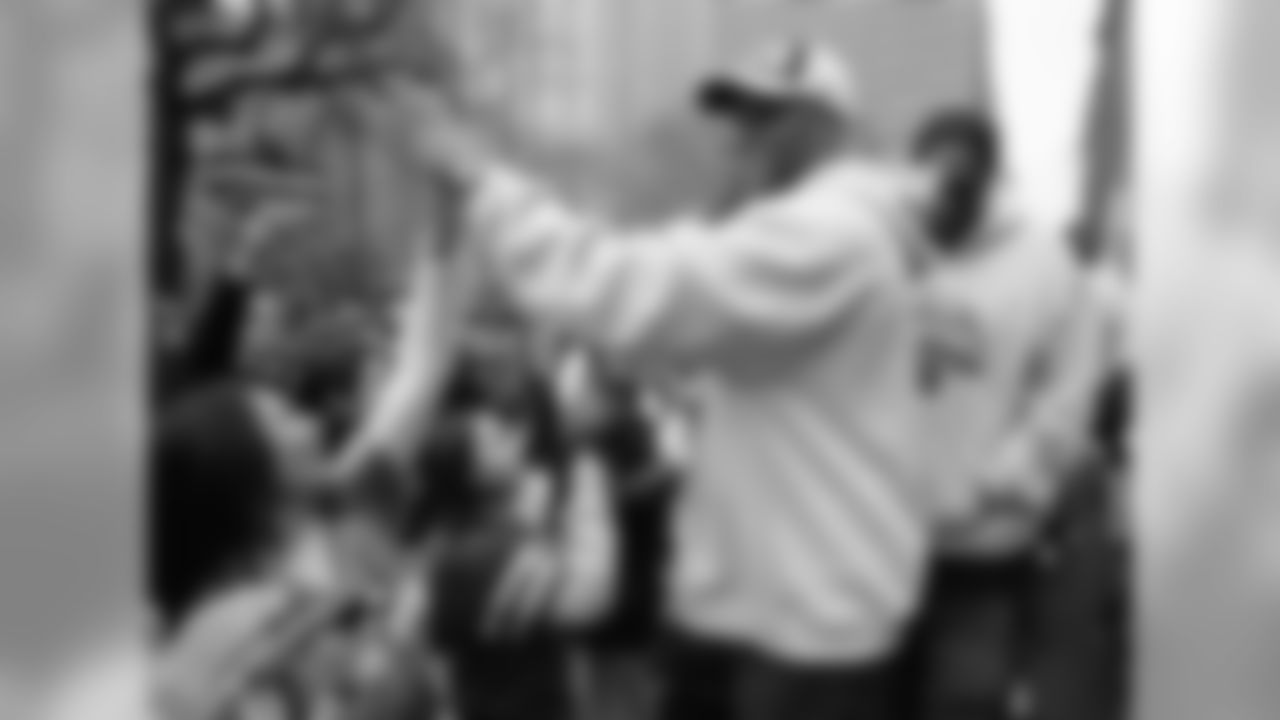
New York Giants wide receiver Amani Toomer high fives fans as he makes his way to the stage during a ceremony honoring the team Tuesday, Feb. 5, 2008 at City Hall in New York. The Giants beat the New England Patriots 17-14 in Super Bowl XLII on Sunday. (AP Photo/Julie Jacobson, Pool)

New York Giants quarterback Eli Manning makes his way to the stage carrying the Vince Lomardi trophy for a ceremony honoring the team Tuesday, Feb. 5, 2008 at City Hall in New York. The Giants beat the New England Patriots 17-14 in Super Bow on Sunday.(AP Photo/Julie Jacobson, Pool)

Players wave to fans as the Super Bowl Champion New York Giants receive a ticker tape parade in lower Manhattan through the "Canyon of Heroes" Tuesday, Feb. 5, 2008 in New York. (AP Photo/Jason DeCrow)

Players wave to fans as the Super Bowl Champion New York Giants receive a ticker tape parade in Lower Manhattan through the "Canyon of Heroes" Tuesday, Feb. 5, 2008 in New York. (AP Photo/Jason DeCrow)

New York Giants players Michael Strahan, left, and Eli Manning celebrate during a Super Bowl parade in New York on Tuesday, Feb. 5, 2008. The Giants defeated the New England Patriots, 17-14, in Sunday's National Football League championship game. (AP Photo/Mike Groll)

New York Giants fans wave during a parade celebrating the Giants Super Bowl victory over the New England Patriots Tuesday, Feb. 5, 2008 in New York. (AP Photo/Frank Franklin II)
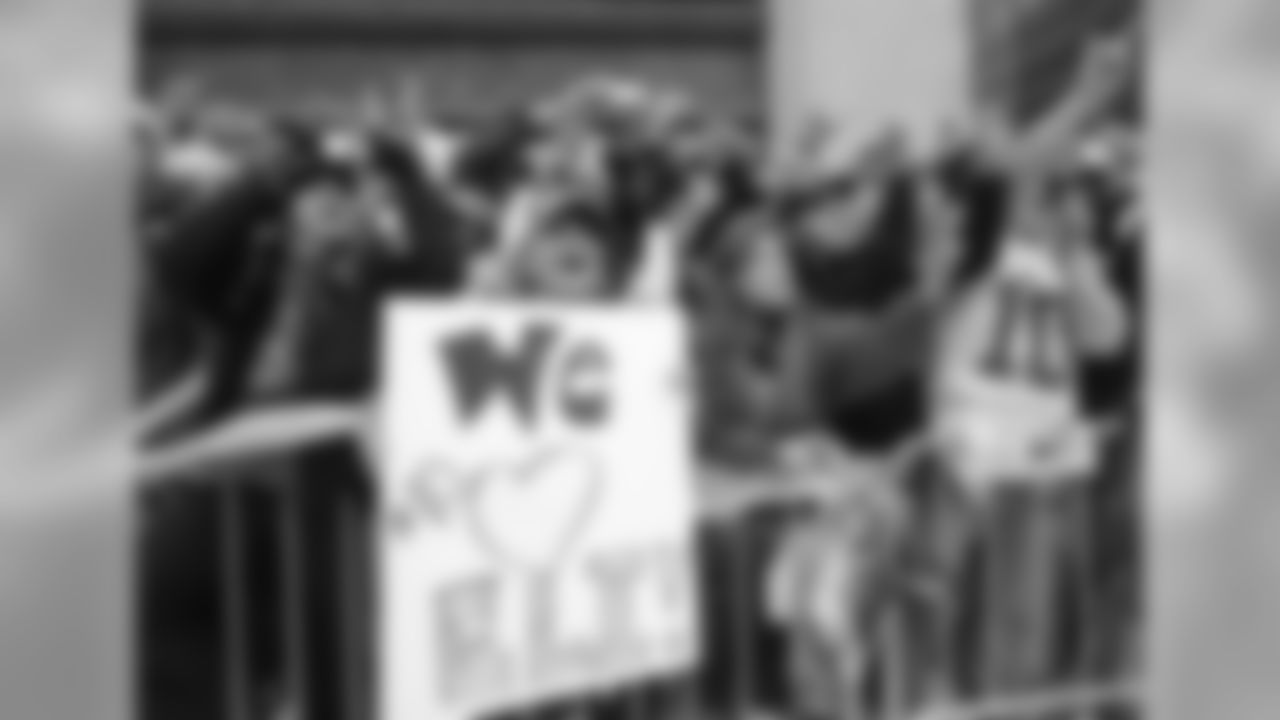
Corinne Kelly, left, of Roselle Park, N.J. and Lauren Busko, of Garwood, N.J., second from left, join other fans as they celebrate during a parade for the New York Giants Super Bowl victory over the New England Patriots Tuesday, Feb. 5, 2008 in New York. (AP Photo/Frank Franklin II)

Players wave to a throng of fans as the Super Bowl Champion New York Giants receive a ticker tape parade in Lower Manhattan through the "Canyon of Heroes" Tuesday, Feb. 5, 2008 in New York. (AP Photo/Jason DeCrow)
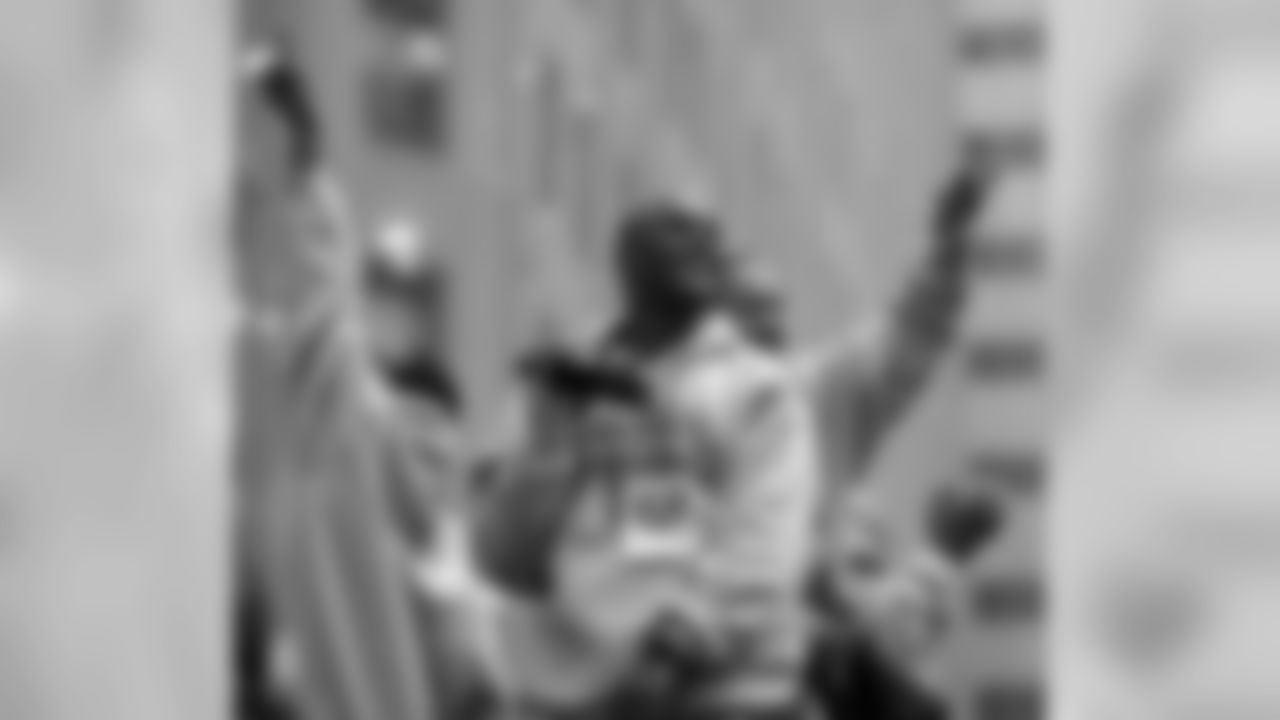
New York Giants wide receiver Amani Toomer rides through the Super Bowl victory parade Tuesday, Feb. 5, 2008 in New York. (AP Photo/Gary He)
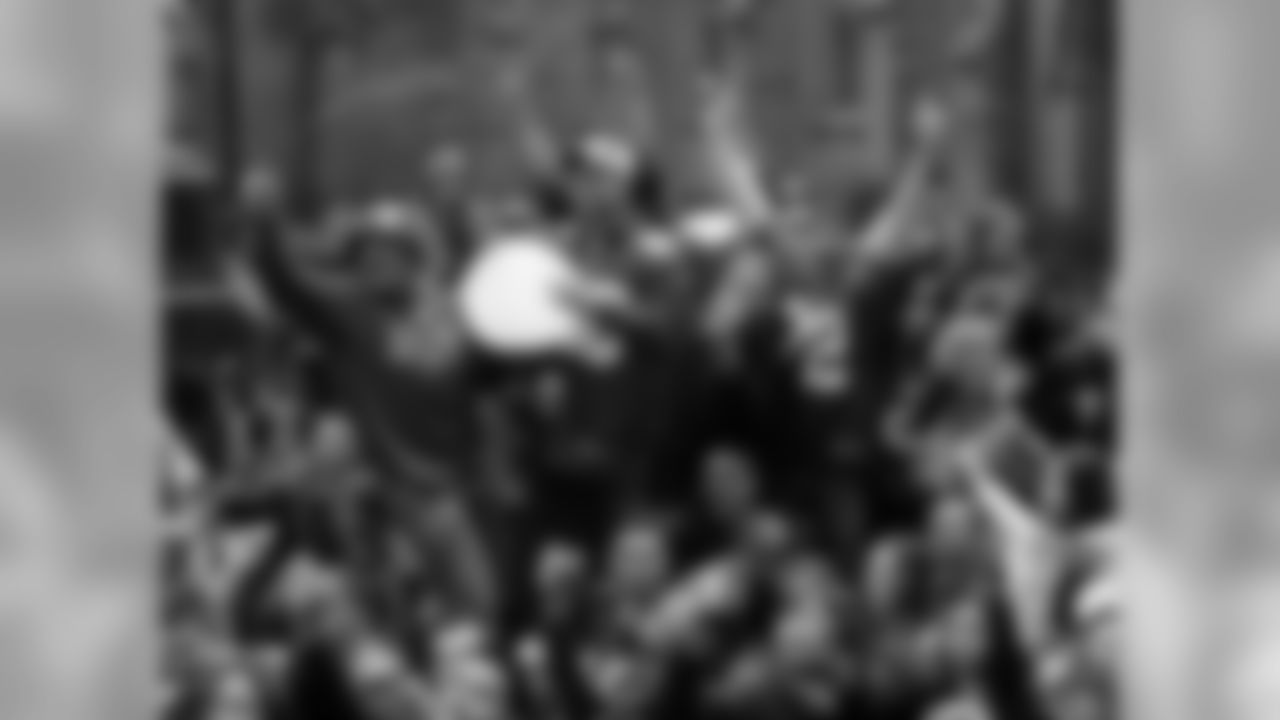
New York Giants fans celebrate during a Super Bowl victory parade in New York on Tuesday, Feb. 5, 2008. The Giants defeated the New England Patriots, 17-14, in Sunday's National Football League championship game. (AP Photo/Mike Groll)
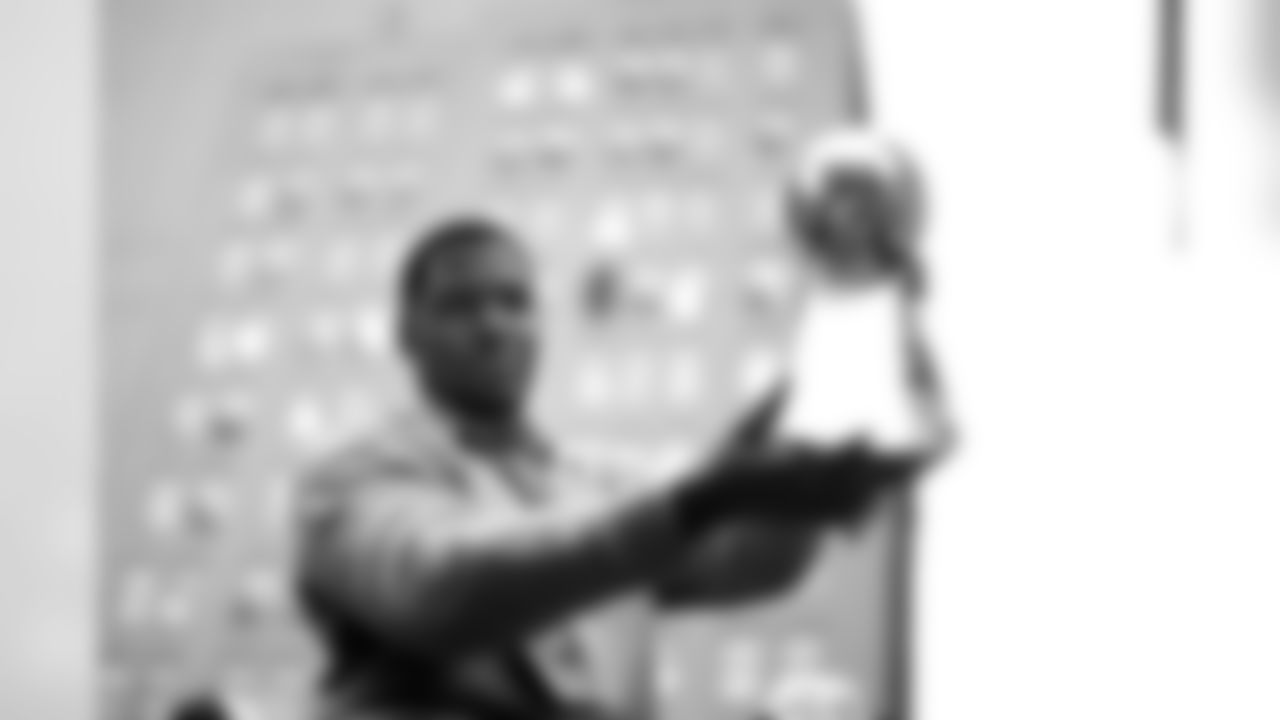
New York Giants defensive end Michael Strahan shows the Vince Lombardi Trophy as he rides through the Super Bowl victory parade Tuesday, Feb. 5, 2008 in New York. (AP Photo/Gary He)

New York Giants fan Ryan Schnepf, 23, walks through the confetti strewn on Broadway after the Super Bowl parade Tuesday, Feb. 5, 2008 in New York. (AP Photo/Gary He)

New York Giantscoach Tom Coughlin holds the Vince Lombardi Trophy during a Super Bowl parade in New York on Tuesday, Feb. 5, 2008. Manning was the most valuable player as the Giants defeated the New England Patriots, 17-14, in Sunday's National Football League championship game. (AP Photo/Gary He)
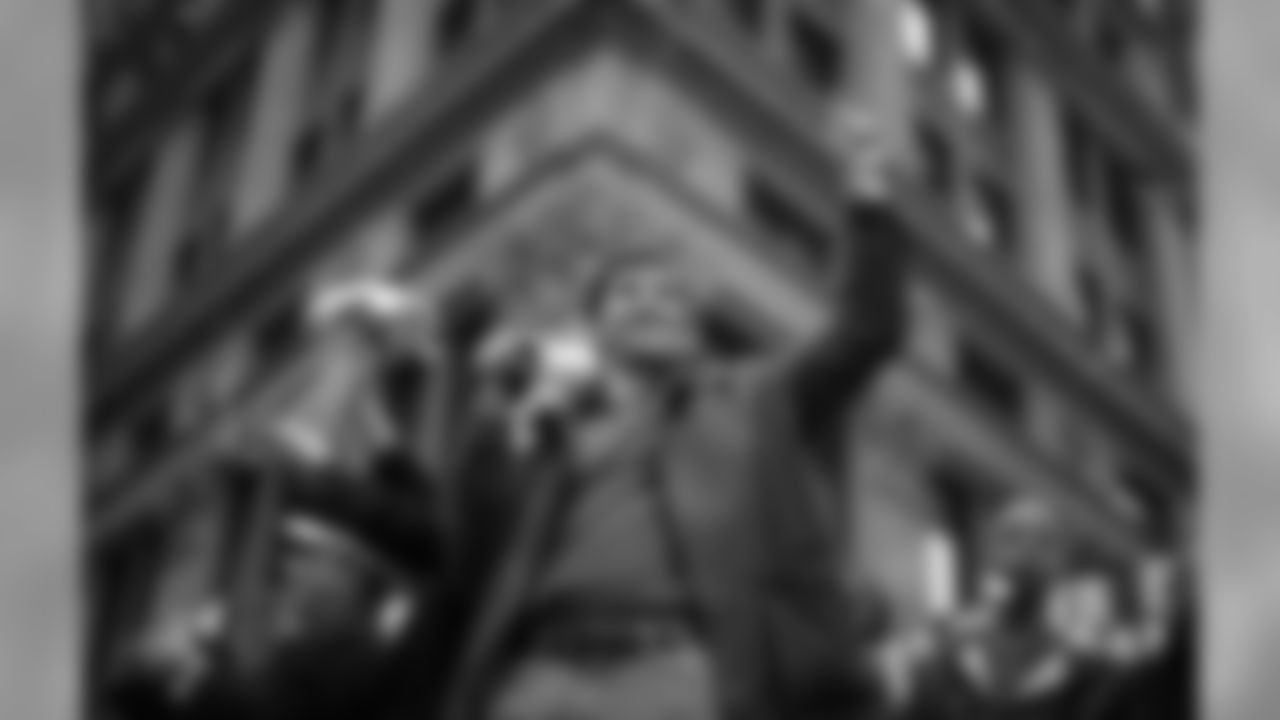
New York Giants quarterback Eli Manning celebrates during a Super Bowl parade in New York on Tuesday, Feb. 5, 2008. Manning was the most valuable player as the Giants defeated the New England Patriots, 17-14, in Sunday's National Football League championship game. (AP Photo/Gary He)
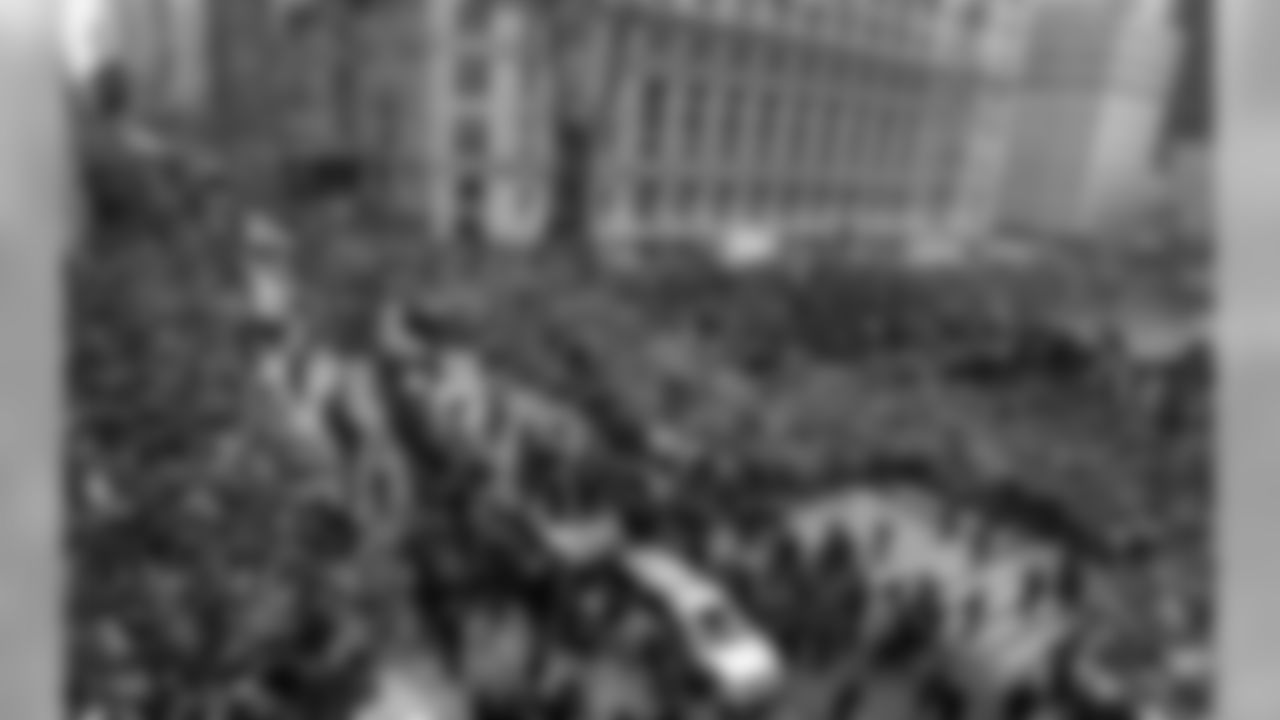
The float carrying the Vince Lombardi Trophy makes its way up Broadway as the Super Bowl champion New York Giants football team receive a ticker tape parade in Lower Manhattan through the "Canyon of Heroes" Tuesday, Feb. 5, 2008 in New York. (AP Photo/Jason DeCrow)

Defensive end Michael Strahan, New York Mayor Michael Bloomberg, coach Tom Coughlin, and MVP quarterback Eli Manning, at the front of the float, from left, show off the Vince Lombardi Trophy to a throng of fans as the Super Bowl Champion New York Giants receive a ticker tape parade in Lower Manhattan through the "Canyon of Heroes" Tuesday, Feb. 5, 2008 in New York. (AP Photo/Jason DeCrow)
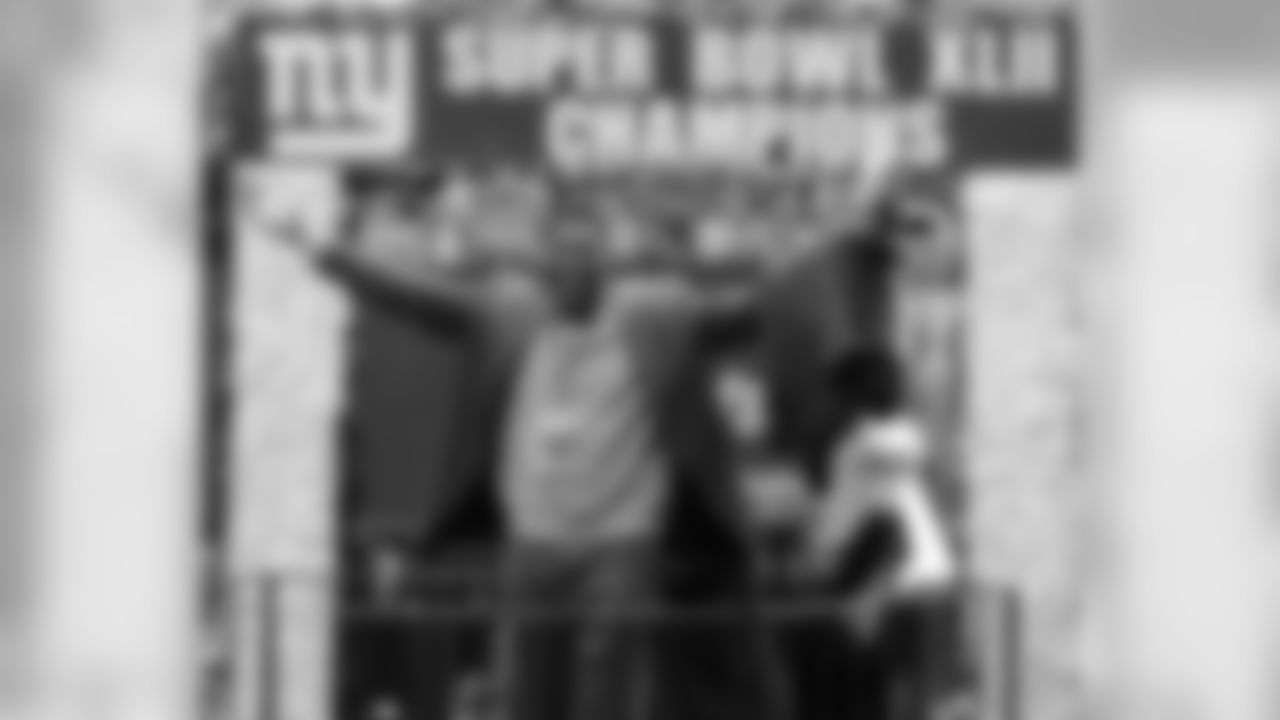
New York Giants players Michael Strahan celebrates during a Super Bowl parade in New York on Tuesday, Feb. 5, 2008. The Giants defeated the New England Patriots, 17-14, in Sunday's National Football League championship game. (AP Photo/Mike Groll)

A float carrying the Vince Lombardi Trophy makes its way up Broadway as the Super Bowl Champion New York Giants receive a ticker tape parade in lower Manhattan through the "Canyon of Heroes" Tuesday, Feb. 5, 2008 in New York. (AP Photo/Jason DeCrow)
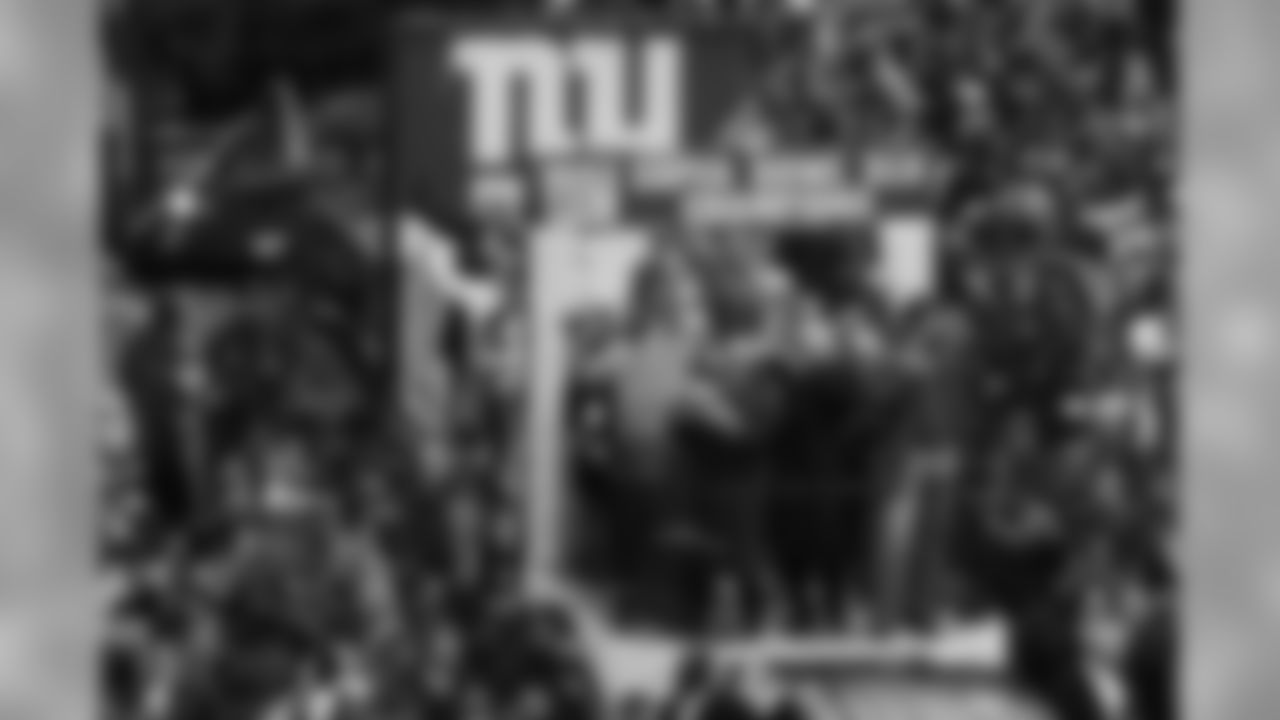
RECROP VERSION Defensive end Michael Strahan, New York Mayor Michael Bloomberg, coach Tom Coughlin, and MVP quarterback Eli Manning, at the front of the float, from left, show off the Vince Lombardi Trophy to a throng of fans as the Super Bowl Champion New York Giants receive a ticker tape parade in Lower Manhattan through the "Canyon of Heroes" Tuesday, Feb. 5, 2008 in New York. (AP Photo/Jason DeCrow)
2. The most important play in Super Bowl XLII was not "The Helmet Catch."
Schmeelk: Fact -- This is an impossible question to answer for a few reasons. Does the Tyree completion turn into an incompletion? If that's the result, it is 4th and 5 and the Giants have a chance to convert a reasonable 4th down attempt. If that's the case, the play isn't quite as essential. If Manning is sacked, however, it's fourth and impossible on the wrong side of midfield with only one timeout remaining. The game would be in serious peril in that situation.
It's also important to remember that three plays prior to the Tyree catch, Brandon Jacobs converted a 4th and 1 on a two-yard run. Three plays after the Tyree catch, Manning converted a 3rd and 11 on a pass to Steve Smith. Earlier in the game, the Giants defense held the Patriots on a 4th and 13 in Giants territory and Justin Tuck's forced fumble before halftime kept the Patriots from scoring to close out the second quarter.
Salomone: Fact – What makes football so special is the butterfly effect. What happens on an innocuous handoff has repercussions in the fourth quarter of the biggest game in American sports. I'm talking about the botched exchange between Eli Manning and Ahmad Bradshaw midway through the second quarter with the Patriots leading 7-3. The Patriots seemed to recover the ball, but somehow Bradshaw came out of the scrum with possession. "It was like my life was up under there," he would recall, "and I had to go get it." If the Patriots had recovered at the Giants 30, who knows what would have happened. That's why you can't pin "most important" on any single play. The game is decided by a handful of them, and that was certainly a big one.
Medow: Fiction -- What happens if Eli Manning doesn't escape the pressure and David Tyree doesn't make that catch? No one has a crystal ball, but it would be fourth down (4th and 5) at the Giants 44-yard line with about a minute to go and the Giants trailing by four. Yes, the Giants would have gone for it and who knows how the drive ends, but let's not forget Big Blue was up against the clock and needed a touchdown. Settling for a field goal wasn't an option. As great as Tyree's catch was, don't overlook the fact that it handed the Giants 32 yards in field position. They went from their own 44-yard line to New England's 24-yard line. While Steve Smith's 12-yard catch on 3rd and 11 three plays later was just as crucial, it's a lot easier for Manning to execute a manageable throw to Smith versus a prayer to Tyree.
3. Jay Alford was the unsung hero of Super Bowl XLII.
Schmeelk: Fiction -- Corey Webster wins this award for me. Only one play after Jay Alford's sack, Corey Webster stays with Randy Moss on a go-route and extends his arm just enough to knock Tom Brady's pass away. If Moss catches that pass, the Patriots have the ball around midfield or worse with a timeout remaining and time for another play before a field goal attempt to tie the game. A runner-up here is James Butler, the Giants' starting free safety. Butler tied for the team lead in tackles, and more than one defensive coach told me after that game that he played perfectly from an assignment standpoint. He helped Webster and Sam Madison hold Randy Moss to only five catches for 62 yards.
Salomone: Fact – I'm biased here. Jay actually spent time in our digital group last year as part of a Player Engagement program. We put a big poster board of him sacking Tom Brady on the third-to-last play of Super Bowl XLII on an easel near his desk. People often overlook that final Patriots possession. In the pandemonium of what happened with the "Helmet Catch" and the go-ahead score by Plaxico Burress with 35 seconds left, Brady – and Randy Moss, mind you – still had a couple cracks at it. New England needed only to get into field goal range to force overtime, but Alford's sack on second down put one of the final nails in the game. There were a few more heart-stoppers from Brady's cannon, but he couldn't connect with one of the best big-play receivers of all time.
Medow: Fiction -- First of all, the Giants' defense deserves credit for its effort against Tom Brady and the Patriots in Super Bowl XLII. That unit held New England to just 14 points. To put things in perspective, the Patriots hadn't scored less than 20 points in a game all season long, including the playoffs. Jay Alford had a key sack on the Patriots' final possession for a 10-yard loss and backed Brady and company to their own 16-yard line. That play can't be overlooked, but the unsung hero was Justin Tuck, who many felt was the MVP of the game. Tuck recorded two of the team's five sacks, collected six tackles, including five solo and two for a loss, and forced a fumble that Osi Umenyiora recovered when the Patriots entered Giants' territory late in the second quarter. Tuck did a little bit of everything to contribute to the victory.
4. What the Giants did to the Patriots offense in Super Bowl XLII was more impressive than what they did to Jim Kelly and the Bills in Super Bowl XXV.
Schmeelk: Fact -- The Giants held the Patriots to 14 points and under 300 total yards after New England averaged 36.8 points and 411 yards per game to lead the league. The Bills racked up 371 yards of total offense in Super Bowl 25 and scored 19 points. If Buffalo had committed to the run a bit earlier in the game, the result might have been different. The way the Giants shut down all aspects of the New England offense in Super Bowl 42 was a far more impressive performance.
Salomone: Fiction – More irony here. Bill Belichick was on both ends of this debate. His scheme in Super Bowl XXV is stuff of legend. He used extra defensive backs to take away Jim Kelly's deep options and instructed his players to hit hard to limit the short passing game. The plan, which is displayed in the Hall of Fame, limited the Bills to 19 points after they scored 44 in the Divisional Round and 51 in the AFC Championship Game. Of course, the Giants' offense also proved to be a great defense. They controlled the ball for over 40 minutes in that game.
Medow: Fact -- Thanks to this, we'll avoid the fiction sweep. As I referenced in my previous response, the Patriots' offense was as close to a juggernaut as you'll find in NFL history. New England scored a NFL record 589 points and averaged nearly 37 points per game. That group posted 38 points or better in half of its regular season games. If that's not impressive enough, Brady set career highs in passing yards (4,806), passing touchdowns (50) and completion percentage (68.9). Despite that strong resume, the Patriots managed just 14 points and 274 total yards against the Giants. In comparison, the 1990 Bills scored 428 points (107 less than New England) and averaged nearly 27 points per game (10 less than the Patriots). The game certainly evolved between 1990 and 2007, so you have to take that into consideration, but the Bills scored less than 20 points four times during the regular season, so settling for 19 in the Super Bowl wasn't necessarily stunning.
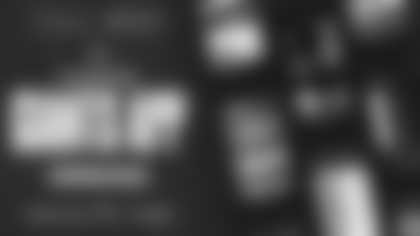
Giants App
Download the Giants' official app for iPhone, iPad and Android devices













